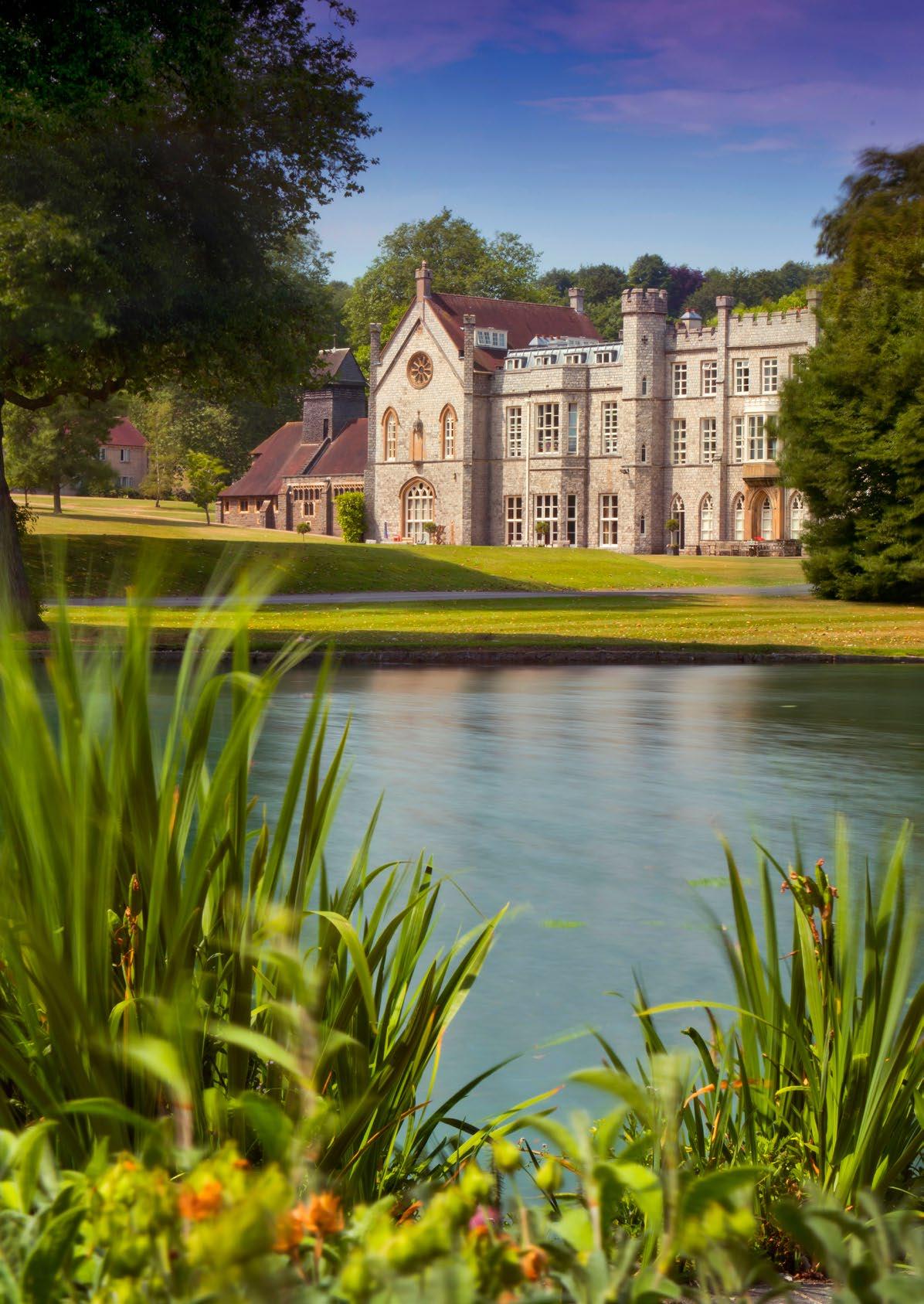2022 Supplement

Ins I de th I s I ssue
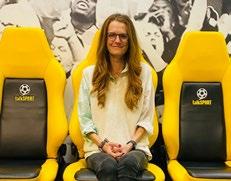
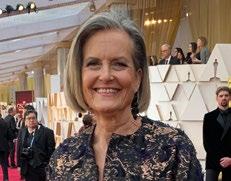
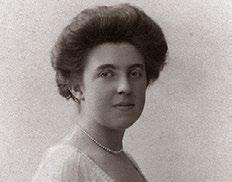
 e lsie Bowerman: Out of this Century
seniors s potlight: deborah Kolar seniors’ Carol service the Interview: Georgie heath
e lsie Bowerman: Out of this Century
seniors s potlight: deborah Kolar seniors’ Carol service the Interview: Georgie heath
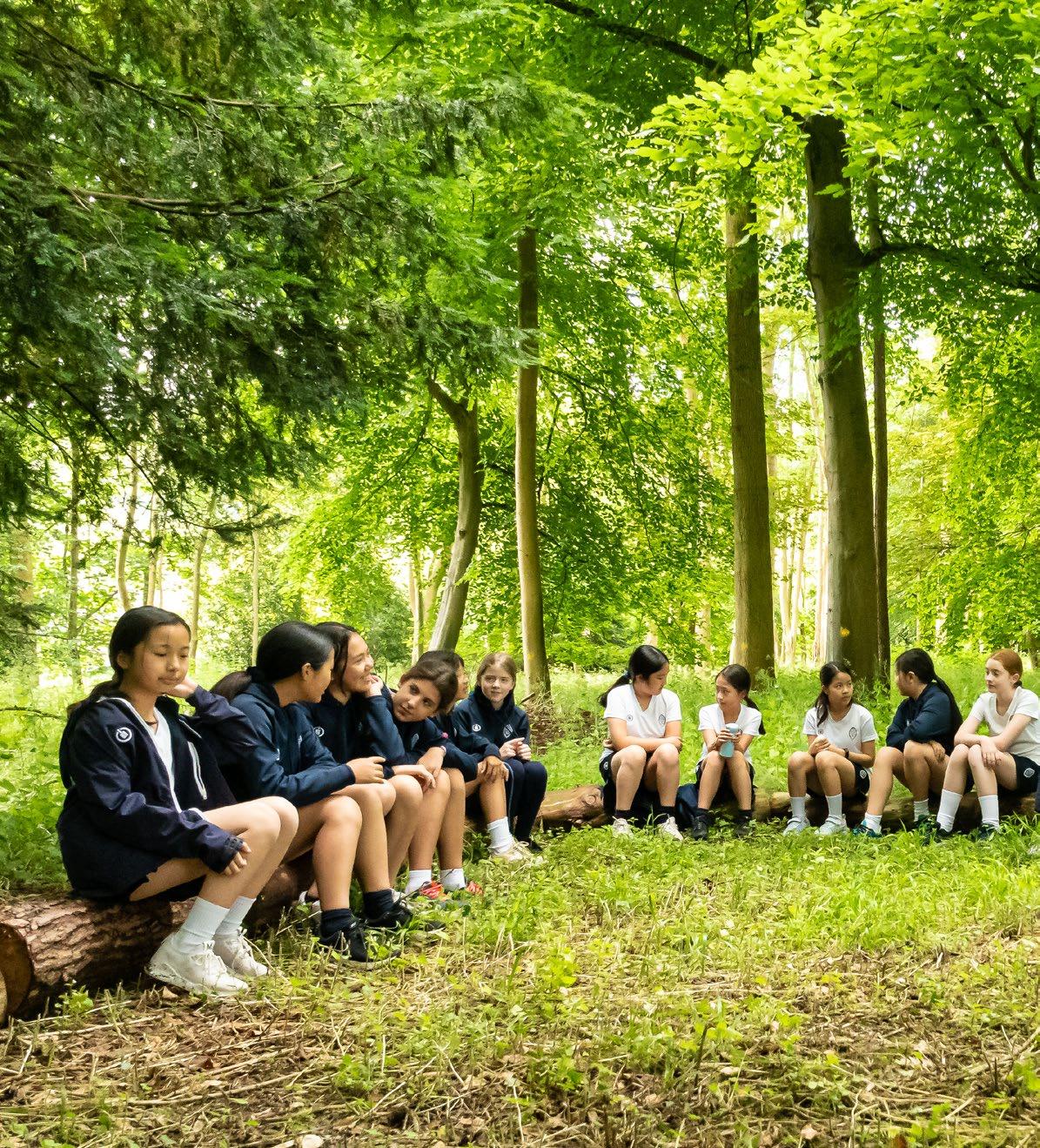
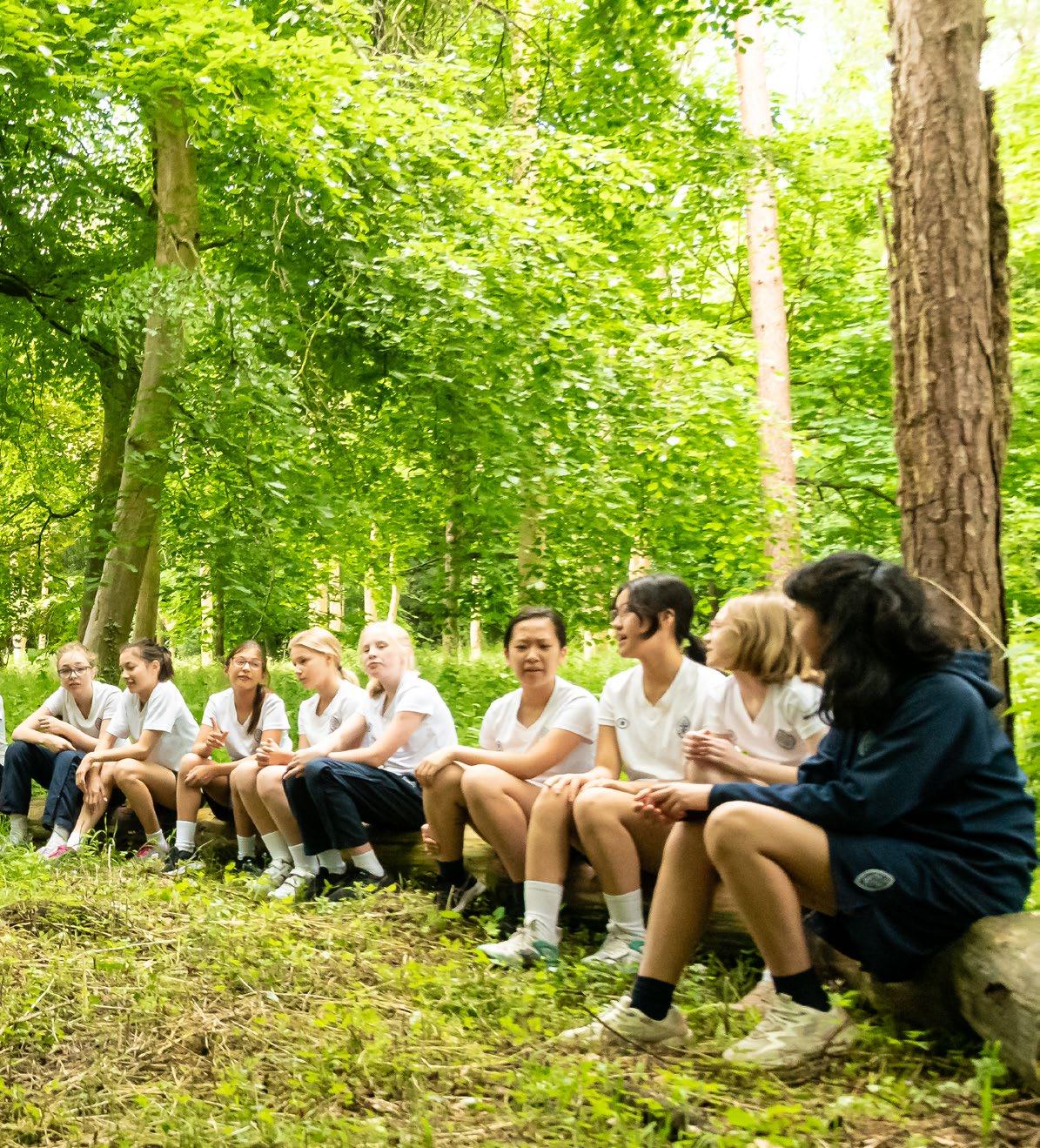





 e lsie Bowerman: Out of this Century
seniors s potlight: deborah Kolar seniors’ Carol service the Interview: Georgie heath
e lsie Bowerman: Out of this Century
seniors s potlight: deborah Kolar seniors’ Carol service the Interview: Georgie heath



It is always a pleasure to meet and spend time with Seniors and former staff. Over the course of the last year I have been fortunate to meet many of you, following the restrictions due to the pandemic.
The 2021/2022 academic year has been a significant one, not least because the whole community came together to celebrate the 125th anniversary of the School’s foundation.
Each term was filled with a range of events and we were fortunate that the girls were back on-site to mark this milestone. Throughout the year, we focused on the vision and aims of Wycombe Abbey’s founder, Dame Frances Dove, and celebrated our rich and illustrious history over 125 years of educating girls.
We started off the Autumn Term with a Colour Run; the whole School took part and participants ran, walked and danced their way around the School’s beautiful grounds while being blasted with powder in every colour of the rainbow. Founder’s Day followed on 23 September, commemorating the School’s founding in 1896. We enjoyed a birthday party in the afternoon with fairground rides and live music and we were pleased to welcome guests from the local community. The Spring and Summer Terms brought wonderful celebrations in the form of a special Anniversary Concert in the Archer Recital Hall and 125 Live!, a journey through our 125 years of history via the media of music, drama and dance. Our 125 Speaker Series ran throughout the year, and we welcomed guests from a range of fields including sport, business, finance and adventure in Sir Matthew Pinsent, Liz Earle MBE, Baroness Helena Morrissey and Ben Fogle. The Seniors’ Making a Difference panel event was enjoyed enormously by the girls in March and a special 125 Seniors’ Day Reunion
involved a fantastic afternoon of talks, tours and tea with friendships reignited and much reminiscing; I thoroughly enjoyed meeting former pupils and staff and hearing their stories. We rounded up the year with Dove Day, marking the end of our celebrations.
Following the publication of the School’s Strategic Direction 2020-2025, we have been working on an Estates Masterplan to outline the improvements we seek to make to the built environment over the next 15-20 years. Phase 1 of the Estates Masterplan includes the construction of a new Junior House and an Innovation and Design Centre (IDC); information about our ambitious plans can be found on our website: www.wycombeabbey.com. I am also delighted that the final stages of the Big School refurbishment are complete and this much-loved space was reopened this term. This is an exciting time for Wycombe Abbey as we continue to look to the future with a clear vision to be a world class school at the forefront of girls’ boarding education.
I hope you enjoy reading this issue of the Seniors’ Supplement which is a wonderful illustration of all that our Seniors’ community has been involved with over the last year.
With best wishes,

Jo duncan MA (st Andrews), PGC e (Cantab) Headmistress
For more from the Headmistress, follow on Twitter and Instagram @WA_Headmistress

the Development and Seniors Office fosters relationships with the s chool’s 4000-strong s eniors and h onorary s eniors network and a wide range of donors, supporters and friends of s chool. We are delighted to bring you news and events which defined the year.
This year started on a positive footing with the completion of an important project funded by a generous gift from The Thompson Family Charitable Trust. Following 18 months of building work, the restoration and refurbishment of Big School drew to a close in autumn 2022 and the new space, capable of hosting all pupils together, was officially opened with a special ceremony, detailed on page 7. Big School is a key space in the heart of the School and reminds us of the connection to our past whilst enabling generations of pupils to gather all together into the future. Thank you to The Thompson Family Charitable Trust for their wonderful support and interest in this project.
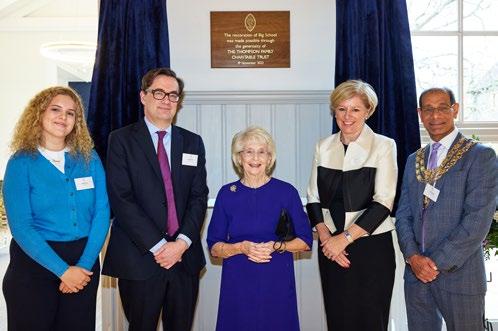
During the course of the last year, School opened a brand-new space, the Chinese Resource Centre housed in the Modern Languages Department. Through this new area and a new Chinese Society, the School can give pupils the opportunity to be immersed in an interactive environment whilst exploring the Chinese language and culture in greater depth. This has been made possible thanks to a generous gift from former parents and we are delighted to see the girls using this space already.
School recently launched the Annual Fund and we continue to expand opportunities for members of the Wycombe Abbey community to support the School. We are thankful, as always, for our supporters’ continued generosity towards Wycombe Abbey as we look towards our new strategic plans. Gifts of all sizes make a significant difference, as the School is not supported by a large endowment. For more information about giving to Wycombe Abbey and our development projects please contact development@wycombeabbey.com or visit development.wycombeabbey.com.
The last year was particularly special as Wycombe Abbey celebrated the 125th anniversary of its foundation, involving a host of special events and activities. Following restrictions due to the pandemic we were delighted to welcome guests back to School again for the Seniors’ Carol Service in December for mince pies and mulled wine and a special Service led by our School Chaplain. Another special event was the ‘Seniors Making a Difference’ panel talk which included Clarissa Ward, Chief International Correspondent for CNN and Charlotte Willis, Award-Winner, TechWomen100 and board member of MedicAlert UK. A highlight at the end of the year came with the 125 Seniors’ Day Grand Reunion in June, a sold-out event with over 200 guests spanning five decades and a special 40th Reunion for the Class of 1982. We were delighted that so many alumnae, former staff and their families returned to share memories and fuse new friendships. Attendees also benefitted from House tours and a behind-the-scenes look at the progress on the Big School project.
 Seniors’ Carol Service 2021
Seniors’ Carol Service 2021
We are delighted that so many Seniors are involved in School-life through university and careers advice and talks, to business mentoring. Over 450 Seniors are now signed up to the Seniors Mentoring Programme, which matches leavers with relevant skills and experience with Seniors and Sixth Form pupils to provide mentoring and advice. If you’d like more information about events and activities run by the Seniors Office, please contact
seniors@wycombeabbey.com and sign up for our regular Seniors newsletter.
Wycombe Abbey Orchestral Concert

thursday 9 February 2023, 7:00pm – 9:00pm st Mary’s Church, Marylebone
s aturday 10 June 2023, 12:00pm – 5:00pm Wycombe Abbey
For more information, visit www.wycombeabbey.com/seniors
On
s aturday 19 november 2022, members of the Wycombe Abbey community gathered to celebrate the re-opening of Big s chool and to thank Mrs Patricia thompson CB e and the thompson Family Charitable trust for their generous donation towards the project.
Mrs Thompson is a Senior (Campbell). In 2018 Mrs Thompson pledged a generous donation to support the renovation of Big School. The project took approximately 18 months to complete.
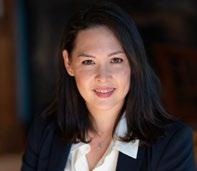
To mark the occasion, Mrs Thompson unveiled a plaque made from wood which was salvaged from the project and restored. Pupils, staff, Seniors, members of the Governing Council and local dignitaries, including the Mayor of High Wycombe, were in attendance. Speeches on the significance of Big School and details of the project came from Mr Peter Warren, (Chair of Council), Hattie, (Head of School), and Mrs Thompson. After a seated lunch, Mr Mark Mackenzie Crooks, (Bursar) led a tour of
the Shelburne Pew, which was carefully restored over a period of several months by specialist carpenters in the Wycombe Abbey Estates team, Mr Colin De’Ath and Mr Kelvin Pearce.
Ms Clare Flynn- s carcelli Director of Development and External Relations Miss Kellyn Caldwell Development OfficerI am delighted to introduce myself as the Chair of the s eniors’ Consultative Committee (sCC), and to welcome the 2022 leavers to the s eniors.
Firstly, I would like to thank Jane Gould, Smith (C127) for stepping in at short notice and chairing the SCC so well over the last year, and for her many years of service on the committee before that.
The SCC works with the Development and Seniors Office and provides a channel of communication between the whole Seniors community and the School. The main aim of the committee is to promote and support the wide variety of activities in which Seniors are involved, from social events to careers forums. Meeting both in School and online, the SCC benefits from a breadth of skills and expertise and seeks to represent Seniors of all ages both here and overseas.
More
Alongside our favourite social and traditional activities such as the Carol Service, there are an increasing number of ways that Seniors are now involved. More than 450 Seniors are registered on the Seniors Mentoring programme offering advice and support to current pupils and alumnae. Others provide internships and work placements here and overseas or talk at careers events such as the Sixth Form Future Ready Week. Over 1,000 of you are registered on the Seniors’ website offering your time and expertise to the benefit of fellow Seniors and current pupils.
Younger alumnae are also becoming more involved as university ambassadors, hosting welcome and social events for new girls at their universities and colleges, or coming to talk at university preparation events held for the LVI. We have also seen an increase in Seniors supporting each other as well as continuing to contribute to the Bursary Fund and capital projects.
A highlight for me this year was the Seniors’ Day Grand Reunion in June when we celebrated the 125th birthday of the School. The marquee was full, the sun shone, and we all enjoyed catching up over a delicious lunch before taking a sneak preview of the renovations to Big School and visiting our old Houses. Thank you to so many of the ‘40 years on’ year group for making it such a memorable occasion. Our thanks also go to Clare and Sally from the Development and Seniors team who organised the event and the School staff and pupils who joined us on the day.
Thank you to everyone who has supported Seniors activities this year by attending events or contributing to this edition of the Seniors’ Supplement. If you would like any more details of current ways to get involved, have ideas as to what we could do in the future or would like to organise a year group event, please don’t hesitate to contact me or one of the Development team at development@wycombeabbey.com.
eniors
If you have not done so, please register on the Seniors’ website wycomeabbeyseniors.com. This will provide you with an easy way to get in touch with fellow Seniors. You can also use the website to find out what we have planned for the year ahead, and to indicate whether you would like to get involved with any of the events or initiatives.
Through the Seniors’ community I hope that we will carry on supporting our fellow Seniors, current girls and charitable endeavours just as the first leavers did, and continue to be proud of this School, each other, and our education.
Mrs Felicity Conway ( h arris, Class of 1986, Wendover, C160) Chair of the Seniors’ Consultative Committee

Chair:
Felicity
Committee Members:
• Caroline Ames (Buttle, Class of 1979, Barry, C141)
• Tracy Bjelland (Class of 2004, Campbell, C235)
• Sue Cameron (Class of 1961, Barry, C100)
• Elizabeth Duignan (Player, Class of 1989, Campbell, C169)
• Jane Gould Smith (Morris, Class of 1974, Butler, C127)
• Caroline Griffiths (Newman, Class of 1974, Airlie, C127)
• Sue Jenkins (Honorary Senior, Shelburne Housemistress)

• Clare Middleton (Campbell Golding, Class of 1988, Barry, C166)
• Katrin Roskelly (Turner, Class of 1982, Pitt, C151)
• Susannah Saary (Class of 1989, Butler, C170)
• Azura Safiyuddeen (Class of 2003, Campbell, C233)
Our Ambassadors take on the role of welcoming recent School leavers as they arrive as university freshers and connect Seniors in all other year groups at university/college by organising occasional gatherings throughout the year. If you are interested in becoming a University Ambassador, or would like to be put in touch with other Wycombe Abbey Seniors at your university or college, please email seniors@wycombeabbey.com.
Current Ambassadors:
• University of Oxford: Mia Cameron (Class of 2019, Butler, C322)
• University of Cambridge: Francesca Rix (Class of 2019, Campbell, C323)
• Durham University: Eleanor Krefting (Class of 2020, Campbell, C332) and Izzy Evett (Class of 2019, Campbell, C323)
• University of St Andrews: Isabella Rees-Evans (Class of 2019, Wendover, C328)
Conway (Harris, Class of 1986, Wendover, C160)

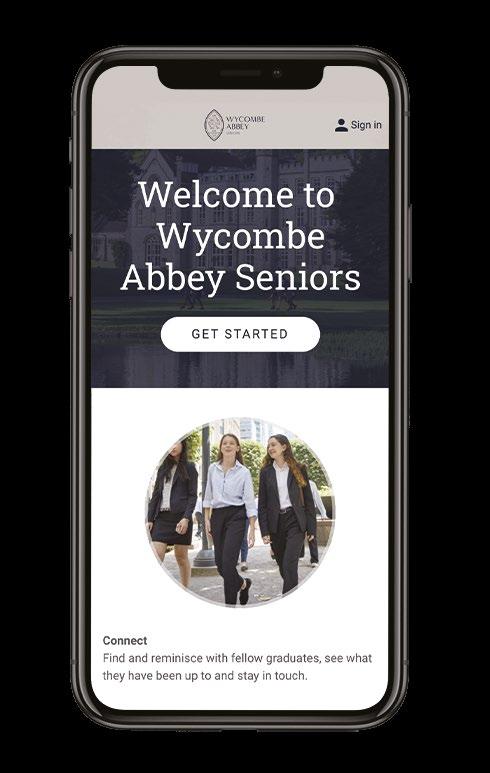

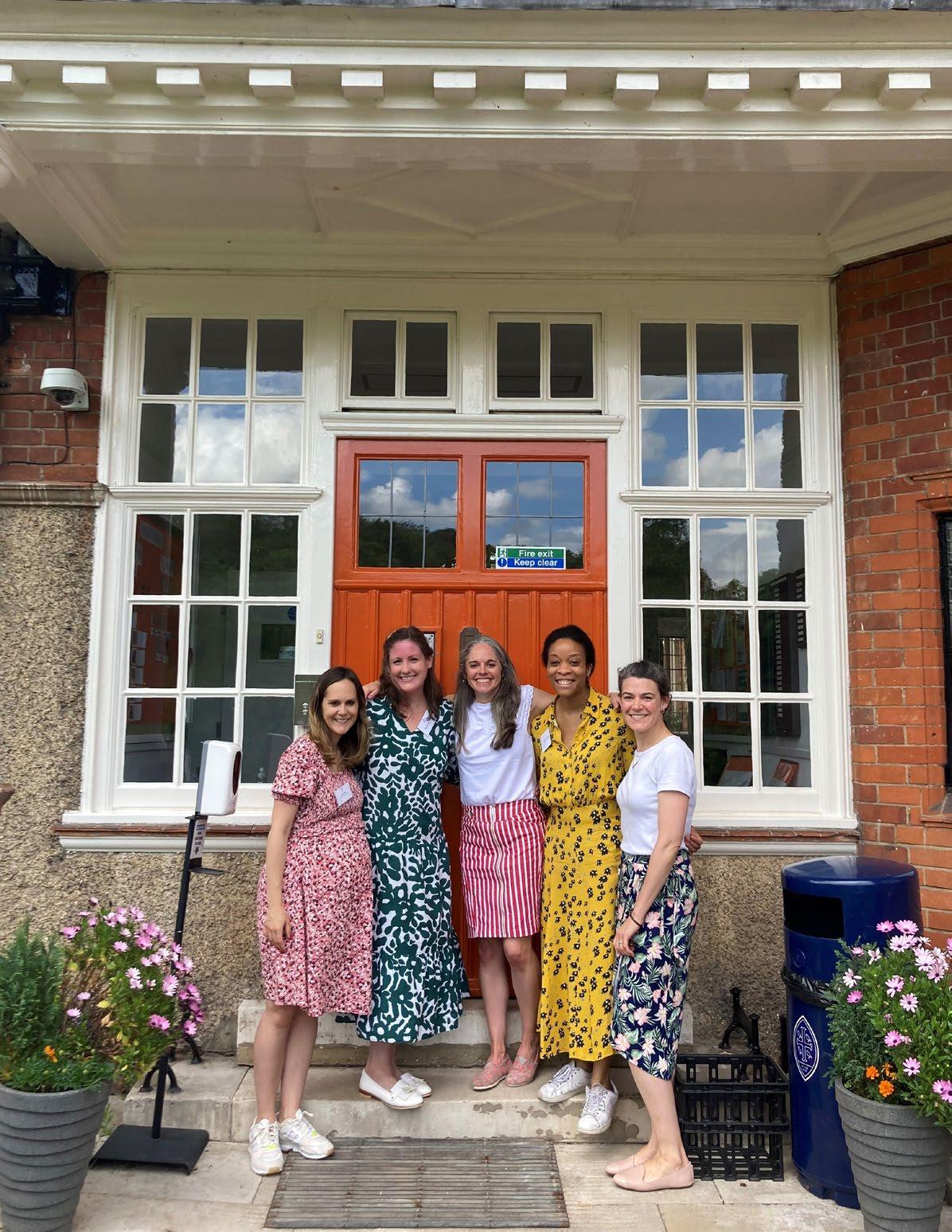
“
h aving not been back for 23 years, it was certainly a trip back down memory lane, all with a warm nostalgic feeling!”
Ona sunny day in June, we were delighted to welcome nearly 200 Seniors and Honorary Seniors to the 125 Seniors’ Day Grand Reunion.
After a delicious lunch accompanied by much laughter and conversation, we heard from Fizz Conway (Harris, Class of 1986, Wendover, C160), Chair of the Seniors’ Consultative Committee, and the Headmistress, followed by a beautiful violin recital by Iris (LVI). This was followed by tours of the Houses, with many remarking on the changes to the site.
Guests were also able to have a look at the restoration of Big School before enjoying afternoon tea in the sunshine. We were also pleased to host a group of Seniors from the Class of 1982 for their 40-year reunion.

One of the guests remarked, “Having not been back for 23 years, it was certainly a trip back down memory lane, all with a warm nostalgic feeling! Great to see friends, past teachers and also to meet new faces, and served with a delicious lunch and tea.”

At the end of the s pring term, we invited pupils, parents, s eniors and staff to attend the 125 s eniors Making a difference panel talk as part of our 125th anniversary celebrations. For this special talk, we were delighted to hear from Wycombe Abbey alumnae about how they have overcome challenges and are making a difference throughout their professional and personal lives.
The panel consisted of Clarissa Ward (Class of 1998, Pitt, C206), Chief International Correspondent for CNN; Sophie Daud (Class of 2009, Cloister, C266), CEO of Future Leaders Network; Charlotte Willis (Class of 1996, Pitt, C202), board member at Medic Alert UK; and Alice Loxton (Class of 2014, Pitt, C293), presenter and content creator at History Hit.
The Seniors spoke about their achievements and challenges following their time at Wycombe Abbey and reminisced about their fondest memories, friendships and shared experiences from their time at School. The audience also had the chance to ask questions. These centred around how they entered their field, their experiences in their various workplaces as well as their achievements.
As much as we would have liked to have had all four at School, Alice and Charlotte joined us in person in the Lancaster Arts Centre, while Sophie and Clarissa joined us via Zoom – a truly hybrid event.
A huge thank you to the Seniors who volunteered their time to be on the panel; pupils were inspired by what they heard.

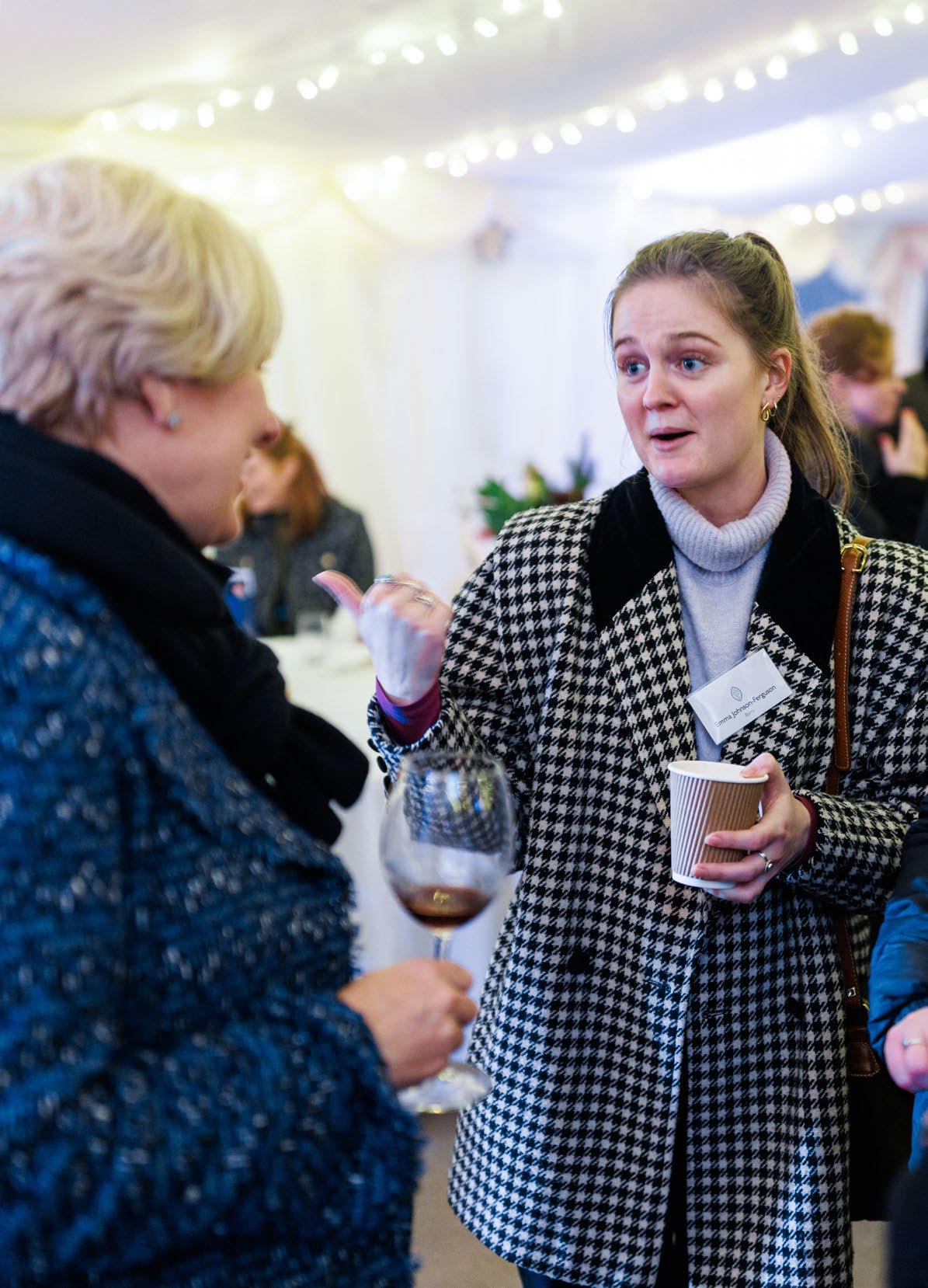





thes
Over 100 Seniors, Honorary Seniors and their families returned to the School for the festivities, which began as ever with the annual Seniors vs Wycombe Abbey 1st Team Lacrosse Match. With many enthusiastic spectators on the sidelines, we are pleased to report that the Seniors’ team won the match. Many thanks to all the players and in particular to Captain Alice Bush (Class of 2010, Campbell, C272).
Following the match, an outdoor Christmas market provided the opportunity for Seniors to catch up with friends over warm food and mulled wine as well as purchase Christmas gifts from the School shop and other stalls before heading into Chapel for the much-anticipated Carol Service. Thank you to members of the SCC who helped host the event.
 chool was pleased to welcome guests to the l acrosse Match and Carol s ervice in december 2021.
chool was pleased to welcome guests to the l acrosse Match and Carol s ervice in december 2021.
With many enthusiastic spectators on the side lines, we are pleased to report that the seniors’ team won the match.
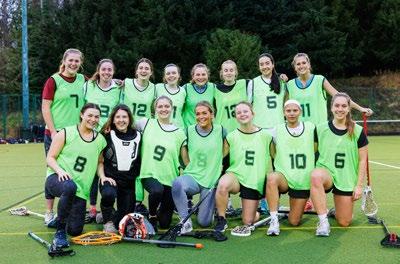

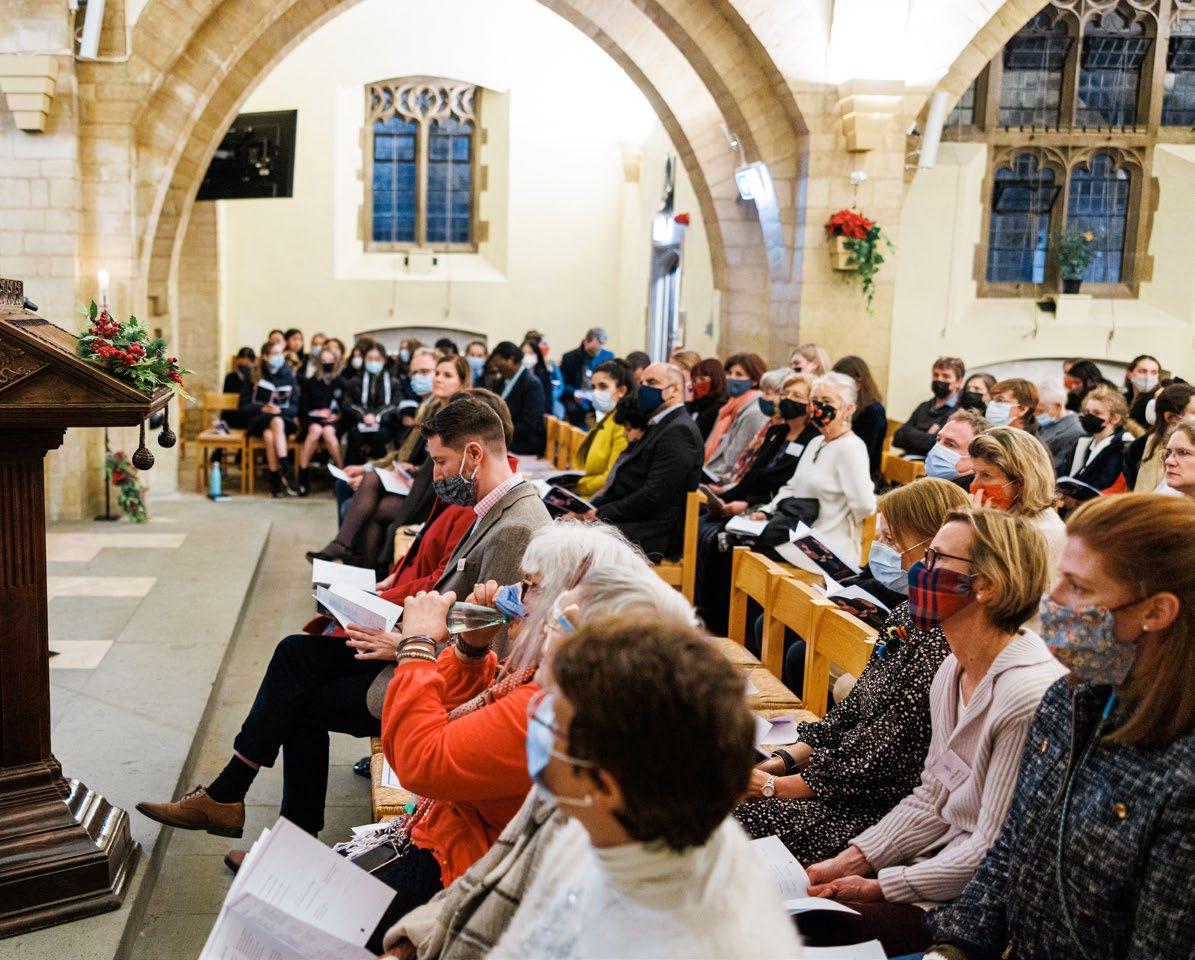

the 2021/2022 academic year was one of celebration for Wycombe Abbey as the s chool marked the 125th anniversary of its founding by d ame Frances dove in 1896. It started with Founder’s d ay – a Wycombe Abbey ‘birthday party,’ on 23 September 2021. It was a joyful, fun-filled day and one I am sure the girls will remember for many years to come.

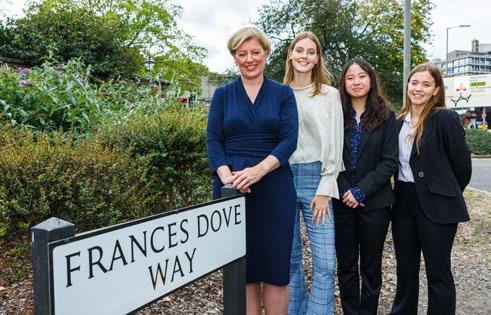


The day began with the unveiling of a plaque commemorating Dame Frances Dove, the School’s founding Headmistress. We were joined by a number of special guests including Councillor Sarfaraz Raja, Mr William Reid of the High Wycombe Society and members of staff from Cressex Community School and Godstowe Preparatory School, both of whom have strong links with Wycombe Abbey. I hope that those who glance at the plaque as they pass through the main gates of the School will be reminded of the work of Dame Frances and will acknowledge her visionary approach to girls’ education. I was thrilled that the road name officially changed just in time for Founder’s Day from Abbey Way to Frances Dove Way, yet another wonderful way to recognise Dame Frances.
The Bishop of Buckingham, Rt Revd Dr Alan Wilson, was able to join us on Founder’s Day and he led two beautifully poignant services in the Chapel for Wycombe Abbey pupils and staff. After a tumultuous 18 months, it was wonderful to see the girls gather in person to celebrate this particularly special day.
The sun shone as the School community gathered in front of the Abbey for the birthday party organised by Ms Bowen and the 125 team. A fantastic cake baked in the shape of the main Abbey building took centre stage and pupils and staff gathered together to sing Happy Birthday. The girls enjoyed the live band and fairground rides and there were 125 cupcakes, candyfloss and ice cream. On a reflective note, 125 years ago, Wycombe Abbey opened its gates with only 40 girls starting in the Autumn Term of 1896. While the main building of Wycombe Abbey has changed remarkably little, the School has developed significantly over the years and we now have nearly 660 pupils; 592 boarders and 65 day boarders.
Founder’s Day was a special day to reflect with gratitude on the School’s past, and to look ahead with determination to continue our founder’s mission. Our vision remains clear: to be at the forefront of girls’ boarding education and to be recognised globally as a world class school.
Mrs Jo duncan HeadmistressPlease provide some details about your career path.
I haven’t gone about things the normal way. When I left my last ever English lesson at Wycombe, I chucked away everything – so I think that confirms that writing wasn’t always my passion.
At university, I did a sports show on student radio and during the summers worked as a runner for Sky Sports and I knew that it was a world I wanted to be in. I spent some time out of work as I battled my mental health before undertaking a Journalism diploma. From there, I won a national cricket writers’ competition and had the opportunity to report at the Cricket World Cup Final at Lord’s in 2019. When the Covid pandemic hit, I found a lot of time was spent twiddling my thumbs in search of work. But through social media, doing as many hard yards as I can, doing work experience, podcasting and generally getting myself out there, freelance life has grown and my
Georgie h eath attended Wycombe Abbey from 2006 to 2013 in s helburne then Clarence, before going to Australia for a gap year within a week of finishing her A levels. She then spent three years studying Psychology at the u niversity of Bristol. Georgie is a freelance sports journalist and commentator, a # he RGAM etOO champion and founder of the Women’s Cricket Chat podcast. Georgie has worked with broadcasters including s ky, BBC, talk s PORt, t imes Radio, e ngland l acrosse, team e ngland Commonwealth Games and ICC at Cricket World Cup, covering all sports, but specialising in cricket.
career path has escalated. I am now freelancing while still commentating, reporting and creating content for my own podcast. Next year there are some work opportunities in South Africa, Hong Kong and potentially the USA, which I am excited about – although I probably need to check my passport is in date!
started from absolutely nothing and gone on to now interviewing big names from the world of international women’s cricket, and sharing those stories, gives me such pleasure. We are now looking for a sponsor/partner to help us grow and keep this momentum so if anyone is interested, you know where I am!
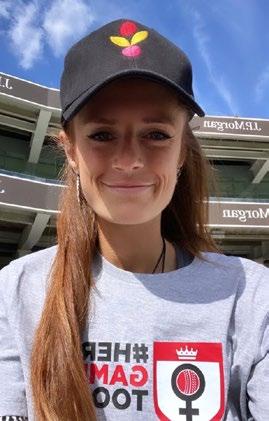
From what have you derived most pleasure in your personal/ professional life?
I am still chasing the big dreams but seeing my name on the back page of the Sunday Telegraph this year was pretty amazing this year. Commentating, reporting and presenting on the ground-breaking Fairbreak Cricket tournament this year was also incredible. Other than that, I am so proud of everything we do on Women’s Cricket Chat which is a podcast I host that covers stories from different people around the world in women’s cricket. To have
I’m very proud to be advocating for women in sports and helping to break down those stigmas associated with it. I was asked to be a champion of an organisation called Her Game Too which is all about breaking down barriers for women in cricket and making it an inclusive place for all. To be asked to take this on was a huge honour and proved to me that I am making some kind of mark in my role and hopefully inspiring girls to get involved in sport.
Oh, and winning Pointless Celebrities – cricket edition has to be up there too! (Check it out on iPlayer!)

“I’m very proud to be advocating for women in sports and helping to break down those stigmas associated with it”
Is there something from your career which you feel reflects your personal values and what you wanted to achieve in life?

I do not look to chase a click-bait story. I’m not about that. I feel it is far more important to get a real, personal story from someone, or about someone, in a feature. I like to think my way of going about things and being personable with subjects makes my journalism much more ‘me’ and much more ‘from the heart.’ As a person, I have never been that good at glitz and would much rather get something ‘from the heart’.
What does success mean to you?
Luckily, I don’t believe it is about what you have (which is a relief because if you’re looking for a job that allows you to ‘splash the cash’ then journalism probably isn’t the one!). It is about finding something you love and being able to look back and realise that you are moving forward and producing something you can be proud of. There are days I sit and think “Am I actually doing anything?”
and then I see my name on a screen or in print or announced on the radio and I think “Yes, I am where I should be, now just keep plugging away.” Success is a many-faceted monster – I say monster because often people get carried away with focusing on the big successes without taking the time to take stock and enjoy things. Success might be one day appearing on the BBC and the next changing the fuse in a plug without having to ask Google!
What role did your s chool education play in preparing you for your future?
I think I learned how to juggle (not literally, sadly!), doing as much as I can all at once. Having so many opportunities at School prepared me for life and how much can get thrown at you all at once. But School meant I could do as many activities as I wanted and balance my time so as not to have to cut things out. Now, that helps me prioritise and compartmentalise when it gets a bit much. I think something that really helped was being in dorms of mixed ages. The dorm life prepared me for sharing rooms with others at events,
despite having just met them, and the age difference helped create a family quickly, which is something that is important when working away with a small group of people of varied ages.

What were your passions and interests at Wycombe Abbey?
Unsurprisingly, sport came top. I think I spent about 80% of my time at Wycombe in the Davies Sports Centre or out on the pitches/courts. But I also took part in jazz band, Drama, and whatever was going, really. Not forgetting the Christmas cake-making in Lower Fifth.
Where have your sources of inspiration come from in your life?
Mumma Heath. For anyone who knows her, it is obvious why. She is one of those that would appear at a lacrosse match armed with two Rhodesian ridgebacks, homemade brownies and warm glazed sausages! She has been there through some really tough times for me since I left School. I was admitted into an eating hospital after university and without
her, I would have found things even tougher. She deserves all the plaudits I can give. I still phone her every day and she will always be my biggest cheerleader.
Would you say there are linking values and ethos among Wycombe Abbey alumnae?
There is a special link between Wycombe Seniors. We might not get to see each other as much as we like, but I think when you have had seven years living on top of each other, you share a bond no matter how much time you spend apart. The friends I made at Wycombe are a loyal bunch, with an incredible work ethic, and a genuine desire to go out and make something of every situation. I love meeting up with anyone from School.
Would you encourage young women to consider working in sports journalism?

It is notoriously a male-dominated field, but that is changing and I love to see it. It is important to emphasise that women don’t just have to write and talk about women’s sport too – we belong in all those press boxes. It should be the quality of your journalism that defines you in your job, not your gender. We have seen the amazing rise of women’s sport and the coverage around it so why can’t we see the same boom in women’s journalism? I’m so here for that.
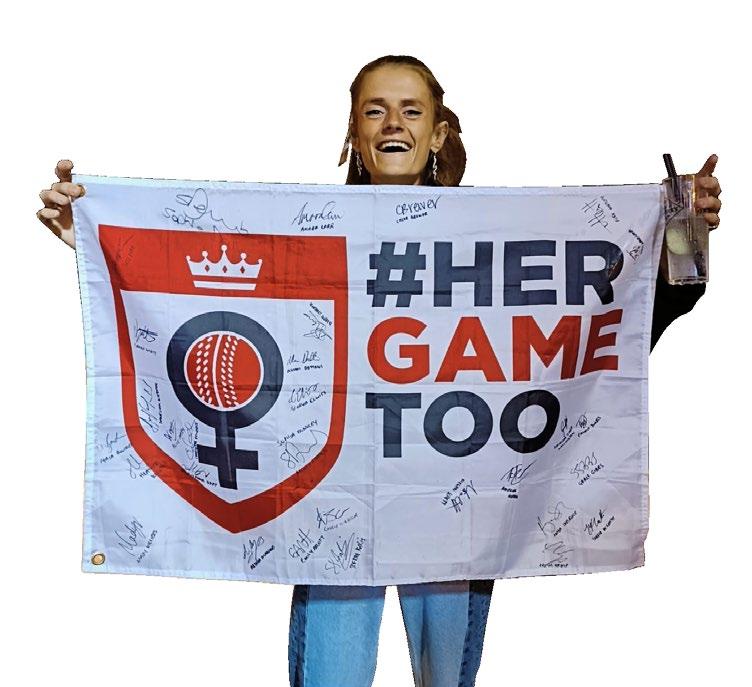
What advice would you give your younger self?
The lunch run is dangerous. Make sure your shoelaces are tied. Appreciate the small things and focus on the people who were there for you in the tough times and not just the good. Be open about your feelings. I have had a lot of struggles with my mental
much they mean to you.
Laugh often and do not take yourself too seriously. Pet all the dogs. A dog not cuddled is a missed opportunity. You will probably never figure out a real-life use for algebra or trigonometry.
lI n Ks: twitter: @georgieheath27 and @WCricketChat Instagram: @georgieheath27 Women’s Cricket Chat on s potify/ youtube



It’s hard to believe a year has passed since leaving Wycombe! I enjoyed a relaxing summer with family and friends, spending two weeks in the Brecon Beacons. I had been planning to take a gap year but, when my volunteering plans fell through due to Covid, I decided to go straight to university. the past nine months studying n atural s ciences at Cambridge have been all I could have wished for!
the start of the year saw me join my college choir. Since then, I have sung in more than 50 Evensongs and have got to know several people I would have had no co nnection with otherwise. Unfortunately, we don’t belt out Jerusalem in quite the Wycombe style, although hearing the hymn is enough to bring back many happy memories.
I am grateful to School for always encouraging me to try new things. Not long after joining I picked up Eton Fives, a sport I’d not heard of before university. The game is a little like squash without a racket, hitting the ball with your (gloved) hands instead. In March, I was fortunate to compete in the varsity match against the University of Oxford.
So much has changed in a short time: strangers have become good friends, I’ve left behind the more rigid structure of a school timetable, and I’ve lived in a new city. It’s thanks to Wycombe that I have been in a good position to cope with these and many other challenges, and to make the most of the opportunities that come my way.
Sarah Dauris (Class of 2021, Wendover, C346) Head of School 2020/2021
t he past nine months studying n atural s ciences at Cambridge have been all I could have wished for!
during your time at s chool, did you know what you wanted to do as a career?
I started at Wycombe Abbey in September 1984 and I think I pretty much knew what I wanted to do as a career when I joined, aged 11. My parents chose Wycombe because they wanted me to go to a school where my tendency to hit the middle of the class and sail gently through would mean I might actually get some good grades. As a mother, I applaud their astute judgement, and their faith was well placed. I wanted to do medicine and I never wavered from that plan, even when the Careers computer claimed that I’d make a good prison warden!
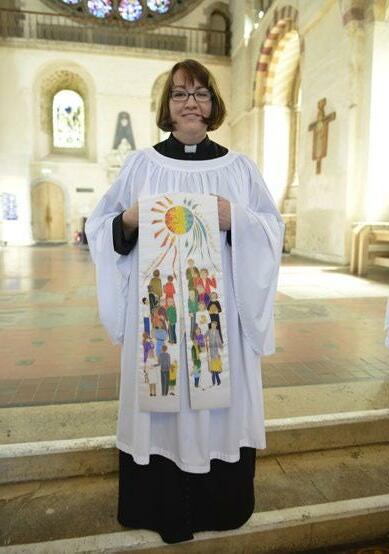
I grew up in a family where faith was important and we attended church weekly at home, so Chapel was a familiar thing, singing a family affair, and faith something that I was drawn to. My calling to medicine was wrapped up in my call to faith and I was confirmed in 1985. I loved the daily services and getting up early for Communion on a Sunday morning. I
joined the Christian Union and sealed my fate as one of the ‘God Squad’, not a trendy thing then, if ever! I loved singing, but then as now, my pitch needed assistance, and Sub-Choir Auditions were an unaccompanied verse of “Dear Lord and Father of mankind”. It’s a testing interval and, in my nerves, I pitched it wrong and, humiliated, never came back.
What were your passions and interests at Wycombe Abbey?
Speech and Drama, LAMDA Awards, and acting in House plays and School productions were highlights. I remember being in the chorus of Follow that Girl, and a great House rendition of Roald Dahl’s Snow White where I played the Wicked Queen complete with our Shelburne Housemistress’ Scottish accent. The Sixth Form play was Ben Jonson’s The Alchemist and I played Surly; great memories, with lines in Spanish and a lot of bandaging my chest flat to play a great male character.
My time at Wycombe wasn’t all sunshine; I had boarded for 3 years
before I arrived, but secondary school is different from a small prep school and I was quite homesick. My great UIV friend, Amanda, and I plotted our running away on many a wander down Daws Hill. Returning years later, I hiked the hill with fonder memories. I was a bookworm and marched my way through much of the Junior Library catalogue on the twice-daily round trips up the Hill.
Please give us a brief outline of your career and how this led to your current appointment.
Ambition hits people at different ages and stages, and my parents were right to aim high. I got my necessary 3Bs and I headed to Charing Cross & Westminster Medical School in 1991. While there, I met and married my husband, Gary, taking a year out mid-studies to explore his home, Zimbabwe. Finally, having someone to aim high for, I graduated with Honours in Medicine and started what was a 20-year career.
I loved working as a doctor, initially doing House Jobs in London then
heading to Harlow, Essex for an SHO rotation in Medicine, before being side-tracked into palliative care by a fantastic post at St Francis Hospice, near Romford. I worked in a number of hospitals and hospices around Essex and Hertfordshire, wandered into general practice for specialty training and then back to palliative care. I spent ten fantastic years teaching clinical students on the Palliative Care Strand at the University of Cambridge, with a particular interest in trying to teach the essential, but difficult to measure, skills of empathy and self-care to doctors in training. End-of-Life care sits on the edge of medicine and involves a particular focus on the holistic care of patients and their families; dealing with physical, emotional and spiritual pain, walking with people in dark times and holding onto hope.
Gary and I had already been blessed with two daughters when we faced our darkest time. Our third daughter, Grace, was stillborn at 19 weeks and our world was shaken by her loss. In the midst of it, I heard God’s call to a new path, a new career that I had never expected: a vocation to the Priesthood.

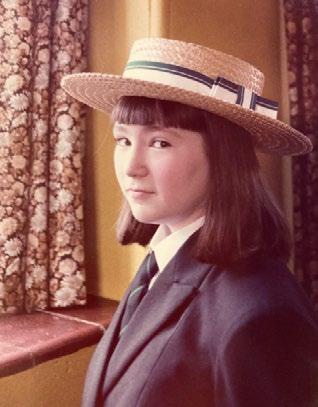
The End of Term Service at Wycombe always had the reading from Philippians 4:8:
“Finally, brethren, whatsoever things are true, whatsoever things are honest, whatsoever things are just, whatsoever things are pure, whatsoever things are lovely, whatsoever things are of good report; if there be any virtue, and if there be any praise, think on these things.”
Following God’s call was part of my vocation to medicine and I knew what it meant to follow your vocation on a
daily basis, but there weren’t any ‘jobs for the girls’ in the Church when I was looking at careers. I wonder what Miss Lancaster would have said about the idea of women priests? Somehow, I suspect she’d be thrilled that her assertion that her girls could be whatever they wanted to be was correct, even in those places where male headship claims a theological basis.
So, I set out on the journey of exploring my vocation with the Church of England and was accepted for training in 2014. I worked and trained part time with the Eastern Region Ministry Course, leaving medicine in 2017, when I was ordained a Deacon. I served my curacy at Holy Trinity, Bishop’s Stortford, before becoming the Priest in Charge at Great Amwell with St Margarets and Stanstead Abbots, on the edge of Hertfordshire, a benefice of three churches between Harlow, Hertford and Hoddesdon.
From what have you taken most pleasure during your career?
Being a priest is a strange and all encompassing role. The obvious things, Sunday services, weddings, baptisms and funerals, but I’m also an ex officio Governor at our two Church primary schools, sit on the two Parochial Church Councils plus a number of local committees from Parish Hall to Almshouses. I am a Trustee at the Night Shelter in Bishop’s Stortford, and work with the local foodbank, running a local Community Hub to support those in need. And there’s a quiet element, of prayer and blessing, and walking alongside people in good and bad times. Reflective practice, but now focused on looking for signs of God in a world where He’s not easily recognised by people; where folk are
out of practice in the art of counting their blessings and seeing God’s handprints in the clay of their lives.
What would you say to girls setting out today?
My girls are 18 and 14, and my little man is 6. I suppose I would say what I have said to them: listen for the deep call on your life. Search it out… what excites you, what draws you? Don’t expect to have a 5-year plan, mostly I don’t know what tomorrow will bring, so enjoy the journey! You can’t have it all, there’s always a compromise, so choose wisely and be prepared to change course. Life is a big adventure, and one of the greatest privileges is to hold the map for other people.
the art collector and socialite Peggy Guggenheim once described herself as being ‘out of this century’, this century being – of course – the twentieth. e lsie Bowerman was of quite a different upbringing and temperament, and although she would not have had the inclination to claim such a label for herself, she is certainly equally, if not more, entitled to it. Indeed, surviving the Titanic , nursing in World War I, and watching the Russian Revolution unfurl, dovetail as a contents page in a history textbook and as episodes in Elsie’s life. While at first her string of accolades and the places she found herself might draw from us cries of ‘What are the chances?’, ‘ how could this all happen to one person?’, a delve further into e lsie’s upbringing and her time at Wycombe reveal a logic in the intertwinement of e lsie’s life with that of the 20th century.
Born in 1889, Elsie was her parents’ only child. She lost her father at a young age and was, from then, brought up by her mother, who was ambitious for her daughter and decided to send her to the school recently established by Frances Dove – our very own Wycombe Abbey. Elsie left Cloister House in 1907 to study Modern Languages at Girton College, Cambridge, where other Wycombe and St Leonard’s girls had paved the way before her. It is in these early years after leaving school that Elsie’s life began to connect with events of a global scale: the Titanic, World War 1, and the Russian Revolution. Elsie’s own documentation of the Titanic tragedy in her (unpublished) memoir Reflections on a Square is brief, describing chiefly the “kindness and hospitality” she and her mother received on their arrival in New York. Her account of the Eastern Front, where she worked as a nurse and mess orderly from 1916 to 1917, is much longer. In a substantial diary, Elsie records her experience with the Russo-Serbian Unit of the Scottish Women’s Hospitals, caring for injured soldiers amid extensive mud and
working long hours only to be met with nights sleeping in a tent.
While Elsie was an observer and participant in some of the 20th century’s early defining moments, she was also a sculptor of some of its major themes. At Cambridge, Elsie became actively involved in the ‘Votes for Women’ campaign, ultimately becoming the election agent for Christabel Pankhurst, who stood in the 1918 general election after the extension of the franchise. Pankhurst lost narrowly – by 775 votes – to the Labour Party candidate and trade unionist John Davison. Elsie’s depth of engagement with women’s suffrage led her to train in law, as she intended to equip herself with an understanding of the legal frameworks that limited women’s freedoms. Elsie joined the Middle Temple in 1921 (aged 32 and just two years after women were given access to legal training); she was called to the Bar in 1924. Her early appearances at court made headlines, marking inaugural appearances of a female barrister and commenting on her evident flair. Elsie’s skill was such that barristers Graham Grapnell, W.
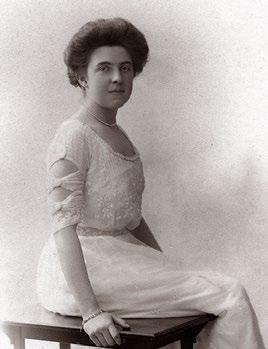
Maitland Walker and Lionel Charles wrote to her following an appearance on the prosecution bench of a libel trial, to note that she had ‘acquired such command of legal principles as will in due time make her respected and feared at the Bar and induce others (including men) to learn from her and treat her word as law.’ Elsie validated their observations in her subsequent twenty-year career as a lawyer. One of Elsie’s notable legal achievements that holds great relevance for all in education is her book The Law of Child Protection (1933), which gave readers in a post-Victorian world an accessible chronicle of adults’ responsibilities over children, the age and conditions in which young people could work, the nuts and bolts of adoption, and the chequered history of child protection to date.
Later in life, Elsie combined her legal experience with her commitment to women’s rights in her role as Secretary to the Commission on the Status of Women at the UN, which she undertook for a year in 1947.
.
Her recommendations to the Commission at the end of her term were for integration with the Human Rights Commission, which was an executive body (which the Commission on the Status of Women was not) that could produce policies rather than solely recommendations. She also called for more women to be represented in all commissions. At a similar time but closer to home, Elsie established the Women’s Guild of Empire, a body which worked with local communities around the United Kingdom to improve the lives of women working in the home and elsewhere. The Guild produced a monthly journal detailing the progress of its various projects and reached 400,000 members. She frequently sought opportunities to bring women together and spoke of her desire to create a parallel of the Wycombe Abbey Seniors’ network that could be open to all.

Elsie had a somewhat gravitational pull towards moments of significance, and I
e lsie joined the Middle temple in 1921 (aged 32 and just two years after women were given access to legal training); she was called to the Bar in 1924.

would argue that it was Elsie’s upbringing and her education at Wycombe Abbey that set her compass towards the political and social issues of the day. Elsie’s father came from a strongly Methodist background (her grandfather had actually died on his way to see John Wesley) and, working in local government, embodied the political engagement of the 19th century non-Conformists. Her mother was an evangelical Christian and a Conservative, who was equally alive to the issues of the time, and would regularly debate with Elsie’s father, himself a Liberal. The Boer Wars and the social work of the local church were chief among the topics around the Bowerman dinner table. The vitality of social and political engagement was further instilled by Elsie’s time at Wycombe Abbey.
During her first night in Cloister, Elsie was introduced to the routine of gathering to listen to Miss Whitelaw read the day’s newspaper; as Elsie recollects in her memoir, “this evening reading became the crucial moment of each day”. The Cloister girls would debate the articles, using their green scarves to signal their responses to the questions of Irish Home Rule. They would have, in fact, been partaking in two forms of political engagement
at once, as while they listened and responded, they were also sewing the ‘Mission work’ garments that would have been sent to the United Girls Schools Mission, also known as the Peckham Settlement. The Settlement provided welfare support to families living in poverty in South London. It was supported by Wycombe Abbey from its foundation and championed by Elsie for the rest of her life. Frances Dove’s emphasis to her pupils on serving the wider community and cultivating a sense of individual responsibility was certainly not lost on Elsie. Indeed, the unity of the two women’s outlooks was demonstrated in one of both of their lasting legacies, the joint founding of the DoveBowerman Trust to fund bursaries for pupils to Wycombe.
Elsie’s life was certainly out of the 20th century, but her abiding approach, which led her to partake in so many of its major events, grew from the fervent social responsibility that developed in the 19th – a wellspring from which Frances Dove herself also hailed.
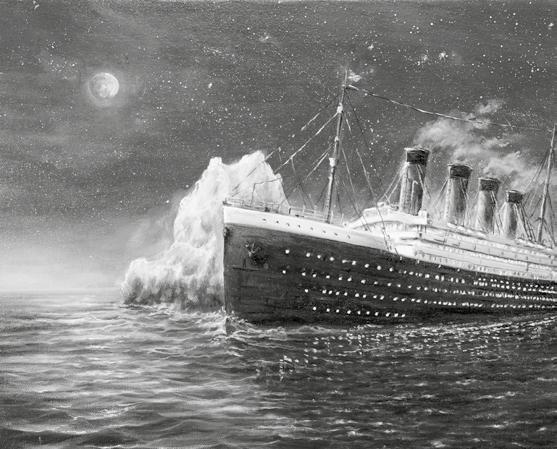 Ms Fania Weatherby Teacher of History of Art and Assistant Librarian
Ms Fania Weatherby Teacher of History of Art and Assistant Librarian
I had the great pleasure and privilege of being invited back to Wycombe in August 2022 as an actor.
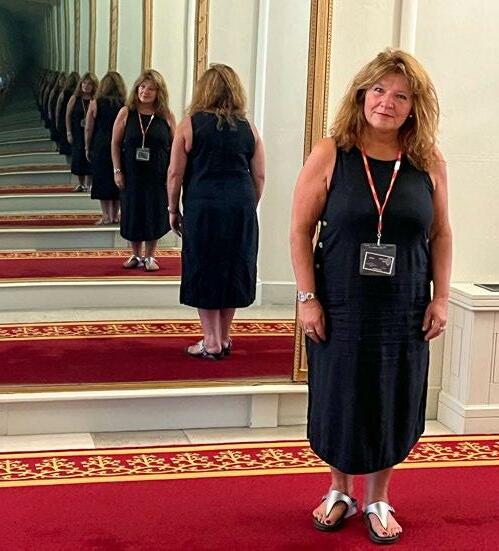
Yes, I am still an actor – very much jobbing, very much augmenting my acting income with a ‘career portfolio’ which includes research work, corporate training and interviewing people on a variety of topics.
Oh, and I was appointed as a magistrate eight years ago –and now sit in both criminal and family jurisdictions. That may come as a shock to those of you who remember me well. It was certainly a shock to Amanda Gibbon (Owen, Class of 1982, Cloister, C149) when we bumped into each other at a magistrate training event a few years ago. We nipped out on our lunch break and had a lovely catch-up – where we concluded that the magistracy was not a destination anyone would have predicted for me, given my conduct at school and university! Not that my conduct was criminal, of course – nor harmful to others, nor even intrinsically evil – just high spirited and mischievous. My main priority was always theatre – sometimes at the expense of higher virtues such as Academic Application or Setting a Good Example.
Which brings me neatly back to the matter of my return as an actor to Wycombe as part of an emergency response training exercise, run by a company I often work with called CrisisCast. They use actors to provide a ‘stress test’ for organisations – to put them through the lived experience of handling an emergency in order to examine their processes, procedures and participants’ emotional responses in a crisis.
The Chatham House Rule prevents me from going into too much detail about what we did with the Emergency Response Team at Wycombe – though rest assured their processes and procedures were flawless, and the staff were wholeheartedly engaged and proactive in managing all the challenges we threw at them. I’m going to focus more on the emotional side of things – as this was my brief as an actor, to throw emotional challenges at the staff.
One of the characters I played was the mother of two girls at Wycombe – one of whom had been involved in the ‘emergency’ – who turns up at the School unexpectedly. When we were planning the exercise, we decided it would add an extra emotional layer for my character to be a Senior herself – who still thinks of Wycombe as the alma mater to whom she can turn for guidance and emotional support in her time of need. The staff in the exercise certainly lived up to expectations. My character arrived at the School feeling as if she were at the mouth of an impenetrable, terrifying, pitch black cave – but the staff who dealt with her lit a few little tea lights for her, so that my character could see her way to taking the first few, tentative steps on the long journey ahead of her. The constant reinforcement of the message that the School would be with me at every stage along this journey, whenever I needed them, made my character feel that she might – just might – find her way through all this. It became abundantly clear that Wycombe is there for all of us – past, present and future generations.
Do you remember the mirrors outside Miss Lancaster’s study? The ones that reflected each other so that, when we stood in front of them, we could see ourselves reflected ad infinitum? They led to some good discussions at the time about the nature of infinity. They are still there. They reminded me of those verses from the School song – ‘A song of the past we sing’, ‘A song of today we sing’, ‘A song of the future we sing’ – building to the sonorous chorus of ‘In fide vade’. I always liked that motto – which I interpreted as ‘Go forth in confidence, with the courage of your convictions’. Our confidence and our convictions are so often formed by our pasts – the values we learned at Wycombe, the staff who inspired us, the friendships we formed, the experiences we shared – and we went forth in faith because of that past. And, when I returned, I realised it is a resource we can always tap into – literally as well as metaphorically – which will send us forth in faith ad infinitum.
Kerry Owen (Class of 1982, Wendover, C149)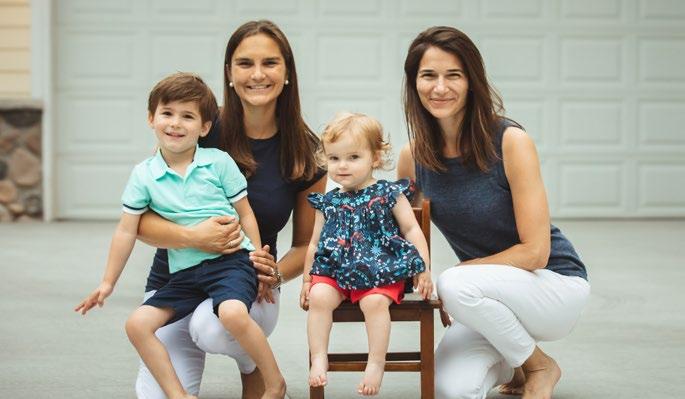
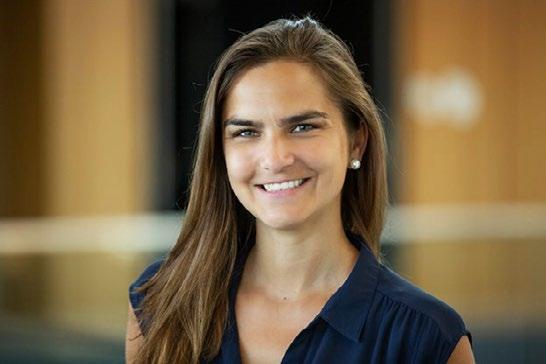
“It was wonderful to be asked to share my coming out story and involvement with D&I initiatives with current Wycombe girls. I recall vividly when Seniors would come back to speak to us and now I’m on the other side and was happy to share some lessons learnt. If just one person saw some of themself in my story then it was worth it. I enjoyed the questions at the end and hearing from girls touched by the talk in the days after. Now, I am currently enjoying getting to know my third child, Georgina, who may be a future Wycombe girl! Time will tell.”
Tracy Bjelland’s talk was one of the most worthwhile and inspiring talks that I have attended. She spoke to us about her experience of learning to understand her identity; with her study of Human Psychology being a key factor in this. She left us with advice to find different ways to find out who we are and be proud of ourselves. It was truly inspiring to hear about Tracy’s story – her openness, courage and perseverance is something we can all implement into our daily lives. Thank you Tracy.
Morade u IV
If you would be interested in speaking to the girls about your personal story, then please contact seniors@wycombeabbey.com.
 the Wycombe Abbey equality, diversity and Inclusion Committee were delighted to invite tracy to speak with current pupils about her personal experiences and identity as a gay woman.
the Wycombe Abbey equality, diversity and Inclusion Committee were delighted to invite tracy to speak with current pupils about her personal experiences and identity as a gay woman.
the second year of the successful s eniors Mentoring Programme was launched in november 2021 with pupils from u pper sixth connecting online with s eniors from around the world. this year we were delighted to welcome mentors living in the u K, hong Kong, Japan, switzerland and the us .

The Seniors Mentoring Programme takes place during timetabled sessions within the Carrington Award, our award-winning Sixth Form enrichment programme designed to help pupils prepare for the broader challenges of life and work beyond School.
The programme grew in participation from the previous year, matching 38 pupils and 30 Seniors across a range of interests, industries and fields including business, finance, law, medicine, engineering and politics. Mentors met with
their mentees five times throughout the year to identify and work towards their goals. Mentors shared advice and their own experiences on entering higher education and the workplace. Seniors are currently involved with mentoring both pupils and Seniors via the Seniors’ Connect website.
If you are interested in becoming a mentor and sharing your experience and skills, please register your interest on the Seniors’ website.
Finding opportunities for in-person work experience has been a real challenge for our pupils in recent years.
We’d love to hear from any s eniors who might be able to host pupils on one-week placements over school holiday periods. We’d be interested in hearing from all sectors, although we do have a number of pupils who are keen on getting some lab-based experience with a view to pursuing studies in biochemistry and also a number interested in the pharmaceutical industry.
If you think you might be able to help, please email Becky Scott in the Careers Office scottb@wycombeabbey.com. We’d love to hear from you.
throughout the year, we offer a variety of talks and events to encourage and inspire pupils as they consider their future career options. s eniors play a hugely valuable role in this process. We have been fortunate enough to welcome various s eniors to talk to the girls over the past few months, either as part of our annual Careers s eminar or at one of our termly Career s potlight evenings.
Below is a report from three pupils about a Careers Spotlight event in September.
In September we held a Modern Languages ‘Career Spotlight’ event as part of School celebrations for the European Day of Languages.
We were delighted to invite Lizzie Norton (Class of 2015, Campbell, C296) and Christina Winter (Reilly, Class of 2006, Shelburne, C247) to join us. We welcomed students from across the school to their talk in order to find out where pursuing studies in modern languages can take you. Hearing from two linguists whose careers have taken very different paths, it was truly fascinating to gain an insight into all the doors that multilingualism can open.
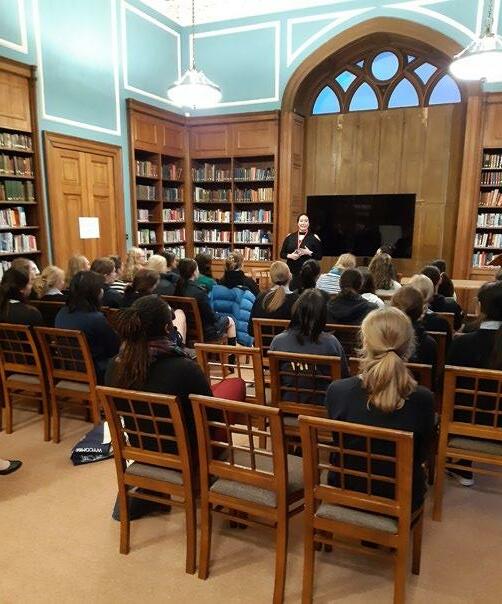
As an entrepreneur, Lizzie shared with us how she built her career using the skills that a degree in French and Spanish provided. This was invaluable for our aspiring linguists at Wycombe Abbey to hear. In addition, we were intrigued to learn that in her role as an employer, Lizzie views a degree in a language in such a high regard. Christina gave an interesting talk about her passion for translation and the obstacles that one faces when translating one’s favourite English literature, especially fantastical novels such as Harry Potter. We enjoyed discovering the roots of her passion for languages and the skills she has acquired which have supported her in her current role in the world of finance.
We would like to thank Lizzie and Christina for coming and sharing their experiences with us. We hope that Wycombe Abbey will be able to welcome them back in the future.
In early November, we hosted a number of Seniors at our annual Careers Seminar – held in person for the first time since 2019. Pupils attending this event chose two talks to attend from a huge variety of options; from law to journalism, medicine to investment banking and architecture to engineering to name but a few. This event is for UV, LVI and UVI and we encourage pupils to pick one talk from a career area they are already keen to explore and to choose one from an area they may not already have considered.
Our guests spoke about their career journeys – including some highs and lows – and then kindly allowed time for girls to ask questions. The emphasis on discussion and questions at this event ensures pupils can get under the skin of various careers and ask what it’s really like to be at work!
Thank you so much to all Seniors who have participated in these events and generously donated their time to support our pupils.
We are always interested in hearing from Seniors who might be willing to be involved in any aspect of our Careers guidance programme here in School. There are all sorts of ways you could help, from speaking at an event, offering support as a Mentor or hosting a pupil on work experience. Whatever time you can offer, we’d be delighted to hear from you.
Please contact the Careers Office for further details: scottb@wycombeabbey.com
to celebrate 125 years educating women, over the s ummer term we took a deep dive into our archives and selected 12 objects to help tell the story of Wycombe Abbey.
Frances d
This object is perhaps one of the most understated but entrancing objects in our collection: a list made by Frances Dove of the buildings she was considering as possible sites to house the school she intended to establish in England after leaving her role as Headmistress at St Leonard’s School, St Andrew’s. This item is a piece of Wycombe Abbey pre-history. Frances Dove had stated criteria for her school site, it needed to be near a town, have grounds for sport, have less than average rainfall (so girls could take advantage of the outdoors) and a lake for swimming. Wycombe Abbey met all these requirements, and perhaps by the time Miss Dove wrote ‘Seen’ next to Wycombe Abbey’s name, she already knew it would be the perfect setting for her school.

Archives are filled with scraps of paper – photographs, notes, magazines, all of which help the archivist to build a picture of the past. It is rare that an entire unpublished manuscript sits quietly within the boxes, a detailed history already written and waiting to be discovered. This item is one such gift that was among the items donated by Wycombe Abbey Senior Elsie Bowerman; her memoir Reflections on a Square . Elsie was one of the first pupils to attend Wycombe Abbey, joining as the youngest pupil in the School in 1901 and rising through the ranks of Cloister House, under Housemistress Anne Whitelaw, until she left for Girton College, Cambridge in 1907. She lived an extraordinary life, as a survivor of the Titanic , a nurse in World War 1, a witness of the February Russian Revolution, an election agent for Christabel Pankhurst in 1918, and a continual campaigner for women’s rights.
2How would you compare a secondary school girl today with one from a hundred years ago? What would it be like if they met? What would they say to each other? Wycombe Abbey pupil, Audrey Pim, asked herself the above questions in 1921 and wrote her response in an exercise book of English essays. ‘Manners’ and ‘dress’ are among the first things she considers, reflecting on how the girl of 1821 was “taught not to give [her] opinion unasked”, quite different to the vocal debates in Houses and classrooms recorded by Seniors since the School’s founding. Audrey also examines how the long sleeves and high necks of the 1820s differed from the ‘flapper’ style of the 1920s, as well as the lack of thorough education for the girl of the past. Audrey is convinced of an improvement to young women’s lives in all areas but clothing – she was clearly no flapper and happy to give the ‘scanty dresses’ a miss!
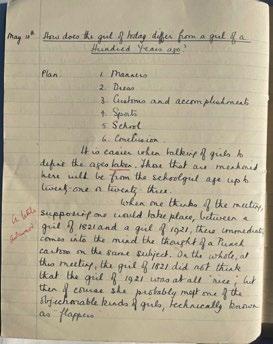

What a scene! Trestle tables out, teacups laid, straw boaters and bright midsummer light dappled through the shade of the trees. In our minds, we are all at the party. This is a photograph taken on Mission Day in 1904, the day each year when members of the parish of St Mark’s in Camberwell would travel by train to Wycombe Abbey for cream teas, boating on the lake and relaxation in the grounds. The South London community were part of the Peckham Settlement, where pupils from Wycombe Abbey and other girls’ schools supported the needs of residents and local institutions. Frances Dove was steadfast in her commitment to supporting those in need, establishing many charities and working as a High Wycombe Councillor alongside her role as Headmistress. She also believed that social work was vital to the moral and spiritual development of her pupils. Charity work remains integral to Wycombe Abbey today and some of the charities we support have been with us since the School’s foundation.
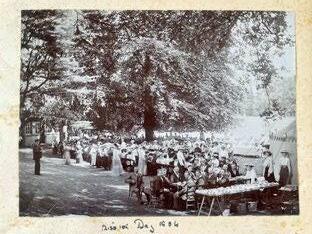
These archive items are literary supplements produced by Wycombe Abbey pupils in the 1920s. Each magazine has a colourful woodcut print on the front, a hint to the reader of the artistic pursuits inside. The pages are filled with poems written by pupils; they often reflect on daily life, sometimes politics, frequently include humour and are invariably personal. The poems are accompanied by confidently carved and carefully pressed woodblock prints. While some might think that the art produced in schools follows the work produced by professional artists, these woodblock prints show Wycombe Abbey pupils adeptly using a medium at the same time that it was being explored by the avant-garde of British art.


5This photograph is an image, but it is also an object – wearing its history in its surface texture, sun-bleached edges, and the archive tape attached to its sides in an attempt to stick down its curling edges. Additions – made intentionally or unintentionally – that reveal the photograph’s age and the longstanding will to preserve it; for it is an important photograph, the only one in our collection that depicts the previous owners of Wycombe Abbey, the Carrington family, at the estate when it was their home.
We see the 3rd Lord and Lady Carrington (Lady Carrington in the centre and Lord Carrington seated to her right) and four of their daughters, standing or sitting in the front row. Their friends stand around them, including the Duke of Clarence, who stands on the far left. The figures are assembled in Wycombe Abbey’s cloisters, at what is now the entrance to the Junior Library and was, for many years, access to the staff room. The building, down to its finest details, looks exactly as it does today – the wooden panelled glass inlaid door, the brickwork, the wisteria around the arcade.
Look at them go! Lacrosse sticks high in the air, arms stretched up, legs and feet balletic as they leap. This photograph records the moment when one pupil has just caught a high-flying ball with her lacrosse stick. It is a moment of sporting achievement and of psychology, as we zoom in on the triumphant player’s face and see she is still judging whether she will make the catch – will it stay in the net? The other player also reveals her thoughts, she is still poised on her journey to catch the ball but her face tells us she knows her efforts are in vain. Our team photos chart the faces of lacrosse at Wycombe Abbey since our founding and document the sport’s changing uniform and, more recently, developments in sticks. This photograph, however, conveys something of the spirit of the game that is so dearly loved at School. The image was taken in 1988 and records what is most likely an inter-House match, as both girls don the same kit. The location is Pitch 1, just in front of the main Abbey.

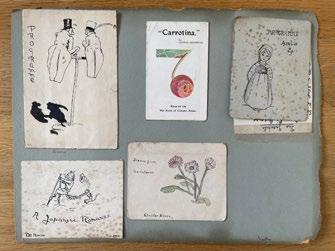
The community spirit of the 11 different Houses at Wycombe Abbey is fundamental to life at the School. Each pupil and staff member is proud of their House’s own idiosyncrasies and a passionate defender of their achievements. The many activities played out within and between the different Houses go back to the beginning of the School as these play programmes, collected by Eileen Smith (Pitt) in 1910, illustrate. There are five programmes included in this post, each for the play performed by a different House to the rest of the School – Cloister House’s Scenes from Coriolanus , Pitt House’s A Japanese Romance , and Barry’s The Treasure Seekers . Inside, each contains a list of the Dramatis Personae and, in some cases, a list of the acts performed. The hand-drawn covers –all original, redrawn for each programme (apart from the printed ‘Carrotina’) – demonstrate the enormous care given to all elements of the performances, ensuring that every programme was neatly drawn and assured to excite arriving audiences.
This article from the Bucks Free Press in 1979 details the opening of Clarence, by Lord Carrington, as a House dedicated to the Upper Sixth. Clarence had previously been housed in the Abbey, taking girls from each year group like other Houses. This House sought to provide each pupil in their final year with a single study bedroom and somewhere to relax and cook, enabling pupils to organise themselves as they would do at university. The creation of Clarence also encouraged Upper Sixth pupils to focus on their studies and expand their ideas in a year when, as Miss Lancaster put it, “so much work is done for the future”. The concept of Clarence was for the Upper Sixth to be outward-looking, securing their futures, while the Lower Sixth would be inward-looking, taking leadership roles within the School. This progression of roles within the Sixth Form is a familiar picture for Wycombe Abbey pupils today.

Her expression is gentle yet stern, eyes fixed to the side and mouth softened at the corners, you can just as easily imagine her face transformed into in a wide smile as a fierce glare. This image of Wycombe Abbey’s fencing teacher from 1961 was captured by the celebrated photographer Eve Arnold, who came to the School on commission from the Sunday Times. Arnold describes the experience in a letter also held in our archive: “I was doing a photo series of five girls’ public schools – for the Colour Magazine of the Sunday Times –and Wycombe Abbey was probably the most colourful of them all.” She continues fondly, “the lady was patient and kind with me, and … the school gave me the run of the establishment.”

Sport has been a key component of Wycombe Abbey pupils’ education since the School’s founding. Frances Dove advocated the integration of physical exercise with academic learning to produce an education that included balance and variety. A wide range of sports, including fencing, are taken up by Wycombe Abbey pupils each term.
An image of pioneers. This is a photograph that depicts our founder Frances Dove and the first staff body to teach at Wycombe Abbey. The group portrait is set in front of the Abbey building, Frances Dove central as Headmistress among the 18 young teachers surrounding her. In many ways the photograph announces its Victorian context to us – sleeves are puffed, skirts long, and the sitters have an invariably unsmiling attitude to the camera. However, this group of female teachers were not doing what Victorian society, still ambivalent about the education of women, expected of them, they were establishing a centre for academic excellence where young women could excel. We are incredibly proud of the legacy of Frances Dove and all the Headmistresses and staff since then. We continue to strive to be at the forefront of girls’ boarding education and recognised globally as a world class school.
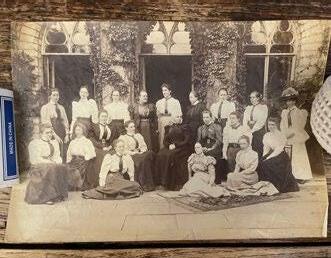
A unique object recording a history that spans generations of Wycombe Abbey pupils, staff, and residents. The dishevelled box is not something you would expect to find in an archive and immediately raises the question to anyone who finds it of “Why is this here, preserved for posterity?” The box dates back to autumn 1938. During this term, two adventurous girls found an accessible space in the roof of the Abbey; they collected the small cardboard box we see today and inside put a page from an exercise book and wrote the following pencilled, laconic, unpunctuated message: “This monks hole christened Gazama in the year of our Lord 1938 by two members of an abbey house will anyone who finds this sign below” Both signed the paper and hid the box in the roof. In 1940, five more girls found the box, signed the sheet of paper, and hid it again. In 1942, Wycombe Abbey was requisitioned by the UK government to serve as headquarters for the United States Eighth Army Air Force; on 18 March 1944, two junior airmen also found the Gazama box and added their names. Eight years later, Mr Plumridge, a member of grounds staff, added his name, as did four workmen in 1994. In 1995, the box was brought into safe keeping, but remains a vivid connection to the games of boarding school life from over 80 years ago.

After Wycombe Abbey, deborah received a Bachelor of Arts in history from the u niversity of sussex. s he now lives in los Angeles, where she continues her distinguished career in marketing, publicity and not-for-profit work in the film industry.

Please give us a brief outline of your career and how this led to your current appointments.
I began my career as a unit publicist in the UK before transitioning to the US with Lucas Films on Star Wars The Empire Strikes Back , followed by working for writer/director/producer David Chase ( The Sopranos) at Universal Television and Lorimar/ Warner Brothers Television.
I launched my own publicity and marketing company, Kean & Kolar Communications, in 2008 specialising in designing strategies for Golden Globe, Bafta and Academy Award Campaigns. My film credits range from award-winning films such as Rocketman, Downsizing, Fences, The Big Short, Selma, Noah, Nebraska, Flight, Hugo, True Grit, The Fighter, How to Train Your Dragon, Shutter Island, Up in the Air, Pulp Fiction, Dances with Wolves and Silence of the Lambs to the Australian, Polish, Brazilian, Irish, Indian, Finnish, Taiwanese and Swiss entries for the Academy Awards ®
I am the international consultant to The Karlovy Vary International Film Festival in the Czech Republic, the Sarajevo Film Festival in Bosnia and Herzegovina and for Irish Screen America. I have had experience
representing feature films and companies at major international and US film festivals and markets including Cannes, Venice, Berlin, Karlovy Vary, San Sebastian, Sundance, Taormina, Toronto and Telluride.
I recently served for six years as a board member of the British Academy of Film and Television Arts, Los Angeles (BAFTA). I am on the board directors of Artists for Change, a non-profit organisation with a mission to create high-impact film, television and multimedia projects to inspire individuals, organisations and communities to bring about positive social change.
you have achieved a great deal –from what have you taken most pleasure during your career?
I have taken the most pleasure from working with talented, young, creative filmmakers. It is always exciting to embark on a new project with a passionate and dedicated film team with original ideas. I enjoy the chance to share the wisdom I have obtained from a long career in entertainment, while at the same time getting the opportunity tolearn new things.
h ow did you become involved in the non-profit sector?
I was approached by a fellow Brit, producer and director Julia Verdin, with whom I was on the Board of BAFTA-LA to join the board of her non-profit called Artists for Change www.artists4change.org. Artists for Change’s film, TV, and multimedia projects are given to schools as an educational tool to raise awareness among students and parents. Artists for Change also holds educational events for filmmakers year-round to encourage them to think about the content that they put out into the world and use their voices to contribute to positive change.
What does Wycombe Abbey mean to you? What role did your s chool education play in preparing you for your future?
Wycombe Abbey provided me with a first-class education among engaged, powerful women with strong values. My education at Wycombe Abbey gave me a good foundation to prepare me for the challenges of my profession.
Where have your sources of inspiration come from in your life? Were there inspirational influences at Wycombe Abbey?
My sources of inspiration have come from my education, my family and colleagues. Dr Margaret Beckett, known to us as Miss Beckett, who taught History at Wycombe Abbey for 34 years and was my History teacher while I was at Wycombe Abbey, was a major inspiration. She provided a balanced, philosophical view of the world, encouraged discourse and really cared about her students.
during your time at s chool, did you know what you wanted to do as a career?
At Wycombe Abbey I was still exploring ideas about a career. It was not until I was at university that I decided to aim for a career in the arts and entertainment.
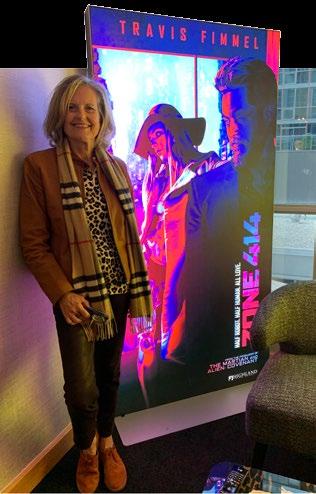
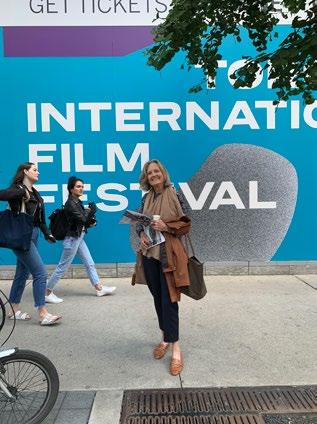
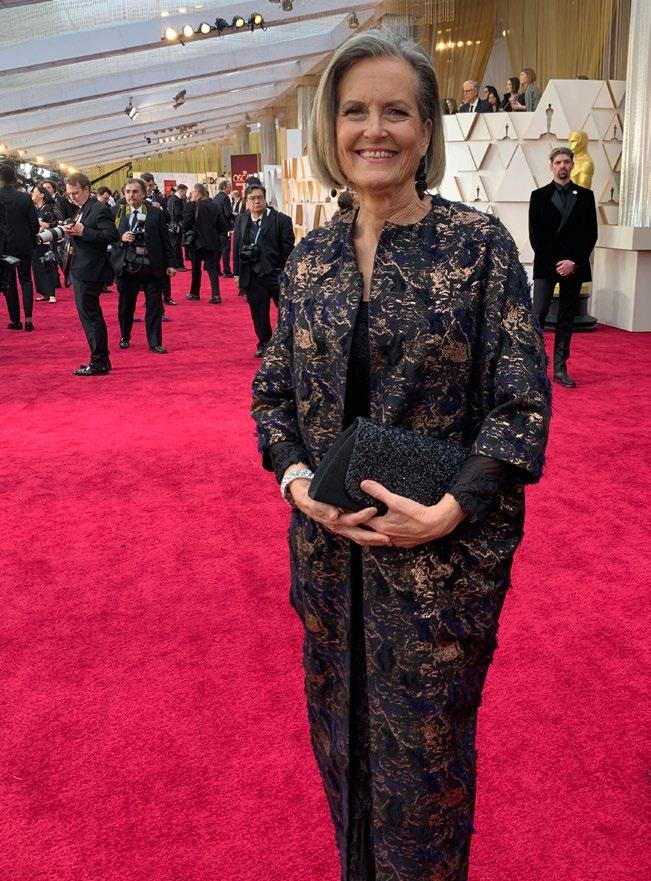
What advice would you like to pass along to pupils?
My advice to pupils would be to take time out from your studies to walk the beautiful grounds of Wycombe Abbey and participate in physical activities where you can. Value the friendships you made in school. Mine have lasted all my life. And when you leave school, remember, it is never too late to keep learning!
“My sources of inspiration have come from my education, my family and colleagues.”

I left Wycombe in 1999, had a gap year in China, read e nglish at Oxford, then went on to s OA s for a Masters in Chinese s tudies before building a career in business. h aving become a bit listless and uninspired by my job in my late 20s, a wonderful year at I nse A d in 2010 in France and s ingapore completing an MBA galvanised me to spend a few years as a management consultant at McKinsey before moving into strategy roles, most recently at Compare the Market (yes, the one with the meerkats). I enjoy roles that combine solving complicated problems with creating a plan of what needs to be done and leading teams to make it happen.
I stumbled into establishing and running a charity by chance. Horrified by the scenes from Afghanistan in the summer of 2021, I contacted a family friend who had been working as a legal mentor for judges in Kabul to see how I could help. I was on maternity leave and had vague ideas of collecting baby clothes and equipment for refugees arriving with young families. Instead he said that what his friends and colleagues really needed was English lessons.
One year on and LAW-G (Legal Afghanistan Working Group) is now a registered charity equipping Afghan legal professionals with the English language and cultural skills they need to open up employment opportunities in the UK and thrive in their new home. We provide laptops for our participants and partner with a non-profit college to provide online English lessons wherever our participants are housed in the UK. Our weekly series of online lectures provides an introduction to English law as well as many aspects of public administration and civil society. As the Professor of Law who designs and delivers many of the lectures observed, an introduction to English law is an introduction to our society and way of life.
We know our programme works. In the pilot group (all women, selected to benefit first from the funds raised privately as the most vulnerable of our participants), twothirds have offers of LLMs or employment in the legal sector after 9 months of study with us. Now we need to raise funds to provide English lessons for all our participants. We employ a translator, himself an Afghan refugee, and all our other activity is completed by volunteers. All the money we raise goes directly to fund our work; £5,000 provides one year of lessons for one participant.
Our participants are an extraordinary group of people. For years before the Taliban takeover, they lived under grave threat because of their work striving for a fair, human rights-compliant justice system with an emphasis on the rights of women and girls. Many of their colleagues were murdered. Once in power, the Taliban released all prisoners, including those convicted by our participants of heinous crimes. Having stood up for the rule of law, our participants had to abandon virtually all they had, fleeing for their lives in circumstances that were vividly depicted in the scenes at Kabul Airport and elsewhere.
Horrified by the scenes from Afghanistan in the summer of 2021, I contacted a family friend who had been working as a legal mentor for judges in Kabul to see how I could help.
A few others, by complicated and frequently dangerous routes, have since also managed to leave the country. Others, we know, are being hunted down by the Taliban and if caught are likely to be murdered. Here in the UK, participants are still living with their families in hotels and are increasingly desperate to find a way to establish stable family and professional lives in an underfunded, incoherent and chaotic system. Every time I feel demoralised (usually by how hard it is to raise money), the determination of our participants to rebuild after such trauma spurs me to keep going, to send another email or make another call.
If we do the work we intend, our participants will no longer need our help and in a few years we will dissolve the charity. When I was first involved, I assumed somebody else better qualified and more experienced would be doing similar work and I would step aside. But nobody else was doing this work, and others doing similar work have faded away with the headlines about Afghanistan as other crises took hold.
I have learned a huge amount, not least that without my professional skills, particularly those learned at McKinsey, we would not have been able to launch and register our charity with such speed and precision. I have volunteered before, doing practical things such as hosting tea parties for a group of isolated elderly people and sorting donations at a foodbank; LAW-G is the first time I have used my skills to affect systemic change. I have learned that being disciplined about limiting what we offer has made us more effective. There is almost infinite need so it often feels ruthless, even brutal, to say no to all the other things we could do. But being specific about what we can do best has allowed us to deliver our commitments and benefit a specific group.
Wycombe equips us all with the desire to help others, and the means to get things done. Twenty years on, I have a close and beloved group of Wycombe friends who continue to amaze and amuse me. I am always struck that in a wide range of professional careers, whatever the end product (be it a theatrical production, an education strategy, a new cancer centre, litigating a dispute in the murky world of Mixed Martial Arts) the skills we use are very similar. Articulating the goal, working out the path to get there, wrangling people who’d rather talk than take action, calming panickers, wading in to resolve crises, moving everybody on to the next thing. The same has been true in setting up a charity and it has brought me the satisfaction of knowing remarkable people are better equipped to thrive in their new lives in the UK. There are interesting and valuable roles in the non-profit sector, but that’s not the only way to make a difference. Building skills in the private sector as I have done, then identifying a specific problem, establishing and testing how you can solve it in the simplest way, and taking the action needed to make it happen is a powerful way to help those who need it.
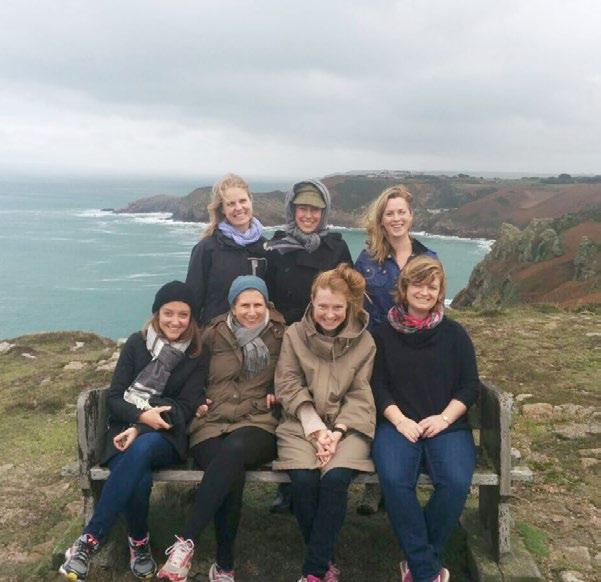
If you would like to help our participants, please contact me at jemmawithers@gmail.com. Inevitably, what we need most is money but as well as financial support we are looking for professional opportunities for our participants. If you are a lawyer, or work in a ‘law adjacent’ profession such as government, charity, or a large corporation with in-house lawyers, please get in touch if you could provide an opportunity for a refugee. Or maybe you’d like to deliver a lecture, run an online workshop, or know somebody else who might be able to help.

shortly after joining the Grounds team in March 2021, I was asked to collaborate on a project for the 125th anniversary celebrations. this involved the pupils planting trees for a new orchard on the site of an existing one. Initially the idea was to remove the old apple trees and plant new ones in their place, but the more time I spent around the orchard (near Pitt and Rubens) and discussed with colleagues, it seemed better to keep the old trees and find a way to add young trees alongside them. Thankfully, Dan Davy (Head of Grounds and Gardens) agreed. We’re not sure, but the old apple trees may have been planted over 40 years ago, they are still fruiting and give the area between the modern s ports Centre and Pitt/Rubens a sense of place and a connection with the history of the site.
I started by finding the supplier that had the widest selection of young apple trees available, and then finding varieties with a link to each House, and one for the Headmistress. This stage, going back and forth between the trees I would like to have and what the supplier could source, was probably the trickiest. It was essential to have all 12 trees available to plant at the same time, grow to the same size and also pollinate each other. Some of the varieties suggested themselves easily, Rubens House have ‘Rosette’ which unusually has pink flesh and ‘Greensleeves’ was a good match for Cloister due to their House colour. Butler have a great little apple in the form of ‘Blenheim Orange’.
When the day of planting dawned, 15 November 2021, I was incredibly nervous. Looking back now, I thoroughly enjoyed it and was really impressed by the level of engagement and enthusiasm shown by the pupils and staff. What struck me most was the strong sense of camaraderie shown by the girls and their teachers as they approached the task, especially the Junior girls who were still only in their first term at Wycombe Abbey. Some groups even decided to give their trees a name, Junior House named theirs ‘Veronica Dove’ and Shelburne opted for ‘Treevor’ – and

I think that’s lovely, after all I frequently sing to the plants and the wildlife so there’s nothing wrong with naming a tree!
It was a tiny bit ambitious to plant 12 apple trees and over 600 large bulbs in one afternoon, but because so many people lent a hand it was possible.

Between the beginning of the project and the time of writing, every member of the Grounds team has contributed, whether it was removing a small number of existing young trees from the area to make room for the new apples, mowing the orchard, levelling and seeding the old tree circles, excavating the planting holes, mulching the tree circles with the Abbey’s own leaf mould, litter-picking or providing advice, ideas, enthusiasm and support.
I look forward to more gardening projects ahead, in fact I’m going to start looking through the seed catalogues soon to see if there are some hardy annual plants we can grow with each of the Houses each Spring.
Ms Melanie Constantino Lead GardenerCommunity was a particularly appropriate Flourishing@Wycombe theme for the first term as we welcomed back many of our muchloved communal activities, such as Chapel and Whole School Singing. The joy of being together again as a community has been the hallmark of this year and something that I am sure will remain a constant.
The focus upon the importance of nutrition as part of our wellbeing is something that is championed by our
active food committee. Pupils from all Houses and year groups worked closely with our catering partners Holroyd Howe to ensure that varied, exciting and balanced meals and snacks are provided as part of everyday life at School. The focus upon nutrition also allowed us to explore the links between what we eat and wellbeing. UIII began 2022 with an interesting talk from Holroyd Howe’s nutritionist who spoke to the girls about how they could make healthy food choices to support their life in School. Pupils readily digested (pun intended!) the information about the link between nutrition and wellbeing and it was a pleasure to see all the amazing poems and posters that girls in Lower School produced on the topic and, in particular, the nutrition rap performed by one of our talented UIII pupils!
As we celebrated optimism in the Summer Term, a key highlight for me was the opportunity to record an episode for the Flourishing@ Wycombe Podcast with the new Head Girl Team in which we discussed their thoughts on the importance of optimism and how it will shape their leadership. Their

insight into this theme and other aspects of life at Wycombe Abbey and what they have gained from their time here was wonderful to hear and truly inspiring!
The Wellbeing Department continues to go from strength to strength under Miss Blunt’s leadership. Pupils have covered far more than the traditional PSHE and RSE topics and have explored many aspects of positive psychology and the science of wellbeing this year, both inside the classroom and through assemblies, tutor times and year group talks. Miss Blunt added a highly successful Clarence carousel to the Wellbeing programme to revisit the important PSHE and RSE topics that were taught earlier in the girls’ School career as well as focusing on how they can prepare for life beyond Wycombe Abbey. It has been great to see how well received this has been; after all, ensuring that our pupils are ready for life after School and are able to flourish at university and beyond is one of the main aims of our Wellbeing programme.
 Mr James Jones Deputy Head (Pupils)
l isten to the Flourishing@Wycombe podcast by searching on s potify or AnchorFM.
Mr James Jones Deputy Head (Pupils)
l isten to the Flourishing@Wycombe podcast by searching on s potify or AnchorFM.
After her time at Wycombe Abbey, helen went to the u niversity of Bristol to read Chemistry. Following graduation, she started a long and successful career at the u K Atomic e nergy Authority (u KAe A) based in Winfrith, dorset.
Please give us a brief outline of your career and how this led to your current appointment.
I immediately started working in the field of radioactive waste at a time when most people tended to research into improvements to civil nuclear power generation or reprocessing of nuclear fuel. A year later I moved to the UKAEA site at Harwell in Oxfordshire where I carried out experiments in fume cupboards and glove boxes to study the chemistry of radionuclides in a deep geological disposal facility.
In the 1990s the company was restructured to focus on decommissioning and clean-up of this site to allow it to be used for new science projects. My job as Waste Strategy Manager required me to identify all the waste on the site (whether radioactive or clean) and to determine the most suitable location for safe storage or disposal.
My final role was Senior Project Manager for the transfer of legacy waste off-site as part of the clean-up.
This involved heading up a team of experts in their own field to gain agreement with five nuclear regulators (safety, transport, security, safeguarding against proliferation and environment) as to what, why, where, when and how we should move this waste off-site. Local stakeholders at both sites had to be consulted and suitable transport packages had to be designed, tested, procured and licensed. As you would expect, transport packages have to be robust enough to withstand serious accidents involving impact and fire without releasing radioactivity. This was a high-profile project for the customer, the Nuclear Decommissioning Authority, which had specific pros and cons. Naturally there was a lot of scrutiny but if you needed something done, it would most often be given a high priority.
you have achieved a great deal – from what have you taken most pleasure during your career?
Managing to juggle bringing up two children with a career not only gave me great pleasure, but also a genuine sense of achievement. When the children were young I wanted to work part-time. Fortunately, I had a forwardthinking boss who realised that if I didn’t return to work after having a family, it would be a waste of my training. This was unusual as I had no female role models who were scientists or engineers working part-time.
Working with radioisotopes is much more complicated and time consuming than the equivalent experiments with inactive material so it was very satisfying to pass on my knowledge and experience of working in glove boxes to sandwich students and graduates. This experimental work culminated in determining the chemistry of actinides, such as plutonium, americium and uranium, under high pH conditions. Knowing that the data we produced continues to be used today when modelling (theoretically) the behaviour of radioactive waste in a deep repository is most rewarding.
A large chunk of my career was spent estimating the characteristics of legacy radioactive waste stored on site and the waste produced by site clean-up in order to determine how it should be treated for safe storage or disposal. Thus, when the opportunity arose to implement one of these strategies for legacy waste, I jumped at the chance to manage the project. It was particularly satisfying when after nearly four years we saw the first waste package safely leave the site.
during your time at s chool, did you know what you wanted to do as a career?
While I was at school, I had no idea what I wanted to do as a career. Both my parents were mechanical
engineers but I was more interested in Science. Maths and Science were my best subjects so I studied them at A level. It was a toss up between Chemistry and Physics at university. In those days large companies toured the universities to recruit graduates. I’m almost embarrassed to admit that I took the first job offered me by UKAEA and effectively stayed there ever since. UKAEA has evolved within the nuclear industry including the privatisation of AEA Technology, the formation of Research Sites Restoration Ltd and finally becoming part of Magnox, a decommissioning company running ten sites and financed by the Nuclear Decommissioning Authority. Thus I have been able to take several opportunities to develop my role throughout my career. I started with experiments on radionuclides using fume cupboards and glove boxes. Once the decision had been made to decommission all these facilities, I concentrated on waste management strategy. The strategy of consolidating certain waste-streams off-site opened up the opportunity for me to lead the implementation project.

What role did your s chool education play in preparing you for your future?
My time at school taught me how to work hard. I wasn’t particularly bright and had to work hard to keep up but it did mean that I achieved better A level results than I was predicted. Wycombe Abbey provided a first class education but at that time it didn’t necessarily prepare me for the outside world and relating to people with different life experiences. Nevertheless my education gave me a certain inner confidence because, despite being a woman in the maledominated nuclear industry, I never thought I was any less capable than my male colleagues.
What were your passions and interests at Wycombe Abbey?



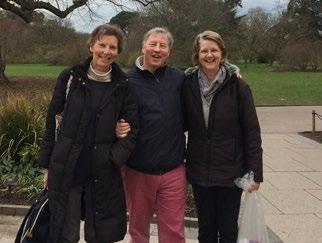
I was a very quiet student at Wycombe Abbey and didn’t excel at anything in particular. I enjoyed the discipline of learning the piano and oboe and being part of the School orchestra.
What advice would you like to pass along to pupils?
You do not have to be an A1 student to be a success in life. We all develop at different rates, different stages and flourish in different things. No one career is better than another, even if it pays more. This country needs people willing to do the jobs that don’t get a good press as well as the high-prestige jobs. It is lovely if you already know your career path but don’t worry if you don’t know what you want to do. If that is the case, keep your options open and study a range of A levels rather than narrowing the field. Remember you can change your career later in life if you want to and bear in mind that when you leave Wycombe Abbey there will be a significant percentage of jobs that didn’t exist when you first arrived in High Wycombe.
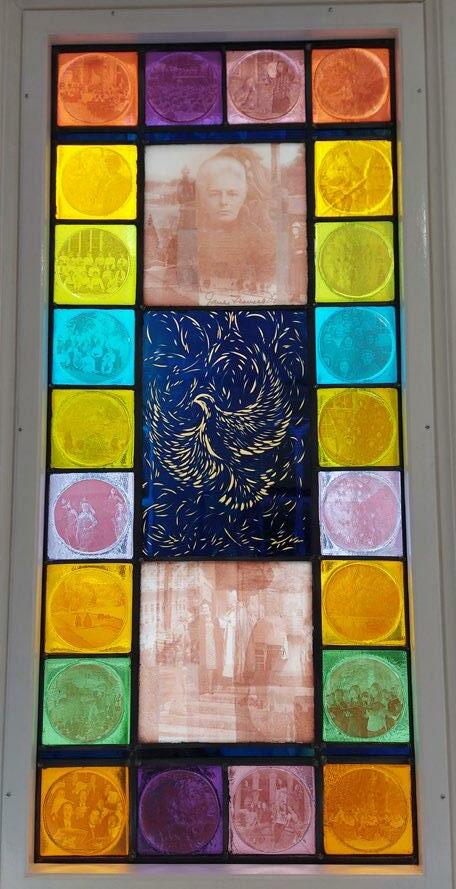
t was a privilege to create this piece of art for our 125th anniversary. the project came about as a result of conversations with Fania Weatherby, our s chool Archivist, and a trip to visit the Wycombe Abbey archives which track the history of the s chool with imagery going back to the beginning, 125 years ago. I had a great time looking through and learning about the way the s chool operated throughout its long history. s electing imagery to use was not easy!
I
I worked with LIV to explore ways to use photos in collage before starting to plan the final window design. I was inspired by the beautiful William Morris and Edward Burne-Jones Windows in the V&A Museum. Considering how to create the structure to fit in with the gothic revival architecture of the Abbey, I decided to create a fairly classic composition based around the circles and a centre design. I used engraving to create the dove. Working with photographic imagery was new to me, and I spent time exploring and experimenting with the new technique before I was ready to use it. I tried to use all the colours of the Houses as well as the blues to represent the School.
I loved working with the archive material – the older images were really fascinating. I combined them with more recent imagery to represent current times. There are now so many images to choose from, but curating the photos was not an easy task! Altogether, they tell the story of the 125 years of Wycombe Abbey.
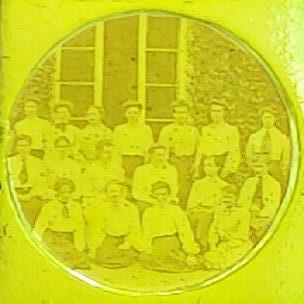
The completed stained-glass window is now on display for everyone to see in the Abbey corridor between Junior Library and the Staff Room.
Mrs Claudia Phipps Artist in Residence
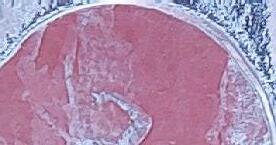


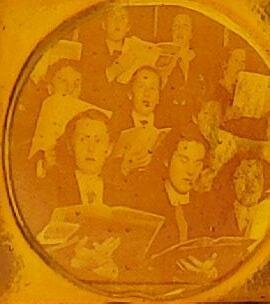

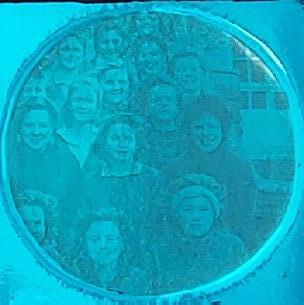

In June, we were excited to share the 2021/2022 Wycombe Abbey Virtual Art e xhibition. this exhibition spanned four schools, the s chool here in the u K, two schools in mainland China and one school in hong Kong. despite the ongoing Covid-19 restrictions in mainland China and hong Kong, these amazing pupils have been able to come together to show their incredible artwork through these virtual exhibitions.
Wycombe Abbey in the UK shared almost 200 pieces from pupils of all year groups as they explored, developed, and created their work with a variety of media and skills including printmaking, creative textiles, ceramics, photography and acrylic painting. Encouraged to develop their own styles, pupils embraced the artistic process and journey to discover their talent and push their own thinking, creativity and innovation. A level pupils explored and developed their own ideas by refining and sustaining their individual creative journeys in sketchbooks and in large-scale final pieces. Our resident glass artist encouraged the examination pupils to explore the properties of glass fusion to extend their ideas.
Wycombe Abbey School Hong Kong’s exhibition showcased almost 100 pieces from younger pupils aged 5 to 14. The pupils experimented with different ideas, materials, and tools through team and individual projects.
They were inspired by different artists from different eras around the world such as Alberto Giacometti, Julian Opie and Romero Britto. They also celebrated Women’s History Month by researching Mary Blaire, Louise Bourgeois, Yayoi Kusama and other famous female artists who made huge impacts in the art world. The theme was ‘Together, We Are Better.’
Wycombe Abbey School Hangzhou, in its inaugural year, exhibited over 80 pieces of art from the School’s first pupils in Years 7 to 11.
At Wycombe Abbey School Changzhou, young artists created almost 200 pieces of artwork in various formats.
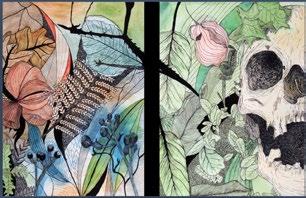
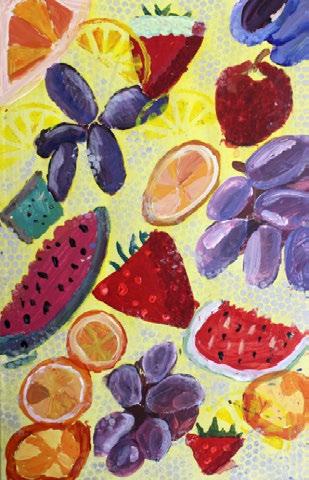
This collaboration across the schools is an example of the Wycombe spirit of creativity and imagination.
Ms yael Marwah Wycombe Abbey International Executive Coordinatoryou can view the exhibitions from our news section on the website.

We are delighted to count seniors among the school’s most valued benefactors. It is with their support that we can secure the long-term vision of the school and offer a breadth of opportunities to current pupils, increase our bursary provision and develop our magnificent 170-acre conservation-listed site. Thank you to all our supporters for your help this year.

the
s chool does not have a large endowment and consequently, our ambitious plans for academic, recreational and pastoral advancement can only be achieved with the financial support of our community of s eniors, parents and friends.
The continued support of our valued donors will ensure that future generations of Wycombe Abbey girls also experience a world class and ever-improving School. Donations help support the School in three key areas:
It is our belief that every girl should be empowered to make the most of her abilities. We wish to ensure that entry to the School is available to more girls who would benefit from an education at Wycombe Abbey, no matter her family’s financial circumstances. The Bursary Fund enables us to offer talented young women the opportunity to thrive at the School. We would like to increase bursarial support significantly, so that it is available for 12.5% of our pupil roll (around 80 girls each year). Ensuring that our bursary pupils thrive at the School remains a priority and we will apply careful consideration to the selection of bursary pupils based on ability, potential and financial need, alongside a dedicated pastoral care programme to support them during their time with us.
Having world class facilities throughout the School site creates an environment for our girls to pursue academic excellence and for our staff to provide outstanding teaching, enabling each of our pupils to
flourish and fulfil their potential. We have developed a phased, long-term estates masterplan that will see us build state-of-the-art teaching, learning and living spaces, in line with the best schools in the world. Today, Wycombe Abbey is recognised as the leading girls’ boarding school in the UK. High-quality, fit-forpurpose facilities that benefit our current and future pupils are an important element in enabling us to remain in this position.

Read about our vision at development.wycombeabbey.com
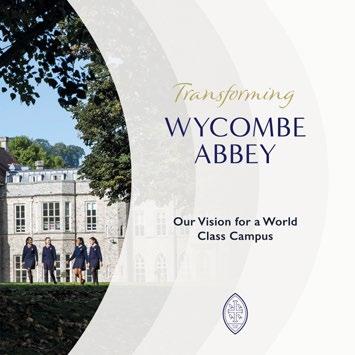
Unrestricted donations can make a significant and immediate impact on the School. They allow the School to direct funds towards the areas of greatest priority, and support a broad range of projects.
Abbey is very grateful for the generous support that our community has given over the past 125 years. this year, we are asking seniors to make a donation to our Annual Fund as we look to the future with ambitious targets and a clear vision.
the Annual Fund is made up of donations of all sizes by alumnae, parents and friends. the ongoing support of our valued donors will ensure that future generations of Wycombe Abbey pupils will continue to experience a world class and ever-improving school.
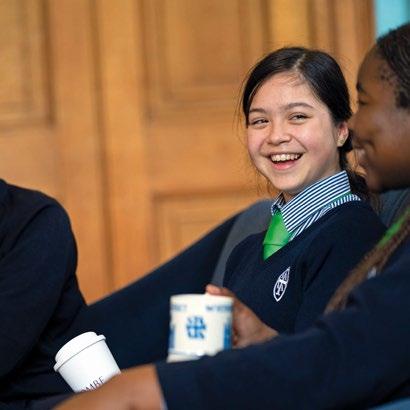
For more information about the Annual Fund, please contact the Development Office at development@ wycombeabbey.com or on +44 (0)1494 896301.
Every gift makes a significant difference:
• If 100 individuals donated £10 per month, it would provide laptops for ten pupils from a disadvantaged background.
• If 100 individuals donated £30 per month plus Gift Aid for five years, it would provide a full transformational seven-year bursary.
• A single gift of £125 would fund karate lessons for a term for a talented girl in receipt of financial support.
You can make a one-off donation or set up a regular direct debit by scanning the QR code below or online at bit.ly/WASupportUs.

The Wycombe Abbey Hong Kong Foundation has charitable status in Hong Kong. Donations made to the Foundation are eligible for tax deductions subject to normal restrictions.
If you live in the USA, you can give tax-effectively to the School via CAF America and British Schools and Universities Foundation (BSUF).
You can also make a donation via bank transfer, credit or debit card, or cheque.
Our benefactors help to secure the long-term vision of the School. By remembering Wycombe Abbey in your will with either a lump sum or all or part of your estate, you have the capability to support the School’s ambitious plans as they evolve over time.
In recognition of two remarkable women, the School created the Dove-Bowerman Society in 2017 to recognise and thank all those who indicate an intention to leave a legacy to the School.
Thank you for helping Wycombe Abbey continue to nurture the next generation of pioneering women.
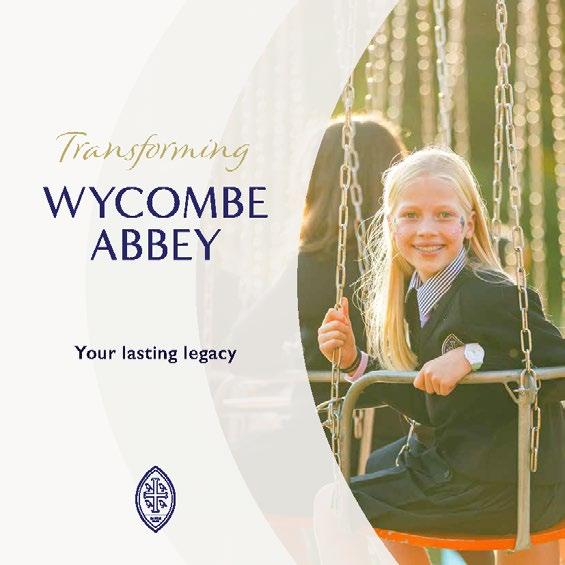
If you would like a confidential conversation about legacy giving, please contact Clare Flynn-Scarcelli, Director of Development and External Relations, at development@wycombeabbey.com or +44 (0)1494 896301.
The support of donors, who invest in Wycombe Abbey’s future at the leadership level and inspire others to give, is critical to the success of the School. We are delighted to invite our most loyal and generous supporters to join the 1896 Society.
Members of this group are invited to events and gatherings at the invitation of the Headmistress and Chair of Council.
To discuss membership of this society and your gift to School, please do not hesitate to contact Clare FlynnScarcelli, Director of Development and External Relations, at development@wycombeabbey.com or +44 (0)1494 896301.

Humans of Wycombe Abbey
of Wycombe Abbey celebrates 125 years since the foundation of the s chool. Pupils have produced a wonderful publication to celebrate all those within the wider Wycombe Abbey community, celebrating a diverse range of experiences and memories throughout the generations of pupils, staff and s eniors.
All proceeds from this publication will be donated to the School’s Bursary Fund, enabling more girls to benefit from the same opportunities and memories experienced at Wycombe Abbey.
You can purchase a copy of Humans of Wycombe Abbey at:
humansofwycombeabbey.co.uk VOLUME 2 HUMANS OF WYCOMBE ABBEY Wycombe Abbey, High Wycombe Buckinghamshire, HP11 1PE enquiries@wycombeabbey.com +44 (0)1494 520 381
52 Philanthropy
HUMANS OF WYCOMBE ABBEY Celebrating 125 Years
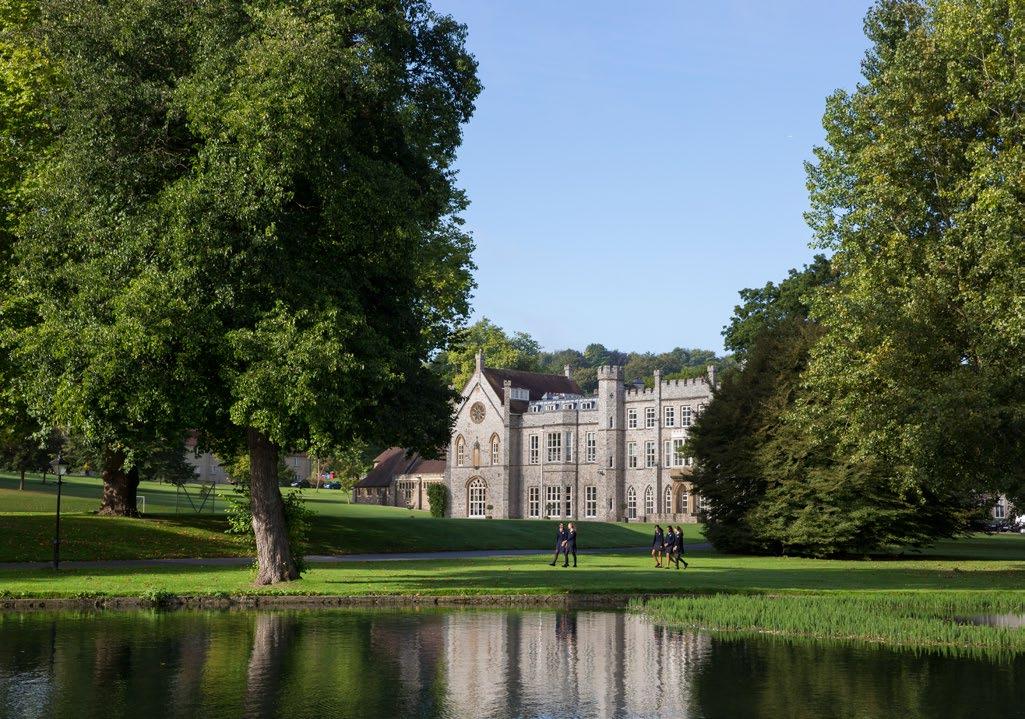

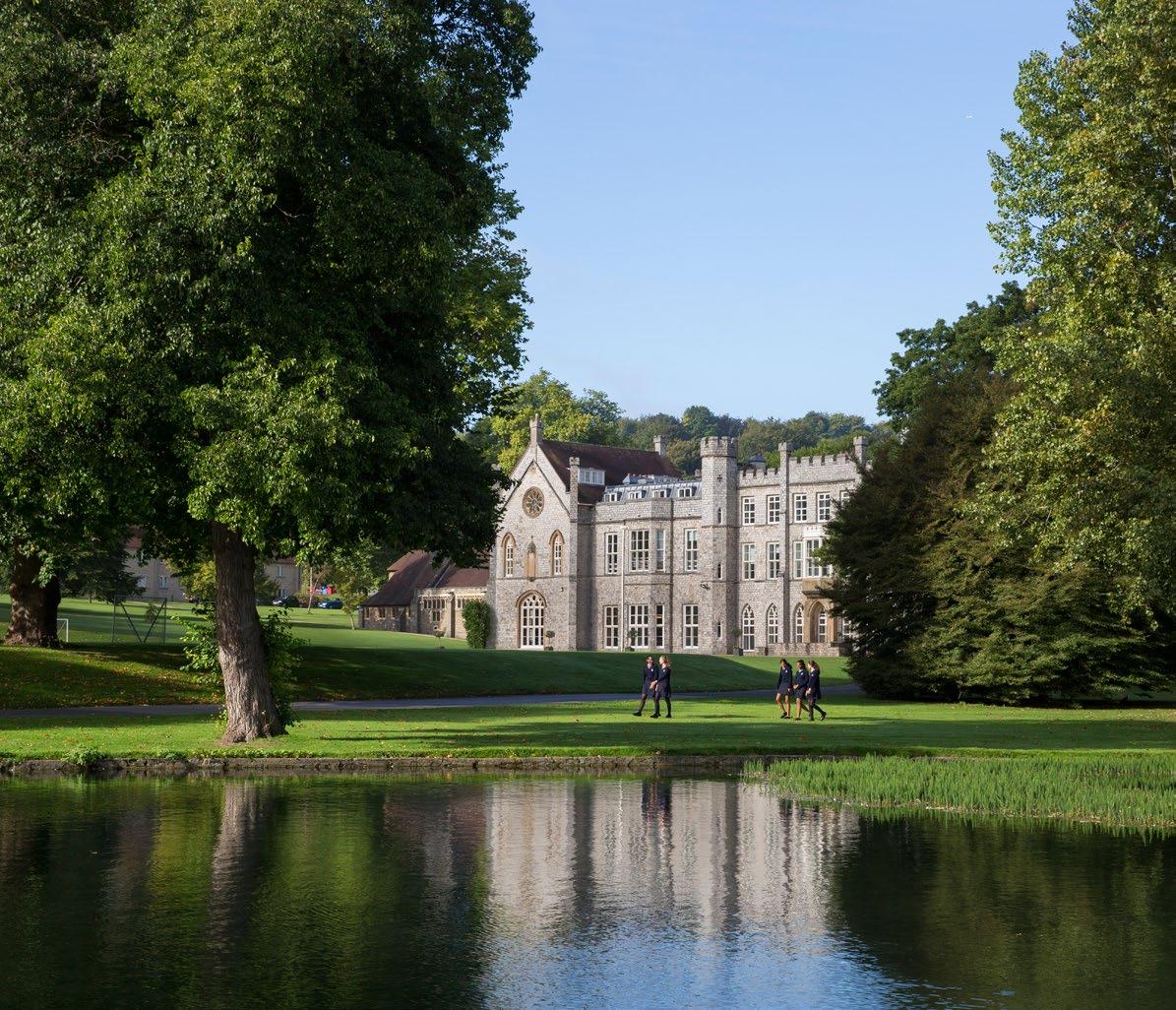
this Award was established in memory of senior, Vera Gordon who entered the s chool in 1931 and died three years later. Applications are open to all s eniors and current pupils in Clarence.
The travel must include some charitable activities, and the applicant must be proactive about raising most of the money herself. The award is usually in the order of a few hundred pounds.


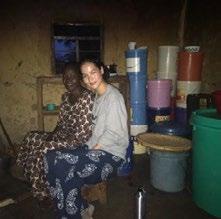
To apply, applicants must complete the Travel Award form, providing full details of their plans, including a


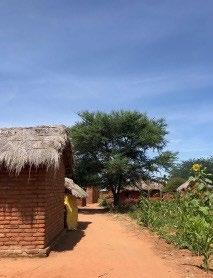

breakdown of costs. This will be followed by an interview with members of the Seniors’ Consultative Committee.
Successful applicants will be expected to write a report of their travels, including photographs, for the next Seniors’ Supplement and Wycombe Abbey’s annual magazine, The Gazette.

For an application form or for further information, please email the Seniors’ Office at seniors@wycombeabbey.com.
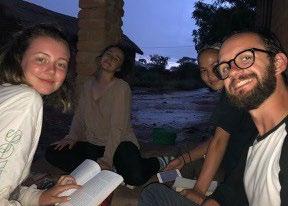
Seniors’ Spotlights are featured in a range of School and alumnae publications and across our social media channels, covering a range of topics such as interesting and diverse careers, charity initiatives, achievements and awards, overcoming challenges, staying resilient and much more – if you would like to feature in the next Seniors Spotlight please do get in touch with the Seniors’ Office.
We would also love to hear from Seniors who would be willing to speak at one of our events, with backgrounds in sustainability, technology, engineering, entrepreneurship, diversity, equality and inclusion, creative arts, and media.

If you have an interesting story to share about your life since Wycombe Abbey, we would love to hear from you.
Do you have an inspiring story to share?
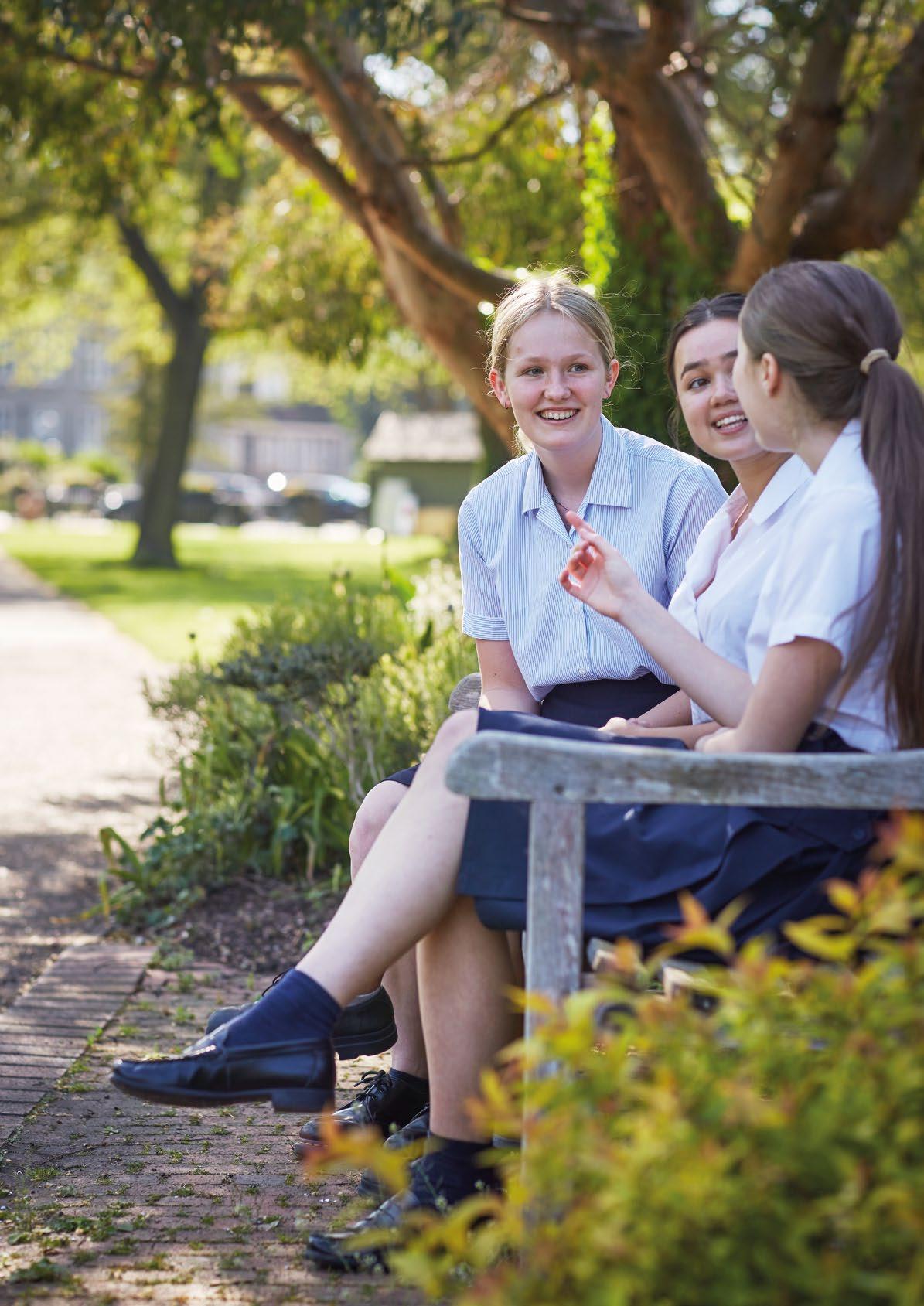
Please note that the publication of content in the following sections does not constitute an endorsement by Wycombe Abbey of any of the products, services or opinions of the individual.

In s eptember 2022 the Wycombe Abbey community paid tribute to her Majesty Queen e lizabeth II. h er legacy will be remembered by all at Wycombe Abbey.
Clare Spring (Thistlethwaite, Class of 1951, Campbell, C77)
King George VI’s death was a huge shock. We knew he was too unwell to tour Australia, but no more than that. Now King Charles III is my fifth monarch. I remember listening in Big School to what I think was HM King Georges’ funeral service.
On the death of her father, we were all gathered together in Big Hall where the Headmistress gave the announcement of the King’s death. I remember exactly where I was sitting on one of the tiers that day in 1952. We are so fortunate to have had our Queen in our lives. I feel she was a mother to everyone. May she rest in peace.
With the death of the Queen, it reminded me of her ascension, 70 years ago. I was a pupil at Wycombe and we were all told to assemble in the chapel… [the Headmistress] stood at the front of the chapel and in a loud voice said, “The King is dead. Long live the Queen!”
Circle 77
Gillian Foster (Fletcher, Class of 1951, Shelburne) There is really very little news of interest but I did go to Holland in May to the Floriad which is an amazing exhibition that happens every ten years and is huge. I only managed about a quarter of it but a train running round the exhibition helped. There were exhibitions from many countries around the world and also the most beautiful enormous greenhouse of flowers and plants.
I am still in touch with Meryl Brand and we had a few days away in Devon and Cornwall which were very enjoyable. I still hear from a few members of Circle 77 and hope the rest are well.
Margaret Hopkinson-Wooley (Twining, Class of 1952, Pitt)
I keep in touch with Dr Merrall Jenkins (née Wilson) who lives in a flat in North Wales. Sadly, her husband is now in a home.
My husband is writing books on the Gospels, under the name Alexander Woolley. He started the first book
two years ago, has written a second and is now on his third. Currently, I am reading through my old diaries, having told our daughter that I was going to get rid of them. She is desperate to have them, even though they are boring! I have managed to read from 1948 to 1976 so far. The early ones feature school days at Wycombe. They certainly bring back memories of Chapel TWICE on Sundays, matches and food and occasionally comments about a teacher.
My best wishes to everyone at Wycombe.
Barbara Phillips (Honour, Class of 1952, Pitt)
I am a Pitt House Wycombe Abbey Senior born in London now living in New York, USA. My thanks to Headmistress Jo Duncan for her announcement Thursday 8 September on the death of Queen Elizabeth II. Queen Elizabeth Alexander Mary (1926-2022) and Philip Duke of Edinburgh (1921-2021) are now together. The New Elizabethan Era (1952-2022) has passed. The current Prime Minister of the UK, Liz Truss, said, “King Charles III’s reign marks a new era of hope and progress, The New Carolean Era”. PM Liz Truss also refers to the “Special Relationship” coined by Winston Churchill (1874-1965) and used to describe the close relationship between the United Kingdom and the United States of America. I am a history buff. I follow the History of the UK and the USA.
My email is bpttuc@gmail.com.
Cherry Aston (Wheeler, Class of 1956, Clarence)
I have moved back to Buckinghamshire to a converted barn, which suits me very well. There are good dog walks and I am a member of various local societies including the Chiltern Arts Society of which I was a founder member. I play bridge with various widowed friends and for holidays go on river cruises.
Joanna Sanders (Harrison, Class of 1956, Airlie) Having joined the over-80 brigade I have handed over various fundraising activities that I used to organise (Christian Aid, MacMillan Coffee Morning etc etc) but I still do a few jobs for the Ely Diocesan Mothers’ Union. I also keep the Balsham Branch running although there are now only 12 members of whom a quarter are 90 or nearly 90! I am Sacristan of Balsham Church which I enjoy but as there are only two services a month it is not a very onerous undertaking. House (very old), garden and dogs keep me busy on a day-to-day basis and I try to read a book a week. The mobile library comes twice a month which I use – though not many people do.
I had hoped to attend the 125 celebrations with Jenny Stott but unfortunately it did not work out. Jenny lives on Anglesey and it was a long way for her to come. My first cousin Jane Phillips (Harrison, C151) was able to attend with her best friend and they had a good time.
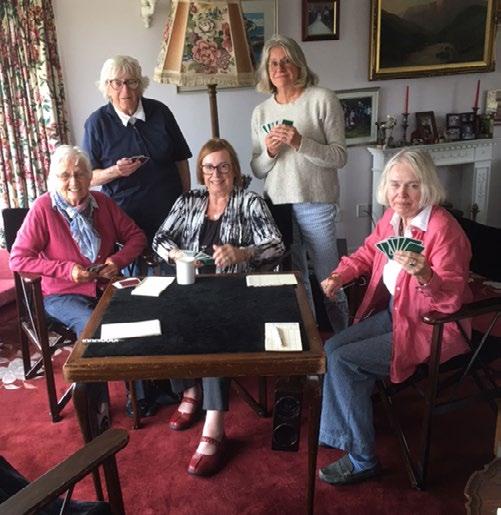
Thompson (Henchley, Class of 1958, Campbell)
David and I were both awarded a CBE in October 2020, presumably for the work being undertaken by The Thompson Family Charitable Trust. In May 2022 I went to the Palace to be presented with both awards by Princess Anne, David having sadly died early last year.

Big School is being renovated by The Thompson Family Charitable Trust which has been set up by myself and David.
One of my racehorses won a very prodigious race at Royal Ascot this year, which was exciting. The photos above show me with Frankie Dettori and my son Richard, and a picture of me just after the Prix de Jacques Marois at Deauville with Inspiral, our filly.

Janet Fluehr (Nicholas, Class of 1953, Shelburne) Living here in Carmel-by-the-Sea, California, which we think is paradise, Wycombe seems a long way off. However, I do think of the song which we used to sing “Forty years on when afar and asunder, parted are those who are singing today. When you look back and forgetfully wonder, what you were like in your work and your play.” Those were wonderful years.

Those pandemic years took precious time from us. Before that time, my husband David and I were very active in leading small groups to fascinating places around the world. Our favourite was Africa, which we have visited almost twenty times! It is never the same –always something different. The animals can teach us a lot. We visited Botswana last November and saw more game than ever! I had planned to retire from the travel business after the pandemic, but one cannot retire. There is so much to see, learn and be grateful for.
Helen Jeffries (Beaver, Class of 1961, Barry) Jenny Daniels arranged a lunch out together with Rosemary Harley (Carroll) and Christine Hunt (Edwards) at a smart pub in her village in May. Lovely to have a ‘catch-up’ – all of us now widows. We first met in Highlands House, Godstowe before going on to Wycombe (two to Barry and two to Cloister).
I was pleased to accept the invitation to the Seniors’ 125 Seniors’ Day Grand Reunion. It was a beautiful day and we were well looked after with excellent refreshments. So much has changed: the modern school with vastly increased numbers, coded entry systems, coffee shop, indoor sports centre etc bear little resemblance to the School I attended back in the ‘50s and ‘60s. With a further new building to house Pitt and Rubens, no pupils sleep in the Abbey. The four Outhouses have no dining rooms and no large dorms – everyone accommodated in smaller rooms, some of which are below ground floor since our day, with the Bootroom full of desks and the house study, a lounge with easy chairs and the room above where we had Evening Prayers incorporated into the Housemistress’ quarters. I never did discover where Matron now lives! The front stairs (generally off limits) seem to be in use all the time!
Only nine of us oldies and one husband, so all seated together on one table for lunch – only two I knew: Sue Cameron and Louise Rhodes. But most interestingly an older Senior who had joined at the time of re-opening after the war and witnessed a Celebration attended by the very first pupil – marking 25 years since the School’s Foundation, providing a real link with history.
Stephanie Prosser (Patmore, Class of 1960,
I had looked forward to 2022. Rhys and I had escaped catching Covid and things looked positive. Then in early January Rhys was admitted into hospital with sepsis. This happened three times in as many months. He came home in May, very much weakened of course. Sadly, after ten days at home, he died peacefully in his sleep. Though not the outcome I would have wanted, it was a blessing because he was in such pain and distress, and I find great comfort in that. My family have been great, and I have continued my busy church work, which I know Rhys would have wanted. As I say, the family have been great, though they are busy with their lives. All are doing well in their various careers and at school.
It has been a very strange time these last couple of years or so. As I write we have a new PM and we can only hope things will improve here in the UK and worldwide.
Julia Drum (Woodgate, Class of 1962, Cloister)
I had my second novel published by Austin Macauley early in 2022. Both Springwell and The Honorary Male were written before my son Nicholas’s haemorrhagic stroke in March 2018 when he was just 49. As a carer, with my husband David, this has completely changed our lives. Nick uses a wheelchair and has lost his speech and all use of his right side. He has regular physio which has helped restore a little movement in his right arm. My husband had already retired, but I was still working running Presentation Skills workshops and coaching individuals to help them achieve their personal and professional goals and keeping my contacts in the BBC where I had been working until 1996 as a Senior Producer in the Education Directorate. I completed my work the morning of his stroke (which happened during dinner that evening) and have passed my clients on to colleagues from my MA in Coaching at Oxford Brooks University; I no longer supervise other coaches. The last years have been challenging but we have good support from the London Borough of Hounslow including some daily visits from Carers. These visits have recently been upgraded to three overnight shifts from 10:00pm to 7:00am to give us some respite as we have both suffered from illness. The only benefit of the lockdowns was that I could read through and adjust sections of The Honorary Male which was then accepted
for publication. I had intended the book to be the first of a series; perhaps that will happen when I have more time. Here’s an idea of the story:
Amanda has disappeared. There has been no news of the English teenager for over a year. Has she followed her dream to join an international ballet company or is there another reason for her silence? A missing persons charity, the Association Searching for Kith and Kin, engages former nurse, Jude Francis, to follow up a possible sighting in Central Asia. The year is 1994. Former Soviet states are in the process of renewal. Two British reconstruction workers help Jude in her quest for the girl. Will the outcome of her journey be what Amanda’s family hope for? And what will be the consequences for the people involved?
More family matters: our daughter, Jessica, is now living in Wales. Her husband found it impossible to get a graphics design job locally so decided to train as an electrician. The lockdown showed up the inadequacies of their children’s schooling. Jess is now a brilliant home educator. She was adopted from Singapore where I was working for Singapore Television, and her heritage has stimulated the elder child, Stella, to learn Chinese and the younger, Theodore, aged 6, demonstrates a talent for Kung Fu, which they both enjoy. Apart from following the National Curriculum they have swimming lessons, do skateboarding and enjoy many more cultural activities than they would in full-time school. Jess’s eldest daughter, Jasmine, has qualified in law and is now working for a large international entertainment group as a paralegal. She lives with us in London and is a terrific support as we age.
I try to keep fit by attending an Aquarobics class and a Silver Swans ballet class when they fit in with my caring duties.
There have been huge changes for many of us this year but we girls who were educated at Wycombe are generally a resilient lot and able to face whatever is thrown at us.
Sue Cameron (Class of 1961, Barry)
Almost no change…
Before I started writing this I looked at the 2021 magazine to remind myself what I had submitted for that. Then I thought about what I have done this year and decided all I had to do was write “Almost no change…”
I have not shed my lockdown lethargy and there are still things waiting to find a home or to be discarded. I am still scribbling every month. I am still wobbling about and certainly not doing any leaping. During the summer we had another series of informal concerts in the garden of a small local hotel.
But there were some changes, more activities to enjoy. There were other concerts in churches, schools and fields. The Sherborne Abbey Festival re-appeared, based mostly in the Abbey, and finished with a lively jazz concert, with food, in a local pub. Dorset Opera was also back this summer with lavish performances in Bryanston’s Coade Theatre of Manon Lescaut and The Magic Flute .
In June we had a ‘Street Party’ to celebrate Queen Elizabeth’s Platinum Jubilee. It was held in the garden of a large house opposite where I live, very well-organised and an opportunity to meet the neighbours as well as to celebrate the Queen’s long reign. Only three months later we were mourning her death. I remembered when I was teaching at Kay Bell’s school in New Zealand and the Queen and Prince Philip visited. I had introduced The Duke of Edinburgh’s Award Scheme (which was extremely popular because it enabled the girls to get out and do different things). A few girls had got their Gold Awards and we were invited to a presentation by the Duke aboard the Royal Yacht. He was on good form so that was fun. Two days later the couple did a walkabout in Havelock North, the village where Woodford House, the School, was and we all lined the main street to wave and cheer. Suddenly Prince Philip recognised the girls he had presented Gold Awards to and said to the Queen “Come and meet these clever girls.” She came and congratulated them and then asked what I did. I said I taught and helped with extra-curricular activities such as the D. of E. She said I didn’t sound like a New Zealander then asked, “What is the most important quality one needs for working with
teenagers?” I replied “A good sense of humour.” She laughed and said she thought that was essential for almost everything… I agreed.
That was a long time ago. Life has changed. I read a lot. Friends have told me I am becoming rather a recluse. The lively contributions from Fiona and Norma make me feel perhaps I am… Happily I still have a good sense of humour.

It was a treat to be included in one of the Goldstone family gatherings where I met up with Trish (aka, at School, Tishoo) Goldstone (Wiseman, Class of 1961, Clarence, C100) and her husband Leon and to be introduced to their adorable first grandchild, Riley Minnie, just a few months old.
I also keep in telephone touch with Bridget Andrews (Steed, Class of 1961, Clarence) and Chris MacLeod (Clarence).
Norma Fraser Reid (Class of 1961, Clarence)
It has been so good to get back to normality in 2022 (well, more or less!) after such a long and tough period of restriction. Zoom ballet and piano lessons are, thankfully, a thing of the past. Holidays and exchanges of visits between friends are back on the agenda. The decade-busting birthdays are under way and I was in Inverness for the first of these in February. In September, Jennie Lubbock (Class of 1960, Shelburne), Josie Taylor (Pitt, Shelburne) and I met in London over three days to celebrate Jennie’s 80th in style. We enjoyed a brilliant performance of Don Quixote at Sadler’s Wells, choreographed by Carlos Acosta. The master did not take part himself but we had the bonus of seeing him in the audience sitting at the end of the row in front of us, clearly delighted with the fruits of his labours. The three of us also had an afternoon at the Hampton Court Flower Festival followed by a tasty dinner at a nearby restaurant, La Fiamma, the rear windows of which overlook Bushy Park.
Apart from all this, I had a second visit to mostly sunny Inverness in August for my birthday and I sailed away with a friend for a week in September on a twicepostponed Mediterranean cruise with Regent Seven Seas. Ports of call included Greece (Athens, Mykonos and Chania), Cephalonia (Angolstoli), Italy (Salerno for Pompeii and Messina for Taormina) and Malta (Valletta). It had all been paid for in 2019 so we were able to enjoy it for ‘free’ and what incredible service we had! It was a small ship, as cruise ships go, with only 750 passengers and 542 international crew (from 46 countries!). An impressive ratio of passengers to crew ensuring equally impressive attention. There was a choice of restaurants and every meal a gastronomic feast, Service with a Smile (the widest smiles I have ever seen) being the order of the voyage. Many of the crew – including the Captain – were Italian and my friend, Liana, being of Italian heritage and bilingual, stole their hearts with the result that we experienced extra special attention! We had a suite with a balcony and a welcome bottle of champagne. People-watching provided ongoing entertainment, not to mention a good few laughs. One such was a character we decided had to be called Onslow as he was the spitting image of Hyacinth Bouquet’s brother-in-law in Keeping Up Appearances
The only drawback to the cruise was the literally thousands of holidaymakers disgorged from other cruise ships far bigger than ours at every port, making, in particular, the experience of wandering around Pompeii and Taormina with its idyllic Greco-Roman amphitheatre, rather different and a little disappointing compared to what I had imagined and hoped for. If only the mass of humanity treading the cobbled streets of Pompeii had been clad in togas... I plan to return off-season, certainly to Taormina, for a short break as there remains much to explore, at leisure. However, on reflection, that was only a minor drawback and the daily excursions provided much to enjoy and lots of newly acquired knowledge from excellent guides about the places we visited.
Fiona Shannon (Walley, Class of 1961, Wendover)
It was my 78th birthday last week – a time for reflection. I found myself musing over all the different jobs I have done in my life since starting work in the early sixties, aged seventeen. With O levels and A levels in the bag and the essential secretarial course completed, I was fortunate to land exciting jobs in the art world and the fashion world. Married at 20, I fitted in working where I could as well as raising three children and organising six different house moves, including one to the USA for three years. I took on the admin for my husband’s management consultancy and accompanied him to conferences abroad. I became a ghost writer for an illustrious lady and helped produce her autobiography. In my forties I trained as an exercise teacher and taught fitness classes until an injured leg put a stop to it. For a couple of years I concentrated on an Open University course but then returned to paid secretarial PA assignments working for several highprofile clients in a freelance capacity. When the last of these ended, I looked around for an amusing new occupation to tackle. I applied to a top agency and was fortunate to be accepted as an ‘extra’ for background parts on film and TV sets.
Call the Midwife was the first series I was to appear in. No hint given as to my role but I must have perfect hair and make-up. I arrived on set at the appointed time, expectant and nervous. The costume department gave me a nightdress and dressing gown to wear. The girls in the make-up department proceeded to wet my hair reducing it to rat’s tails and applied new make-up turning my face a bluish colour with dark grey circles round my eyes. I was to play the part of a patient – and a dying one at that! Later, after a long wait, it transpired there would be no filming that day. We would be paid but could go home. And it was only 2pm! This was my introduction to this crazy world where long waits and changes of schedule happen frequently.
I have appeared in the background in Eastenders a few times. I have worn period costumes for a part in Professor Brainstorm and as an audience member on the set for The Dresser. On that occasion they dished out fake cigarettes and filled the auditorium with smelly fake smoke to simulate the atmosphere as it would have existed in the 1940s. And we were all nearly asphyxiated! I have appeared fleetingly in several movies including On Chesil Beach . For L ady in the Van , where I was a market stallholder, a large number of extras had three costume changes in one day so the director of
that one kept us on our toes. My biggest ‘break’, if I can jokingly call it that, was the series Mr Selfridge where we filmed for long days in a hotel on Park Lane, including an all-night shoot. I wore beautiful period dresses, had a glamorous wig and startling red lipstick. I was even given a small speaking part. I had to glide gracefully towards the main star as he entered the hallway of the hotel and say ”Good evening, Mr Selfridge”. Luckily it was a scene with only two takes!
Working as an extra is all about uncertainties but I liked not knowing where I might be asked to go, what I might be asked to do. I enjoyed meeting new people with early morning exchanges over breakfast and the banter as we tucked into a well-earned lunch where the on-site catering provided delicious food. For one movie a bunch of us rode around on an open top-bus for hours getting utterly soaked in the pouring rain. Another time I had to shout obscenities out of a car window – no miming for that one! The basic pay is not particularly good but on one occasion I received £200 for two hours. The promotion was for L’Oreal entitled ‘Growing Old Disgracefully’. A guy with a hand-held camera filmed me standing on the street in Covent Garden. I was recounting a silly little anecdote – an occasion when I had arranged to meet my husband on the beach in Norfolk. I spotted a familiar figure in the distance and began to enact a cheeky striptease. As he came closer I realised it wasn’t my husband – it was a complete stranger! Looking mildly horrified, he bolted off in the opposite direction. This promotion was a success with thousands of ‘likes’ on YouTube!
We lay low during the pandemic, long walks and reading lots of books. Experimenting with cooking new dishes and tending the garden were restful chores. An online painting course with the Royal Drawing School, renovating a vintage patchwork quilt, completing two needlepoint cushions – these projects kept me focused. I wished I could be needed for Granny duty like so many of my friends but my little granddaughters are in the States so that job was not on offer. Being an extra was such good fun. I do miss it. I might contact the agent now Covid is easing off and ask if they could reinstate me on their list of fit old ladies available for work. It’s tempting!
At the end of March 2020 our daughter Nellie (Barry) with her husband and four children aged 18 months to seven years arrived from London to stay with us. We thought that they would stay until the end of lockdown. They have never left!
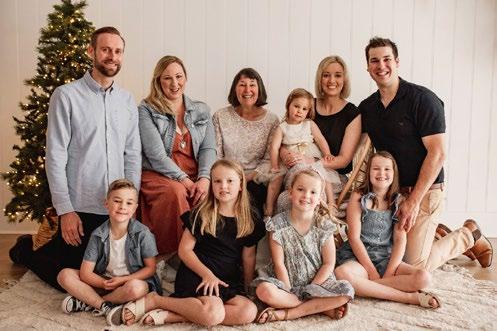
Daniel and I now live in a cottage a few minutes’ walk up the lane and the young family are in the farm house. My parents, Harold and Brenda (Campbell) bought the farm in 1956 and they made it a wonderful home for family, friends and strangers. How delighted they would be to see a third generation enjoying that home. We are extremely fortunate to have our grandchildren minutes away from us and our lives have changed in a way I could not have imagined two years ago! Circle 116
where it was wonderful to feel the warmth and swim in warm blue water after a long and cold Melbourne winter. No plans for a trip to Europe though at the moment.
One of the twins unfortunately was diagnosed with Type 1 Diabetes so we have all been on a very steep learning curve to help her through this really challenging change in her life. Hopefully the amazing progress in research on diabetes will make life easier for her in the future.
Gill Rushton (Class of 1969, Wendover) 2022 seems to have passed in a flash now that life has returned to a degree of normality after the worst of the pandemic. It has been good to see friends and family in person more regularly and to go back to voluntary and leisure activities. However, I am still playing ‘catch-up’ as there are some friends I have yet to see, and some activities (such as my theatre group) have sadly stopped altogether.
I managed a week’s river cruise on the Seine in June – my first holiday anywhere since 2019 – and this was meant to be the start of the ‘post-pandemic’ period for me. But annoyingly I caught Covid on day two! Luckily, I wasn’t too badly affected (thanks of course to the vaccine) and although the timing was unfortunate, it helped me to shed some of the fear of the illness which had built up in the previous two years.
To reward myself for the disappointing holiday, I took myself off to the Basque Country for a few days in September and fortunately that went without incident and was a most interesting area to visit. I particularly enjoyed visiting the thrilling Guggenheim Museum in Bilbao and the wonderful city of Burgos with its spectacular medieval cathedral.
Anne Hutchinson (King, Class of 1969, Rubens)
A photo of my growing family from Christmas 2021. This year has been extremely busy as my son sold his house, I sold my house to my son and my daughter sold her house! All within three weeks. Thankfully I am retired and so was able to cope with the moving, packing and paperwork. I am renting until I can find a suitable house.
Here in Melbourne we suffered through many lockdowns but this year has been better. We have just returned from two weeks in Far North Queensland
Unfortunately, our year group reunion was blighted in the summer for various reasons (including Covid), so it will be especially good to see Wycombe friends again in 2023.
Christina Thomson Jones (Thomson, Class of 1969, Cloister)
What a pity that our year group reunion was not able to take place, but personally good for me as I was unable to attend any of the dates so am hoping next year is a date I can be present for. Covid is still rampaging round, but more quietly and insidiously.
Most of my examining now is online, with the candidates submitting pre-recorded videos. It is called a Performance Grade as there are no practical tests.
I watch the video, but they can’t see me. The newest system suits me well. I can download my own choice of hours, and am given four days to complete the task. I am doing much shorter sessions more regularly. There is no pressure to do more or less, or indeed any at all.
I found the technology so difficult to start with, but now I am enjoying it. I was lucky enough to be given one of the few face-to-face tours this year; in Italy in May and June, Milan and mostly the centre of Rome. It was marvellous in many ways, but the heat was exhausting, and the triple number of tourists there were in Rome made getting around a challenge.
I am hoping for something international next year again, but so many candidates and teachers have moved to the online option that there is not nearly as much work. I have no plans to fully retire yet. How lucky I am to have a career I can still enjoy. Thank you Miss McKendrick!
Elizabeth Breeze (Class of 1969, Rubens)
Strange times still and certainly they were over the winter of 2021-2022. The contributions below include some reflections and reports of activities. Only a few of us are in paid work now and some have suffered bereavements or other difficulties but our interests remain varied and our time at Wycombe a bond between us. We had hoped for a reunion of our year group (those who would have been in then Fourth Form in 1963 and leaving after A levels in 1969, including those who joined later or left earlier). However, we were jinxed as unexpected events led to postponements and now we hope to meet in 2023. A large number of the year are still in touch, even if only occasionally. Hopefully next year we can catch up with more of each other’s news in person.
We used to say we live in Vauxhall. We are now in Nine Elms. It’s been riveting over the past ten years to watch
the area develop from industrial wasteland to a lively, if not remotely beautiful, new area of London. Our sanity is that although we have only five windows, all face directly onto the Thames: we have a lot of sky and noise comes mainly from geese and waves. So we have been sanguine about the developments.
First it was fascinating watching the American Embassy being built. We attended the quarterly meetings there as they explained to local residents the process – and sent Christmas hampers! A large Waitrose appearing literally across the road has been a joy. Pretty ugly high-rise apartment blocks have popped up everywhere – with the promise of a park opening soon. Tunnels under the railway have opened up, creating artistic spaces and linking areas before cut off.
And this year Nine Elms became a Ward of Wandsworth. We have our own local councillors and a Ward policeman! The latter feels especially important to us. Part of the fun and games of living opposite the Embassy is that we get regular demonstrations. And, of course, security is ever a concern. Establishing a strong working relationship with the police has made an enormous difference. I have driven that effort and have been asked to chair the new local Ward Police meetings which I really believe will help us as a community.
Another community which has popped up five minutes’ walk away is Battersea Power Station. Again, we have attended nearly all the residents’ meetings. We had a special invitation for the Jubilee celebrations and are hoping for another for the grand opening this year. We take visitors there to show it off. They really have made a terrific effort to create a sense of community and a vibrant way of life. It’s been fun to watch and to add our penny’s worth.
When we moved here ten years ago, we thought we had to give up knowing and helping our neighbours. It is nothing like the country way of living our friends have. But we have grown with the community as it has grown. Family and friends live near or come to stay. Nine Elms is working for us.
Pippa Barnsley (Riley, Class of 1969, Airlie)
My husband and I live near the Welsh border so enjoy excursions into Wales. We are lucky to have a historic kitchen garden, recorded in 1872, which at the time of writing is abounding with apples, plums and damsons.
Victoria Granville-Baxter (Granville, Class of 1969, Campbell)
I’m coming to the end of my four-year term on Sevenoaks Town Council. I stood in 2019 as a Lib Dem in support of our common belief in the EU following the Brexit vote. At local level there is also much to do, and this year we consolidated the green agenda for the Council, among other things. My focus is on community spaces and revisiting the future for the town centre. Planning policy goes back and forth and I’m pleased that with a council split 50/50 Conservative and LibDem, and also 50/50 women and men we are able to find the common ground and get a lot done. I’m still thinking about another four-year term, if elected of course. It’s been a privilege and one never stops learning.
A highlight this year was visiting Wycombe for Seniors’ Day in June, the first time I’d been back since leaving after O levels to go to a crammer before university. It felt delightfully safe, though I was interested in the opinion of my companion for the day, a retired head of a very large state school in Kent. The facilities at Wycombe are dazzling compared with the state sector, and I needed reminding what an extraordinary advantage a wellfunded education has afforded us fortunate few.
I continue to curate exhibitions in Sevenoaks, this year for a brilliant photographer and economic geographer, and am planning a (memorial) exhibition for one of my most admired civic architects. I always was inspired by excellence.
Pippa Baxter (Walker, Class of 1969, Wendover)
Now that Covid travel restrictions have eased, the past twelve months have seen an eruption of long-delayed trips and visits... and, in my case, sadly a lot more carbon damage to the planet. Trips to the weddings of a godson (in Malaga), a niece (in Bucharest) and a nephew (near Milan), plus a trip to California to see my very unwell brother have all been memorable, despite the guilt. And now husband Peter and I are off sailing for two weeks in the Ionian islands – a real holiday this time. Many trees yet to be planted.
When at home, I am still working as a company director – executive director in two companies and a non-executive in a wooden-boat-building business near my home on the Isle of Wight. And sailing, tennis and golf still get a look-in too. Perhaps fortunately, unlike so many of my contemporaries, I am not also called out for Granny duty. Angus, my stepson, is 25 and still a student, so hopefully he won’t require that kind of support for some years to come.
Catriona Brown (MacLeod, Class of 1970, Wendover)
This has been another strange year. I am writing this in mid-August, when so much of the world is affected by war and drought. We feel lucky to be in Scotland (where it happens to be raining at the moment), where it feels pretty safe, and where everything still looks green.
This spring and summer Robert and I have been quite actively involved in helping some of the refugees who have come out of Ukraine to Scotland. Their situations are all very different, but in general their ability to cope with uncertainty has amazed me. I wonder how we would have managed.
Initially Robert was involved in looking after a large group of orphans and their guardians, who spent a few weeks in Callander before moving to longer-term accommodation in Edinburgh. More recently we have been involved in helping individual Ukrainian families settle in our local area. Because he speaks Russian, and has worked in a number of the former Soviet Bloc countries, Robert is able to bridge some of the language and culture gaps between hosts and their guests.
I have huge respect for the hosts, who have taken a very bold step into the unknown by inviting strangers into their lives. It is not easy, and the amount of goodwill and generosity shown by so many people has been really impressive. We don’t have a family staying with us, but have helped out during some short-term emergencies. On those occasions I have been very aware how difficult it can be for the parties to communicate. Using Google Translate is a help, but it is still very awkward.
Who knows what will be happening in Ukraine by the time this report is published, but I suspect that the war there will still be going on, the situation of the refugees in the UK will still be very difficult, and their short and long-term prospects very uncertain.
Jenny Garland (Class of 1970, Barry)
After the last two years, it has been a pleasure to get back into the habit of foreign travel. Different countries’ Covid policies at different times made planning a bit troublesome, but in general I have found airports,
airlines and even baggage-handling much better than the dire warnings in the media would have one believe. Perhaps I’ve just been lucky.
In the spring, I went to the South of France, where it was bitterly cold, but this did not detract from the numerous places of interest to visit (especially indoors). In early summer I went to the English–Scottish border region, where there is a great deal to see and enjoy, including (for someone from London) a wonderful feeling of space. Later in the summer, when it had become rather too hot here, I went to Stockholm which was cooler and offered a wide range of landscape, museums and country houses, plus excellent meatballs.
Apart from my sister Anne Gray (Garland, C125), I have also seen Anthea Cowley (Bazin) and Anne-Marie Huxstep (Mallik) – both of this Circle.
Penny
I was disappointed not to make Seniors’ Day as we were going to belatedly celebrate 50 Years On! I had a family gathering in Scotland in June so none of our Year actually materialised at School.

I had made contact with a few of our ‘71 Leavers –Pippa Manson, Jenny Weatherhead, Anne Wilson (Ruston), Barbara Steadman-Allen and Tricia Sturgeon (Jenkinson) – so it was great to be in touch again!
We did have a Butler Zoom catch up with Michelle Jarvie (Green), Sarah Holt, Judy Nicholson and Ottilie Sefton last year and we were hoping to meet up in London this autumn.
I have just had an exciting time at Bedford! In 1974 I received a Cert Ed from Bedford PE College and 50 years on about 400 Old Students have just been back to College for a Degree Ceremony. They have updated our qualifications to a BA (Hons). In fact, I got my BSc and MA(Ed) from the Open University, so I sound quite well qualified now at 69! I contacted Sue Farr (staff), Jo Dorey (Sheepshanks) and Jane Martindale (staff) but they were not able to get to Bedford for the ceremony.

Pamela Griffiths (Class of 1972, Campbell, C124) A Campbell reunion – Class of 1972: Susan Day (Powell), Caroline Hemphill (McMullen), Sue Bennett (Herald) and Pamela Griffiths – gathered in London to reminisce and drink champagne!
 Kent (Bevan, Class of 1971, Butler)
Kent (Bevan, Class of 1971, Butler)
The Forty Years On song was on my mind as 22 of the Class of 1982 gathered together on the morning of the bigger Seniors’ event. It was absolutely wonderful to see a mix of us who had not seen each other for 10, 20, 30 and even 40 years. The day sped past with a lot of reminiscing, everyone remembering different funny stories to jog each others’ memories. After a lunch with the wider group of Seniors, we also had the chance to visit our old Houses and dormitories. A few of us walked up Daws Hill, which actually seemed a shorter and easier walk than I remembered. It was also a bonus to catch up with a few people from our Houses from other years and a few teachers (Jo Wilmott and Jane Martindale who both have amazing memory for names
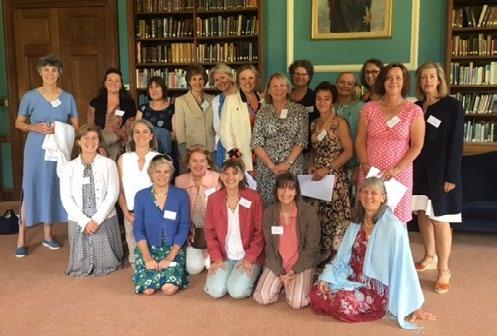
among the thousands they have taught). A few photos to capture the morning, as well as the words of the Forty Years On song, as I suddenly noticed a stack of the red hymn books on the Fisher Library shelf. One photo of the Junior House intake of 1975 – five of us were at the reunion this year – Pippa Trethowan, Lucy Regis, Jenny Muggleton, Caro Francis and me.
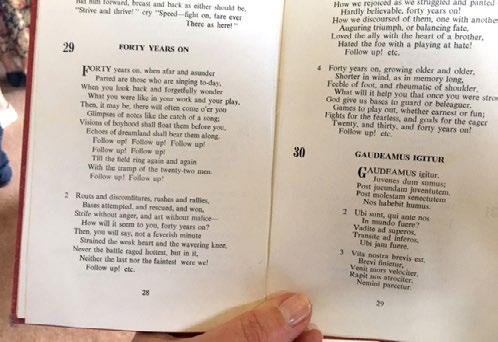
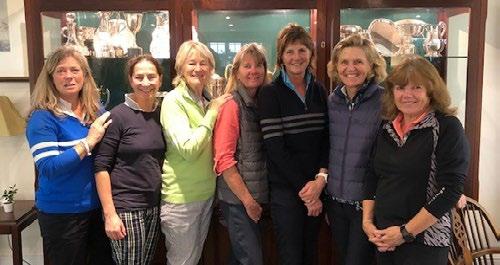
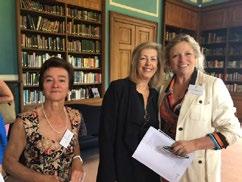
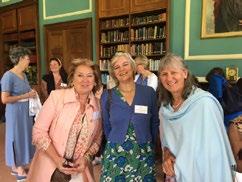
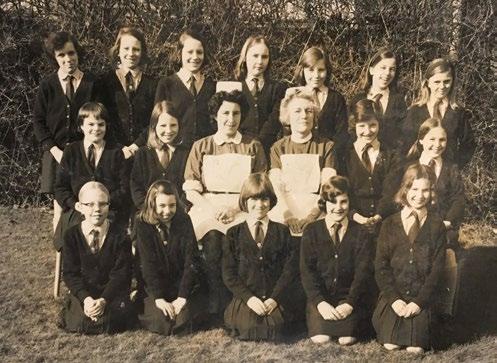
This year, we entered two teams into the prestigious Silver Tassie Golf Competition competing in a field of 24 teams at the Berkshire Golf Club (all teams are made up of alumnae from other schools). Although we didn’t come away with any silverware we can still hold our heads up with some pride as we came in the top eight in both the scratch and stableford competitions. It was a really fun day with some great golf, a delicious lunch and some hilarious stories – it was fun to catch up and play some pretty respectable golf. We last won the trophy in 2016.
This year our teams comprised:
Hilary Wynter (Ohlson, Class of 1976, Butler)
Penny Cullis (Mudd, Class of 1974, Barry)
Penny Kent (Bevan, Class of 1971, Butler)
Rebecca Lawes (Youngman, Class of 1983, Shelburne)
Kate Rowe (Donald, Class of 1974, Campbell)
Jo Chatwin (Edwards, Class of 1983, Shelburne)
Juliet Turner (Francis, Class of 1986, Pitt)
Sue Bennett (Herald, Class of 1972)
Reserve: Gillian Fee (Ballard, Class of 1972, Cloister)
More recently we have held an informal Wycombe Abbey Seniors golf day, also at The Berkshire Golf Club where we played a Texas Scramble and then had tea afterwards. Hopefully this will become an annual event.

If you’re a golfer and you’d like to be involved in Seniors golf events please do get in touch with me (jo.chatwin@virgin.net – 07860 781136). We currently have about 20 people on the email list with handicaps ranging from 7 to 36 so are happy to include anyone who is keen to participate – it’s more about the fun of getting together (we also had five dogs with us on the golf day!).
Venetia Ellvers (Browne, Class of 1998, Pitt) I’m currently taking a break from the corporate world, having worked in the spirits industry for the last 17 years. While I work out my next move, I’m working with my husband in his business (Orbius), making bespoke kitchens and cabinetry, so a bit of a departure, and a huge relief, from spending eight hours a day in front of a laptop. Otherwise, our three children are keeping me grounded and busy out in the Hampshire countryside. As for staying in touch with other Seniors, I caught up with Jo Cable (Simpson), Alice Lochore (Hawkes) and Camilla Benfield earlier in the summer to belatedly celebrate Jo’s 40th and last week we spent a wonderful day on the beach with Alice Lochore (Hawkes) and Catriona Golden (Browne) and their respective children. It’s not often that I see them but always such a pleasure when I do.
Joanna Cable (Simpson, Class of 1998, Airlie)
After medicine at Cambridge and UCL I trained to be an anaesthetist and am now a consultant at Colchester Hospital. I have a long-suffering non-medic husband, Matt, two awesome daughters, Emma and Alice who are 11 and 7 and we live in the lovely Suffolk countryside. I still love sport and run/cycle/play tennis when I can. I also still hang out with Alice Hawkes who lives nearby.
Alanna Clear (Boylan, Class of 1998, Rubens)
During lockdown, my husband, my two boys and I left East London after 15 happy years to move to Oxford where he grew up. It’s been a great move and I’ve started a new role as CMO of a health and wellness start-up, Added Health, set up by a professor of primary care at Oxford University. I still see lots of my Wycombe friends and my boys have a collection of Wycombe Abbey godmothers. This summer, the doorbell rang and I opened it to Miss Willmott, announcing “I was at Wycombe!” before she could speak, which took her by surprise. Turns out we’re just round the corner from each other. The force of the Wycombe Abbey network remains strong!
Rachael Newton (Mills, Class of 1998, Rubens) We left the UK in 2017 to move to Canada and I launched my business there in 2019. I created the nixit menstrual cup (nixit.com) – which is a revolutionary disc-style menstrual cup. We are sold around the world, but mainly in North America in retailers like Whole Foods. It’s been a fantastic learning curve and I’m thoroughly enjoying it. We escaped to the Cayman Islands during Covid and now live here permanently. Our two children, Dexter and Quinn, have adapted well to island life and are now better at snorkeling and swimming than I am! Due to my location, I tend to see old Wycombe friends on FaceTime mostly!
Circle 240

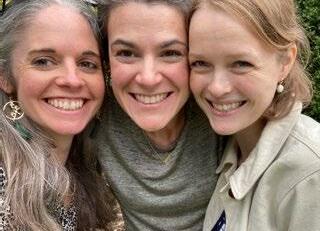
There have been a lot of occasions for Wycombe gatherings this year, now that social distancing has eased. A few of the 2003 leavers gathered at Wycombe in June for the Seniors’ Day and had a great time catching up and revisiting our old Houses. It was lovely to meet some of the current girls and see that the Houses still had lots of familiar things from 20 years ago, including our names on the walls, photos, and even an old cloak, lost many years ago! I always come away from seeing Wycombe friends with a feeling of going back home, of familiarity and security, and it is wonderful to reflect on our friendships over the years and where they grew from.
I still see my mum (Jennifer Young, C109) a lot, as my parents are living back in North Wales now. I will soon be starting work at Somerville College, Oxford, and will enjoy meeting some former Wycombe girls who may be studying there. Otherwise, I’m still counselling and filling my time with Samaritans in Oxford. The Butler girls still meet for regular brunches and it has been lovely to spend time with school friends and their families now that we can. Hopefully there will be many more to come!
Kate Paul (Badenoch, Class of 2005, Pitt)

My husband, Mr Alistair Paul, and I got married at St John’s Wood Church in London on Saturday 9 April. My sister, Charlotte Badenoch (also a Wycombe Senior) was my bridesmaid and in attendance were three other Seniors – Helen Spodeous, Hanah Burgess and Susie Dart. We all partied until the early hours at Hawksmoor and had the most wonderful time!

Melissa Swift (Bradley, Class of 2010, Airlie)
My husband Doug and I were married in May at St James’s, Piccadilly with close to a dozen Seniors in attendance who enthusiastically sung their way through Jerusalem and other familiar hymns from our School days. Special mention to Cesi Bosch who flew over from New York to give one of the readings and to Geeta Bellis (Mahtani), Georgie Harman (Green) and Laura Profumo who kindly organised a very memorable pre-wedding hen celebration. It’s hard to believe we’re edging close to the 20-year mark since meeting in Junior House!

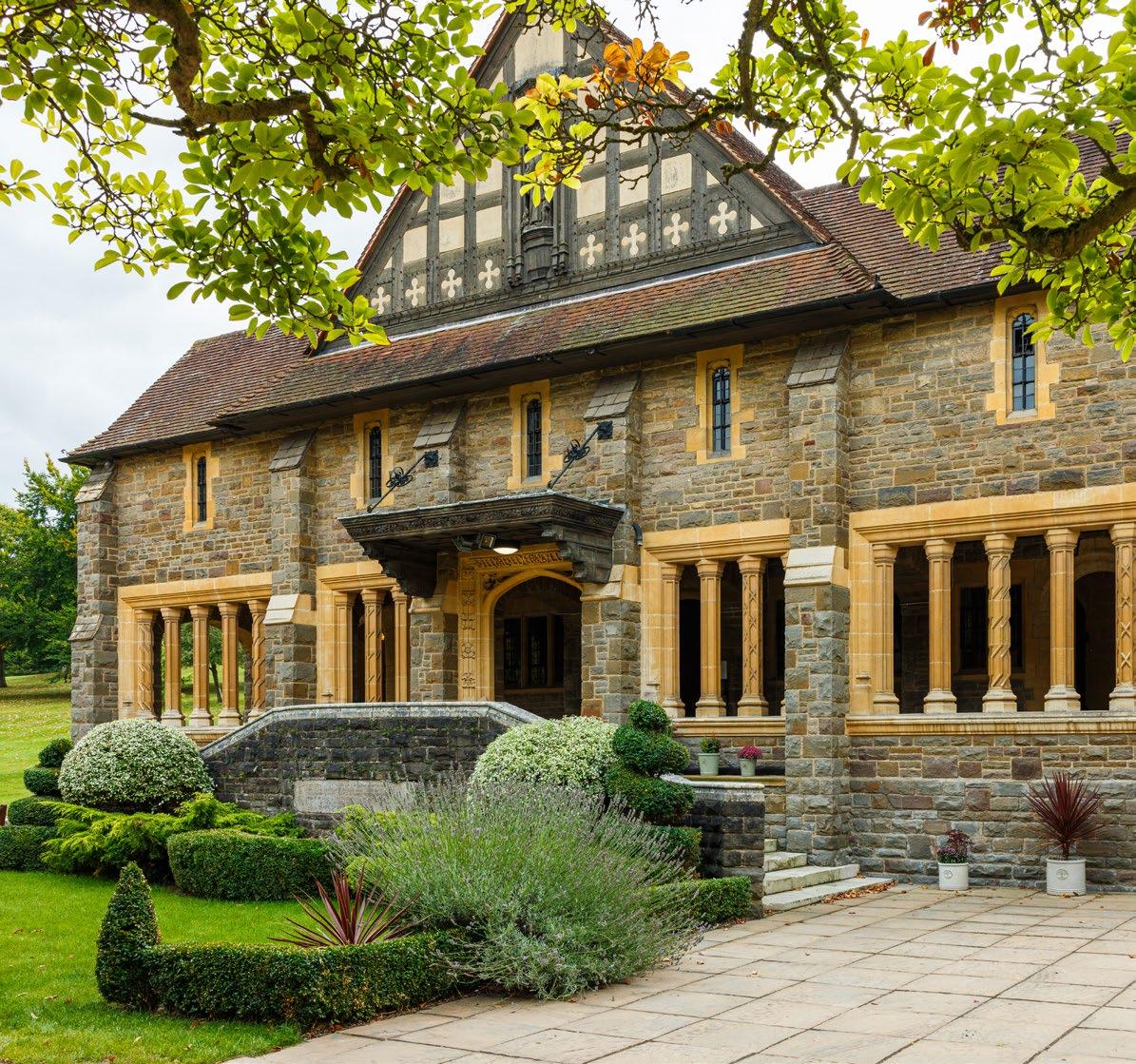
l alage Bown
Class of 1944, Butler, C70 1 April 1927 – 17 December 2021
Janet Cox
Williams, Class of 1956, Airlie, C88 8 September 1938 – 14 February 2022
Gillian Fagan
Barnes, Class of 1951, Cloister, C78 22 June 1934 – 25 December 2021
e lizabeth (liz) l ady l azarus
Class of 1942, Cloister, C70 18 June 1927 – 4 November 2022
Patricia Owen
Gartside, Class of 1953, Barry, C81 5 October 1935 – 11 October 2022
Alison Russell-Jones
Smith, Class of 1939, Shelburne, C64 1 January 1922 – 14 July 2022
Winifred s axby Whitehouse, Class of 1942, Campbell, C68 22 November 1924 – 18 February 2022
Patricia s hires Dawson, Class of 1944, Cloister, C70 08 July 1927 – 22 March 2022
Rita stammers

Tozer, Class of 1944, Rubens, C70 2 December 1945 – 2022
was born on 7 April 1942. s he won a Middlesex s cholarship to Wycombe Abbey and was a pupil from s eptember 1954 until she left s chool in 1958.
She had been a long-standing member of the Movement for the Ordination of Women and was ordained priest in the Anglican Church on 16 April 1994. On 17 September 1994 she was inducted to the prebend of Willesden and was the first woman to become a prebendary at St Paul’s Cathedral.
Madeleine retired in the year 2000 but continued to do voluntary work and worked as a lay observer for the Home Office.
After a long illness, Madeleine died peacefully at home on 19 January 2022.
d avid Wheeler
Madeleine’s brother-in-law
the Reverend Prebendary Madeleine Wheeler (l amsley, Class of 1960, Wendover, C96) 1942 – 2022


Catherine may foremost be remembered for the Archer Recital h all that was made possible by the generosity of her and her husband, Ronnie. A plaque by the hall says, “Ronnie was a Wykehamist who always held that the best thing that happened to him was to marry into a family of so many well-educated Wycombe women.” Improving the education of girls was a lifelong passion and Wycombe was in her blood – she was daughter, sister, mother and aunt to Wycombe s eniors.
Many of you will have met her without even realising it, as for 33 years she was a member of Council, always keen to talk to the girls and staff. She fulfilled multiple roles and led numerous committees. She was a great advocate for providing bursaries, broadening opportunities, improving facilities and listening. She became a good friend to a number of Headmistresses who have commented on her wisdom, encouragement and ability to provide clarity in difficult situations. Staff remember her for the positive and personal letters she wrote following her regular visits to the School.
It was in 1947, aged 13, that she followed in her mother’s footsteps to Wycombe. The School had only just reopened following the war and life was cold and spartan, but she loved her time in Barry, developed lifelong friends and her interest in music and languages. She moved on to Trinity College Dublin to study French and Italian – probably quite an exotic option at the time. Her education certainly provided her with confidence and adventure: as a young adult she rode her pony from home to Oxford and back, all 140 miles of it armed with no more than a small rucksack and map, navigating the bridleways and finding places for them both to sleep each night.
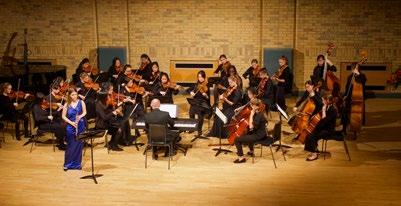
Following university she worked in the Design Centre in London, a job she really enjoyed. It was at this time that she met Ronnie. With four young children under six, they decamped to India for four years to enable him to pursue his career with Unilever, then returning to the village of her childhood for the rest of her life.
How my Mum found family time alongside all her other roles I will never know. Our dining room table was a sea of papers and organisation. Important causes were never theoretical, they were personal and practical. Her sense of justice led to her becoming a magistrate and chair of the expanding bench, as well as visiting prisoners; her love of all
things horsey resulted in her running the Pony Club and receiving a national award for her commitment; her Christian faith gave her hope and a genuine interest in everyone, with loving your neighbour meaning delivering Meals on Wheels. She had a strong sense of duty, thought laterally and pondered deeply, but there is also no way she would enjoy being written up as a paragon of virtue.
Beyond the privilege of Wycombe her passion for the power of education extended to supporting the village school, Dalit children in India, rural communities in Uganda and drug rehabilitation. She had the unusual quality of having equal interest in the granting of a few pounds to a student at the local college needing a new coat as to the rather larger sums of supporting Wycombe and hundreds of charities with The Archer Trust.
Her commitment to all organisations regularly lasted for decades. She was able to combine high-powered leadership roles and worldwide ventures alongside organising carol singing around the village and Easter egg hunts at home. She naturally took on the role of family matriarch and was always doing – walking with her dogs, riding, tennis, sailing, gardening, travelling, sharing articles from the Times, writing doggerel, cooking, catching up with friends, attending lectures, singing in choirs and playing bridge. You may not know that she was invited to become a spy for MI6, a role she declined – apparently!
She gave a lot to Wycombe, and the School gave equally back to her. It is touching that, aged 87, she had been on the phone to the school office the day that she died – a sudden but peaceful and independent passing – just as she would have liked. She lived life following one of her favourite quotes from the Bible: “to do justly, love mercy and walk humbly with your God.”
Mary Briggs (Archer, Class of 1984, Barry, C156)Our mother was a Wycombe girl through and through – having been among the first intake to return to the s chool following World War II, during which time it had been given over to the Americans as a base. I remember her telling us that the squash courts had been used as a temporary mortuary for American servicemen killed in action. With all the privations brought about by the war, as well as having herself been evacuated – and in that process separated (initially at least) from her sister, Mary – this was a stoic generation with no time for homesickness: a ‘get on and make the most of it’ mentality prevailed, especially in the early post-war years when rationing was still very much in evidence.
Elspeth’s connection with Wycombe Abbey continued for over 70 years throughout her life in various guises, first obviously as a pupil, from 1946 to 1950, then from 1968 to 1990 as a Governor of the School. She was delighted when my sister, Cary, and I joined the school community as pupils and we certainly remember the days of School Council Meetings as being highlights of our own time there, when a supply of ‘tuck’ would usually accompany her attendances at these meetings as a governor. While she was at Wycombe herself, the School’s support for the Peckham Settlement was prominent and this remained an active interest of hers: she became the Settlement’s President in 1976 until it was wound up relatively recently. She was also President of the Seniors’ Association for many years and remained a Trustee of the Wycombe Abbey Foundation and a member of the Dove Bowerman Society until her death.
Elspeth, regarded by then as something of ‘a handful’ at Bath High School, had been sent to Wycombe so she was determined to make the most of it. Her attendance there was funded through an educational trust set up by her grandfather; incredibly, family records show that an advancement then from that trust to cover the fees each term was a mere £50!
After School, she went to secretarial college and then to her first job, working for a magazine called Country Fair. After that she moved on to work for the Principal of the Architectural Association until she had her children, my older sister, Cary, and four years later ‘the twins’, my brother Alec and myself.
Elspeth very soon settled into life at Wycombe, going there a year ahead of her sister, Mary Shand (Stirling), even though she was younger. Initially, Elspeth went to Wendover House having arrived in the Summer Term, but the following year she was moved into Cloister House and she quickly formed a group of wonderful friends, among which were a ‘gang of eight’, many of whom she remained close friends with throughout her life. They were from different years and backgrounds, and evidently spent much time in the ‘linen cupboard’ putting the world to rights: Jenny Hill (Brickman), Margaret Blackburn (Kivell), Rosemary Blackhurst, Pat Jackson, Anne Whitehead, Mary Brock (Vanstone) and Kay Seymour (Huffner). Kay recalls Elspeth being determined and somehow ‘driven’ even then, but also messy – a trait which was to continue throughout her life. The redoubtable Miss Lorna Flint used to ask her whether a spider had crawled across the page of her exercise book, or whether she had collected a twig on her way up Daws Hill, to write her essays with – such was her despair at the presentation of Elspeth’s otherwise passable work! However, Lorna Flint became a long-time family friend when they became reacquainted in later life – especially when our parents moved close to Stratford upon Avon, where Lorna had retired to revel in the Shakespearian history and work she devoted so much of her life to – and had certainly inspired our mother’s love of the Bard’s’ popular plays – something I’m afraid neither Cary nor I shared, much to our mother’s dismay!
It is an irony that when Cary and I went to Wycombe, Mum had requested we be in Barry House (where her sister Mary had been) because it had been the best House

at games during her time there. The reverse however applied during our own time – when Cloister was constantly winning the House Shield! Elspeth particularly revelled in games lessons and played regular matches at Wycombe, especially excelling at Cricket, becoming School Cricket Captain and eventually Head of House as well –but not, as far as we are aware, Head Girl, as was widely reported in several of the press obituary columns written about her. We have been amused to find some of her first letters home, from which it is clear she knew exactly what she wanted – and also how the age-old ‘explaining away’ of exam results to parents is a repetitive cycle!
Elspeth’s religious faith became a stronger feature at Wycombe, where she was baptised and confirmed at the same time – choosing Eve Keatley, another friend, to be her godmother. That faith was an important thread throughout her life and was a foundation for our own upbringing, without it ever being forced in any way and probably more evident to us from Mum leading by example, becoming increasingly involved with ‘giving back’ to the community as her life unfolded, embracing every opportunity which came her way to do this.
In 1953, aged 21, Elspeth married our father, Geoffrey Howe, a barrister and Welshman. Thereby began a constant, loving and mutually supportive relationship lasting 63 years until his death in 2015. He was already very politically active by the time of their marriage and she became involved in many of these aspects of his life and was an early member of the Conservative Bow Group Association. She benefitted from invaluable assistance during our early years from her mother Sybil Shand (backed by au-pairs) to embark on her own active public life, chiefly interested in the roles of women and the impact this had on their young, starting as Vice Chair of the Conservative London Area Women’s Advisory Committee and expanding her portfolio to a huge number of other organisations with which she became involved. To name but a few: the Briggs Committee on Nursing, the Parole Board, Lord Chancellor’s Advisory Committee of Appointment of Magistrates for Inner London, Deputy Chair of the Equal Opportunities Commission, and so on. And yet, somehow, she always managed to be omnipresent at home as well during our formative years
and later, whenever we were home on holiday from our respective boarding schools.
During this time she also supported our father immensely through his increasingly prominent political career and, unbelievably, during the busiest of those tenures for him: as Chancellor of the Exchequer and Foreign Secretary, having given up the Deputy Chair of the Equal Opportunities Commission (but nonetheless still involved with numerous other organisations which took up her time), Elspeth took the opportunity to embark upon higher education herself – and so started a successful degree course in Social Science and Administration at the LSE. Her drive and determination were never more evident than then, I believe.
Another of the reasons for Elspeth’s early involvement in committees and public bodies stemmed from her work as a Justice of the Peace when she chaired an Inner London Juvenile Court from 1970 to 1990. She recognised very early on how many of the young offenders who appeared before her had little option but to pursue this path, so she was determined to try and address the issue of poor education and background deficiencies exacerbating this fact. This work, as well as her involvement with various aspects of our father’s life, fostered her interest or enrolment in organisations or movements focused on improving early years and closing the gender gap when it came to opportunities for employment, with particular emphasis on breaking through the ‘glass ceiling’ preventing women from rising to the top jobs within their organisations.
Elspeth became a Life Peer in 2001, following Geoffrey into the House of Lords. She was one of the most active and ‘present’ peers before she retired from the House of Lords aged 88 during the Covid pandemic in June 2020. In that capacity, she was regularly approached due to her wide experience in so many walks of life by this stage, to promote matters also close to her own heart through that elevation. Debates she contributed to or launched generally involved issues concerning women, the law, crime and punishment, the environment and, because of her Chairmanship of the Broadcasting Standards Commission and Council, ensuring reasonable standards in output of
viewing material – particularly where it could impact adversely on children. Latterly, her greatest contribution was through the introduction of her Private Members’ bill: initially called the Online Safety Bill, but which is now proceeding through Parliament as the Online Harms Bill –designed to target the interactive community where it can impact adversely on the young or vulnerable, to make the service providers of such sites both culpable and responsible for monitoring their output effectively to prevent such harms.
Our mother always enjoyed entertaining and the company of young people, especially in her later years drawing great energy from their ideas and listening to their viewpoints. She loved spending leisure time with the family and seeing us and her four grandchildren and four great-grandchildren. She is deeply missed by us all, but we are comforted by the fact we have a great deal to be proud of.
During the final quarter of last century, Elspeth’s increasing awareness as a modern feminist of the lack of opportunities for advancement in employment for women, and her involvement in targeting this area – culminating in the launch of the Opportunity 2000 initiative and beyond – has, we hope, contributed significantly to the ability for girls emerging from educational establishments – including Wycombe Abbey – to have a much greater chance of pursuing successful careers, offering a wealth of options for them to rise to the top.
Amanda Glanvill (howe, Class of 1977, Barry, C134) and Cary Ralph (howe, Class of 1974, Barry, C127)
elizabeth Jane Walker ( l ow) died on 24 March 2022 in Kingston h ospital. Although the death was unexpected it followed a period of ill health.


Elizabeth was born in Edinburgh on 22 April 1954. She was the eldest daughter of Norman and Pamela Low and had three siblings: Hattie, Judy and Simon. The family moved to Sleaford and settled in Leicester. Elizabeth studied at Portland House and Wycombe Abbey before earning a place to read Classics at Lady Margaret Hall, Oxford. She moved to London to qualify as a solicitor. Having obtained a LLM from Leicester University in Welfare Law, she subsequently dedicated her career to helping others as a debt and homelessness adviser. She married Martin Walker and raised two sons: Nicholas and Timothy who survive her. Although the marriage did not last, they all remained on close terms. Throughout her life, my mother greatly enjoyed singing and reading. In her later years she also discovered the joys of long distance walking. My mother died peacefully, with dignity and surrounded by her family. Her intelligence, humour and fierce tender-heartedness will be missed by those who knew her.
n icholas Walker Sone lizabeth Jane Walker ( l ow, Class of 1972, s helburne, C123)
susanne was born in leeds in October 1944, as an evacuee, to her Jewish parents. they had met sheltering from the Blitz in london’s underground and her mother returned with her in 1947 to their North London flat.
While attending Henrietta Barnet School she was encouraged to try for the Middlesex Award and success led her to Wycombe Abbey from 13 to 18 years old. Susanne’s time here steered the course of the rest of her life. Her English teacher (Miss Flint) noticed and nurtured her writing ability, a music teacher opened the door to her singing and the friendships she made here were lifelong.
Joan Gilbert (McKenzie) remembers Susanne’s or Wuz’s (her nickname) reputation as ‘brainy’ and ‘musical’ and says “she was a remarkable person whom I feel so lucky to have had in my life.”
Christina Harris (Falle), although a couple of years younger, said Susanne became a motherly influence on her at school and took her under her wing. Their precious friendship remained constant throughout their lives with both families growing up together and still to this day their girlhood bond ties them together. Christina (Stina) said Wycombe was a haven for Susanne.
Susanne went on to read English at St Anne’s College, Oxford from 1964 to 1967. It was while at St Anne’s that Susanne met Cliff who was studying Physics at St Catherine’s College. They married in March 1969 and their son Antony was born in 1971, followed by Nadine in 1974.

English provided a foundation for her later interests in both psychology and astrology. As she once quoted, “The works of Chaucer, Shakespeare and Goethe are thickly strewn with references to psychology and astrology.” When Cliff and Susy, in the late 1970s, joined a community allotment as their belief in chemical-free food, nutrition and alternative medicine was beginning to grow, Susy met the wise head gardener there who sparked what would become her defining passion, astrology.

There is barely a person who eluded her astrological insights: either they commissioned a full horoscope or as they crossed her path, she would provide ad hoc snippets of highly astute astrological perceptions. Susanne was regularly called upon to give her astrological opinion, particularly as interviews or appointments loomed such as recent GCSEs and A levels for her grandchildren. She even provided a 40th-birthday horoscope for Radio 4’s Woman’s Hour and got invited on air to interpret it. She always cherished this six-minute slot.
In 1974 Cliff and Susy moved to Wimborne, Dorset where Cliff had gained a Head of Department post at the local school, and it was this town that became the centre of their lives for the next 46 years and where Cliff still lives today. It was here that Susanne was able to use her training and pursue her much loved hobbies. As a qualified English teacher, she worked for Dorset County Council teaching children who either couldn’t or wouldn’t attend school, some of whom remained part of her life up until her death, she coached English GCSE and A level again right up until the end and only retired from A level English examining in 2012.
While attending secondary school the music master noted what a beautiful alto singing voice Susanne had and encouraged her to have lessons. Singing became a huge part of her life and she had lessons right into her 30s, encouraged her daughter to take up singing and together they joined choirs. Susanne sang in small local choirs and also much larger ones such as the Bournemouth Symphony Chorus. She travelled the length and breadth of Dorset to sing in a choir that brought her joy and would trek the country or abroad to perform in their concerts. In the last six years her singing and a return to her Jewish roots united when she joined a local small
synagogue and quickly became one of their most valued singers. This was a new and difficult journey, to sing almost entirely in Hebrew, but a challenge she relished.
Above all Susanne was an avid communicator. She chose hobbies and jobs that involved lots of contact with a wide variety of people. She kept in touch with friends and teachers from her past at primary school, Wycombe Abbey and St Anne’s and those she met over the decades.

Her funeral was so well attended by people from all parts of her life and also watched by friends worldwide who couldn’t be with us.
Susanne is survived by her husband Cliff, son Antony, daughter Nadine, her six grandchildren, her sister, nieces and nephew.
n adine Williams Daughter
susy was my first friend at Wycombe Abbey. We met at our interviews with the Headmistress, Miss Walpole, then were in the same form though different houses. english with (Miss) Flint was memorable for all (even now!) and susy’s literary talents shone at once. she went on to read english at st Anne’s Oxford, while I chose a secretarial course in london (rather frowned upon at that time by the school).
Susy and I met up again some 30 years later when my family moved to Dorset. This was to be a life-changing connection for my eldest daughter, who is visually impaired with physical difficulties. Susy suggested moving her from the small and sadly disappointing school for which we had moved to Dorset, and moving her to the 1,000-strong comprehensive in Wimborne where her husband was Head of Science. This was a dramatic move yet a huge success which, with Susy’s subsequent support and encouragement, resulted in our daughter reading English at the University of Kent, at a time when it was far harder for students with disabilities to be offered University places. At the gathering after Susy’s funeral, I swapped stories with others to whom she had given similar amazing support.
The extremes of our post-Wycombe education came together more recently when I was happy to type out the literary reviews and fascinating articles Susy wrote during lockdown. (She did not have a television or computer.) There were subsequent long phone discussions about editing, often with (Miss) Flint’s comments echoing 60 years on…
In her final months, I complimented Susy’s husband, Cliff, on his wonderful care. “It’s a privilege”, he replied. For me, it was a privilege to have Susy as such a steadfast friend for so many years.
Joan Gilbert (McKenzie, Class of 1961, Rubens, C101)

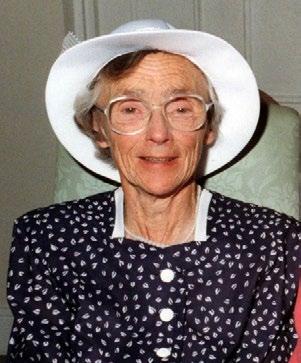
was born on 15 October 1923 to John and Marjorie Brittain in Wantage, Oxfordshire. Joyce was very close to both her parents throughout their lives and spent a great deal of time with them. Joyce’s upbringing and parents shaped Joyce’s character and defined her values.
Both Joyce’s mother and father were born in Leicestershire in Spring 1895. They went to the same school and, like John’s father before him, they both became teachers. Following serving as an army officer in France during much of the World War 1 John went to Cambridge and after his degree, he took up a Maths teaching role. In 1922 Marjorie and John were married, Joyce was born in 1923 and her sister Dorothy in 1924.
The values of the family were late Victorian, Methodist, traditional middle class. Service, duty, family and doing the right thing were at the core of what they believed. This was the background to Joyce’s upbringing. She lived very much in the way her parents lived.
Joyce and her sister Dorothy were very close as children, they both went to St Helen’s and St Catherine’s School in Abingdon and Joyce remained in contact with the school throughout her life. Joyce excelled at school and was talented enough to be offered a place at Exeter University in 1942 at a time when most school leavers were going into war work or, if old enough, the military.
At that time Exeter was a bombing target and Joyce had to undertake
fire watching duties. Despite this, she achieved a first-class honours degree in Maths, an achievement of which she was rightfully very proud. She was one of the few scholars, and even fewer female scholars, of her day to do so. The First-Class honours graduation ceremony was attended by then Princess Elizabeth.
role included graphing the flight curve of missiles from filmed images. At the time women were not allowed to see the actual missile flight, only the film. Unsurprisingly this was not for Joyce, and she went back to teaching, with a job at Redmaids’ Girls School in Bristol. She loved it there and only moved to Wycombe Abbey because she was told that to further her career in teaching, she should move.
Joyce went on to spend the rest of her career at Wycombe Abbey where she was Head of Maths. She loved Maths. She was a very wellrespected member of staff there and latterly a personal friend of the Headmistress Pat Lancaster. She worked till she was 65, which was five years longer than she needed to – she didn’t want to retire.
Above all, during Joyce’s long and remarkable life she was respected, loved and cherished. she will be much missed.
Opportunities for a female with a Maths degree were pretty limited in 1945 and Joyce started teaching with two teaching jobs in London before questioning if teaching was right for her. She moved to Bristol working for Bristol Aircraft Company. Part of her
Joyce was devoted to both the School and her pupils. She has had many letters and cards over the years from ex-pupils saying how grateful they were for having Joyce as a teacher and it was due to her that they came away with the Maths grades they needed.
Joyce moved to Alverstoke when she retired in 1989 and spent the next 32 years there. Her pastimes included completing A level Maths questions, art, embroidery, knitting, playing Scrabble against herself (as she didn’t
know anyone who was as good as she was), attending history of art classes and her garden. She spent time visiting a wide circle of friends and National Trust Properties around the country.
Joyce made the decision to move into the Alverstoke House Nursing Home in 2018 as she did not want be a bother to her family and friends.
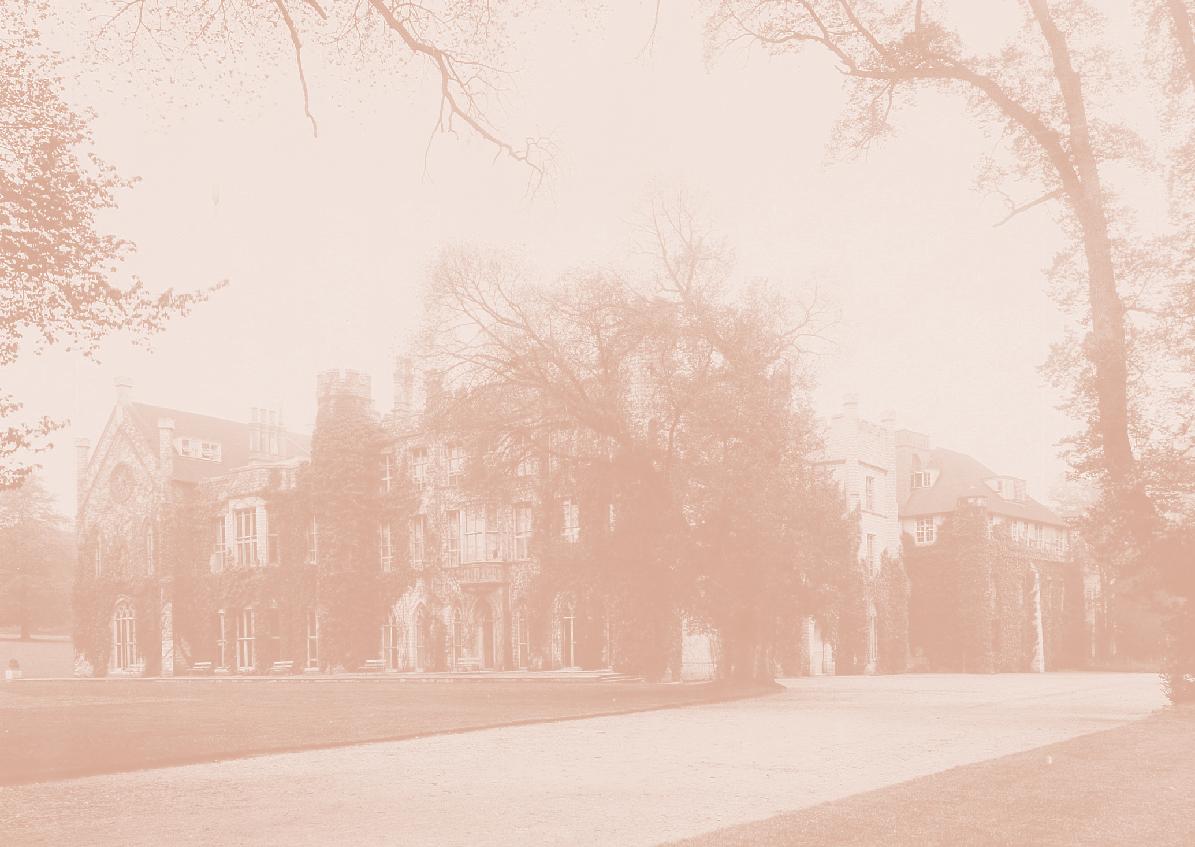
Joyce was independent, strong-willed and stubborn, she was also kind, generous, thoughtful and good company. Joyce was a unique lady, she would “say it as it was”.
Joyce had her humorous side, the story of the apple-pie bed and rather stuffy Mrs Parker plus daughter Maggie, who were evacuees from London living with the Brittains during World War II, always resulted in fits of giggles from Joyce, Dorothy and their mother.
During a birthday meal at a local pub when Joyce and Dorothy were in their mid 80’s both ordered fish. Everyone else around the table was far younger. When the waitress arrived she loudly announced “Who are the two trouts?” I had never seen Joyce laugh so much, as the table collapsed with laughter.
Despite her slight stature Joyce could move at some pace. There were many occasions even up to their mid 80s when on the compulsory Christmas Day afternoon walk Joyce and sister Dorothy would be striding out in front with the rest of the family left far behind.
Joyce excelled at skill or knowledgebased games and puzzles. The quality of her drawings when playing Pictionary with family was legendary and her side would normally win at any board games.
She did not have milk in tea and avoided gravy and porridge, as they didn’t taste the same as when her mother made them. An unfortunate incident with an over-ripe Stilton in her childhood meant she never touched cheese.
She loved wine, coffee, cake, chocolate and watching tennis, which she had played when younger. She loved to chat and was very interesting company.
Above all, during Joyce’s long and remarkable life she was respected, loved and cherished. She will be much missed.
She was a lovely, very individual lady of her time. Sadly I doubt we will see her kind again.
Anne d awson
(Biddy to her friends) had many fond memories of her time at Wycombe. her mother, n ancy Cameron, and her aunts, Fiona, e sme and Bridget, were all in Butler, so there were links before she arrived as one of the new pupils when the s chool restarted after the war. s he made good friends at Wycombe and kept up with several almost all of her life, including Auriol herring (Murray-Gourlay, C74) and Veronica Mellish (Bagot, C76).
Wycombe was also a time of relative stability in her early years. During the war she was evacuated to the US with her older brother, spending four years away from the rest of her family from age 8 to 12. When she left Wycombe in 1950 she spent her time helping run the farm in Kilmelford, south of Oban. In 1952 she married Patrick, an officer in the Highland Light Infantry. Auriol recalls the excitement of a highland wedding, with plenty of dancing! There followed a typical army life, with more moving of houses than Bridget might have liked, but she always set up home and garden wherever it had to be: Scotland, England, Germany, Canada. A son Alasdair and two daughters made the family, with Fiona (Graham, C126) and Elizabeth (Gibson, C142) following into Butler.
In 1980 Patrick had to take early retirement because of his Parkinsons’. They moved from Edinburgh back over to Kilmelford, where Bridget set to taming the walled garden and redecorating the large house virtually single-handed, while looking after her mother until her death, supporting Patrick, walking the dog, and playing an active part in church flower arranging and community plant stalls. She was always knitting and sewing too. Sadly, Patrick died in 1996. Bridget continued to support her family, now with seven grandchildren, especially her sons as they then lived in part of the house. Her sister, Kirstie (Barr, C82) lived a few miles away until she died in 2017.

In 2019 Bridget became more frail and spent the last two years living with Fiona in Banchory, and Liz in Mull. She and Fiona enjoyed the ‘virtual’ Carol Service in 2020, one benefit of Covid! It was wonderful to have her as part of our households, enjoying her easy company, wit and wisdom right to the end. The day before she died, she was knitting by head torch in front of the log fire, waiting for the storm and power cut to finish. Stoic and pragmatic, loyal, and with a sense of humour – what an example, and certainly partly instilled during her time at Wycombe.
Fiona Graham (Oatts, C126) Daughter
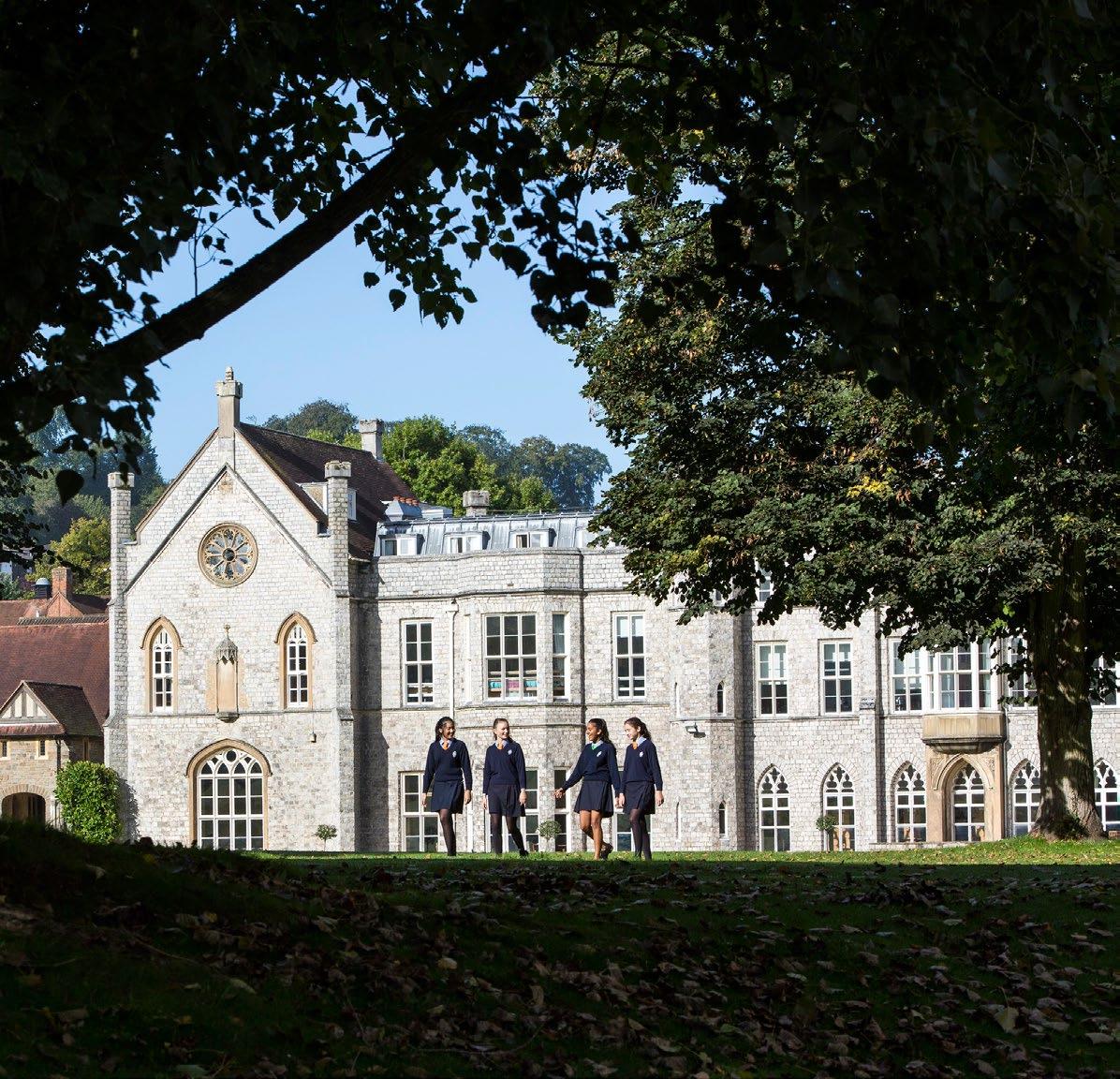
Georgina is offering online hypnotherapy services to take place wherever the client feels most comfortable –cutting out any stressful waits and unnecessary travel time. Georgina works with clients of all walks of life to help them reframe any debilitating behaviours or thoughts in a more effective way than traditional talking therapy.

Hypnotherapy is a proven technique, backed by the NHS, that helps the body relax. Through different techniques specified to the particular issues, it can help the brain walk through the paths that it finds challenging to reshape and reconfigure future responses. She works with many differing issues ranging from anxiety, trauma and habit cessation to fears, phobias and pain management. She also helps pregnant and postpartum women to feel empowered and strengthened through childbirth or their vulnerable moments after birth.
Please do get in contact for a free 20-minute consultation so that I can answer any questions you may have at: hello@theonlinehypno.com Website: theonlinehypno.com Instagram: @theonlinehypno

eden & zoe is a clothing brand for women and children. Visit our online shop for beautiful clothes and accessories in classic yet modern designs.


Contact: Melissa Wang (C190) Website: www.edenandzoe.com Email: melissa@edenandzoe.com
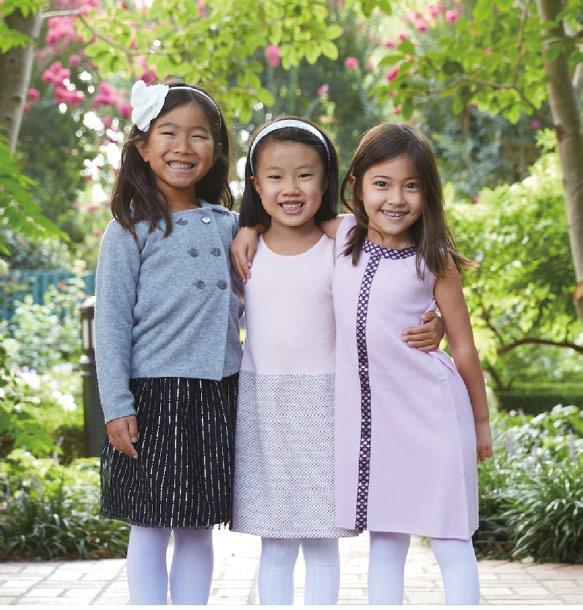

‘Le Barn’ is a beautiful house situated in St Martin de Belleville’s quaint satellite village of Béranger. It is located just 4km from the ski lifts giving you direct and speedy access to the vast Three Valleys ski area. This property sleeps eight guests and features four spacious bedrooms, three bathrooms, a large open plan living room, a modern kitchen/dining area and a laundry room. It is a great place for a family skiing holiday with easy access in a car to the local shops, cafés and restaurants in St Martin de Belleville. Stunning scenery for mountain walking and cycling in the summer too. Reasonable rates on request.
Clapton Manor is a Grade 2 listed 16thcentury Tudor manor house standing in a hilltop hamlet above Bourton-on-the-Water. We are surrounded by the rolling landscape of the Cotswold Hills, with views across the Windrush Valley. At night the skies are almost entirely dark and it is incredibly quiet.

We have two accommodation options, our B&B rooms or The Barn, a newly converted self-catered space for two.
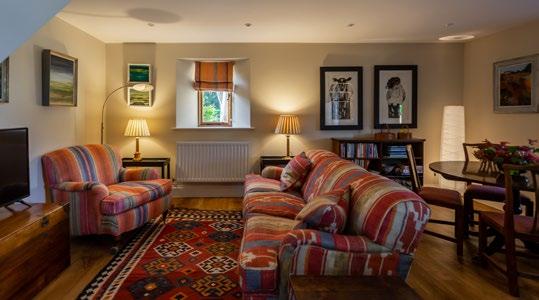
Contact: Karin Bolton (Beck-Andersen, Class of 1975, Campbell, C129) www.claptonmanor.co.uk
https://www.lebarn.co.uk or email info@lebarn.co.uk
hOlIdAy COttAGes Visit Caroline Gleave (Class of 1982, Wendover/Campbell, C150) Photograph by Free Spirit Alpine https://www.freespiritalpine.com hOlIdAy